
- University Statistics
- University Leadership
- Events & Venues
- University Strategic Plan
- Bethlehem & the Lehigh Valley
- Maps & Directions
- Diversity, Inclusion & Equity
- COVID-19 Information Center
- Undergraduate Studies
- Majors & Undergraduate Programs
- Graduate Studies
- Interdisciplinary Studies
- Entrepreneurship and Innovation
- Creative Inquiry
- Continuing Education
- Provost & Academic Affairs
- International
- University Catalog
- Summer Programs

Our Colleges:
- College of Arts and Sciences
- College of Business
- College of Education
- College of Health
- P.C. Rossin College of Engineering and Applied Science
- Research Centers & Institutes
- Student Research Experience
- Office of Research
- Graduate Education & Life

- Undergraduate Admissions
- Apply to Lehigh
- Visits & Tours
- Tuition, Aid & Affording College
- Admission Statistics
- Majors & Programs
- Academics at Lehigh
- Student Life at Lehigh
- Student Profiles
- Success After Graduation
- Lehigh Launch
- Contact Us & Admissions Counselors
Information for:
- Transfer Students
- International Students
- School Counselors
- Graduate Admissions
Student Life
- Clubs & Organizations
- Housing & Dining
- Student Health & Campus Safety
- Arts & Athletics
- Advocacy Centers
- Student Support & Transition to College
- Prospective Student Athletes
- Radio & TV Broadcasts
- Camps & Clinics
- Venues & Directions
- Campus Athletics
- GO Beyond: The Campaign for Future Makers
- Ways to Give
- Students, Faculty & Staff

Visits & Campus Tours
Visit us virtually or in-person and see if Lehigh’s beautiful campus and thriving community is the place for you to call home—for the next four years and beyond.
Opportunities to Visit
We offer many opportunities to learn more about life at Lehigh from students, admissions counselors and faculty. Wherever you are in the process—whether you’re just starting your search or ready to apply—here are a few of our recommendations:
- Attend an Information Session and Campus Tour ( On-campus or Virtually ): First you’ll want to hear from admissions counselors and current students to learn about academics, unique opportunities and student life at Lehigh. If you can't make it live, check out our on-demand Information Session and Campus Tour .
- Learn more at a College-Specific Session or Specialized Session : Next, look into the distinctive opportunities and curriculums within each of our colleges, and delve deeper into topics of interest. Check out our on-demand library of sessions if you can't make it live.
- Schedule an Interview or attend a Special Event : Finally, Lehigh interviews for rising seniors, and special events like Open Houses are a great way to connect and learn more.
On-Campus Visit Opportunities
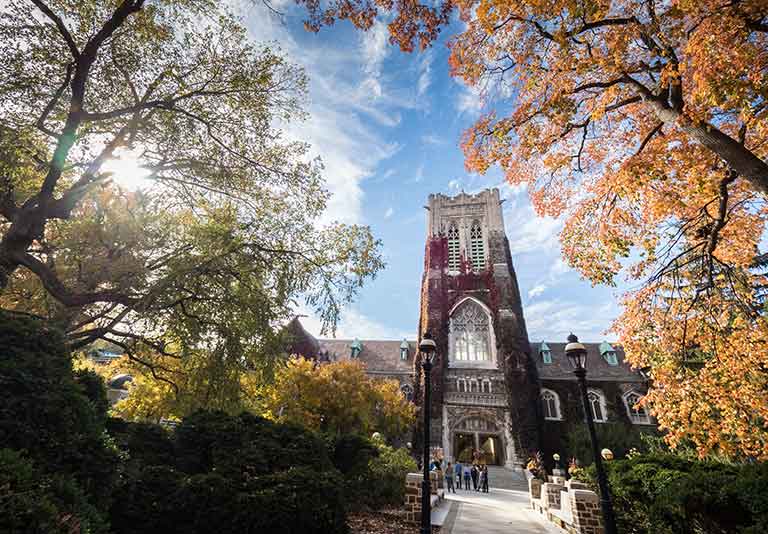
Visit our quintessential college campus and learn more about life at Lehigh directly from our admissions counselors and student tour guides.
As you are registering, please carefully review the On-Campus Admissions Events Calendar and the specific description for each event for important details. Most events consist of a group information session and a student-guided campus tour in order to provide well-rounded information from both admissions counselors and current students. However, you are welcome to attend just one of the two components—simply register for an event, inform us of your individual circumstances via email, and attend as you can. There are also times in the academic year where we are unable to offer student-guided campus tours and it will be clear in the description of those events that tours are not offered and that visitors are welcome to take a self-guided tour of campus on their own.
Staying in Bethlehem? Find a hotel near Lehigh and make a plan to explore Bethlehem while you're on campus!
Information Sessions
In the Group Information Session, an Office of Admissions staff member will share stories about unique and exclusive academic and research experiences, our vibrant community, traditions, and life in PA’s third largest metro area. The supportive Lehigh family and strong career placement are also discussed. The session concludes with admissions and financial aid basics.
Financial Aid Sessions
Join us to learn more about the financial aid process at Lehigh, including deadlines, requirements, types of aid, merit aid vs need-based aid and the financial aid formula.
Campus Tours
Student guides share their perspective on residential life, dining on campus and in Bethlehem, extra-curricular activities, course workload, relationships with professors, and student support services while highlighting important facilities across campus.
Interviews are available to rising high school seniors who wish to ask specific questions about Lehigh or provide additional context for their application. On-campus interviews may take place with an admissions counselor or a current student who is part of our Admissions Fellows program. Depending on where you are in your application process, you can also request a virtual interview with an alumnus (details available in the Virtual Interview section ). Lehigh interviews are evaluative, but not required as part of the application process. An interview can be a useful tool for Lehigh prospective applicants to share more of their story and learn more about the institution. Interviews last approximately 30 minutes. Students can only interview with Lehigh once.
General Interviews
General interviews are available during the fall semester on campus to rising seniors who are considering applying, or have already submitted an application, to Lehigh. They are typically conducted by a current student who is a member of our Admissions Fellows program, or one of our admissions counselors. This is the most widely available interview option. Students can only interview with Lehigh once.
Alumni Interviews
Alumni interviews are available to current seniors who have already submitted their application and have not yet completed an interview with Lehigh in any capacity. Learn more >
Large Group Visits
Thank you for your interest in sharing Lehigh University with your students! Please see below for additional information about the group visit experience at Lehigh.
Scheduling Your Visit
- Programming for groups 15 - 35 visitors (including chaperones) is offered on select weekdays and is available to Community-Based Organizations and schools with students enrolled in 9th-12th grade. For the spring semester, we prioritize groups containing 9th - 11th grade students.
- During the spring semester, group visits will include a tour of our Asa Packer Campus as well as a Q + A with one of our admissions team members.
- Our Asa Packer Campus tour is approximately 60 minutes in duration and includes moderate hills and steps.
- Please submit a group visit request on our calendar .
- Please note that selecting one of our time slots is not an approval of your request, and you should only request one visit date and time.
- We will respond to your request within 5 business days of its submission.
Visit Us Virtually or On Your Own
- If our calendar of events does not meet the needs of your group, we would still love to welcome you to explore our campus through a self-guided tour or to visit us virtually .
- Groups smaller than 15 students, or students interested in visiting our campus independently, are encouraged to register for an in-person information session on our Admissions Calendar .
Dining Information
- Interested in dining while visiting Lehigh? You can choose to explore local Bethlehem eateries .
Parking Information
- Address: Alumni Memorial Building: 27 Memorial Drive West, Bethlehem, PA 18015
- If you are traveling by bus: Please have your driver take your bus into the circle directly in front of the Alumni Memorial Building - you will recognize it by the large fountain/water feature in the middle of the circle. This area can be used for dropping off and picking up your students.
- Due to campus parking regulations, buses cannot wait on the Asa Packer Campus. We recommend parking your bus at our Goodman Campus during the visit. View directions to Goodman Campus >
COVID-19 Guidelines for Visiting Campus
All visitors to campus agree to adhere to the University’s safety policies and protocols. Failure to do so will result in an immediate request to leave the campus. Please review the information shared below about the expectations and policies in place for visitors prior to registering for an event or visiting campus.
All visitors to campus should adhere to the following safety protocols:
- they have tested positive for COVID-19
- are experiencing COVID-19 symptoms
- they have come in close contact with a person who has symptoms of or has tested positive for COVID-19 within the past 14 days
- Masks are optional indoors and outdoors on Lehigh campuses, with the exception of the Health and Wellness Center and in specific contexts where masking is required by event organizers or instructors. In these situations signage and/or other means will be used to communicate this requirement. Each member of your party should have a mask on hand at all times and must abide by the mask requirements of a particular location, facility, or event if applicable, regardless of their vaccination status. Our office reserves the right to institute a masking requirement at our discretion and for any particular portion or the whole duration of the visit, without prior notification. Some visitors or members of our community will choose to voluntarily wear a mask for personal safety, medical or other reasons. We encourage visitors to support one another in those decisions.
- Visitors are welcome to enter most academic buildings and can dine in on-campus eateries on weekdays during the day.
Failure to follow these safety requirements will result in immediate request to leave campus.
Please find other Lehigh updates regarding COVID-19 >
- A limited number of free visitor parking spaces are available on a first-come-first-serve basis in the designated spaces on the lower levels of the Alumni Memorial Parking Garage, adjacent to the Alumni Memorial Building.
- Additional parking is available at the metered spaces on level 1 of the Alumni Memorial Parking Garage, on adjacent city side streets, and in public parking garages. Please note, some parking may require a fee or meter payment.
- In addition to the limited free visitor parking in the designated spaces on the lower levels of the Alumni Memorial Parking Garage, spaces on levels 2-6 of the garage are available, at a cost. If you park on levels 2-6, parking must be paid at the start of your visit. Parking rates are $1/hour plus a one time $.25 service fee per parking session. If you extend your time, there will be no additional service fee.
- Text LU11 to 25023. You will receive a link to enter your license plate number, amount of time you want to park and payment information. You will receive a text message 15 minutes before your time expires with a link to add more time. Alternatively, you can reopen the webpage where you originally paid to add more time as well.
- Scan the QR code on the signs located near the stairs and elevator in the garage or visit t2p.mobi/LU11 . Enter your license plate number, amount of time you want to park and payment information. If you would like to receive a text message 15 minutes before your time expires, you must create an account and add your phone number.
- Parking in any other area on campus will result in your vehicle being ticketed.
Office of Admissions Inclement Weather & Emergency Closing Policy
Lehigh University’s Office of Admissions strives to honor scheduled campus visits while keeping safety in mind. In the event that the University closes due to inclement weather or an emergency, all scheduled campus visits will also be canceled. Information regarding any changes to the University’s opening will be posted on the top of each page of Lehigh’s website. Students and families should check this page prior to traveling to Lehigh University if hazardous weather conditions are forecast.
Visiting students and their families are encouraged to exercise caution when determining whether to travel in inclement weather. Please use good judgment and put safety first when traveling and navigating campus. If a student or the University cancels an interview, information session, campus tour or other appointment due to inclement weather, it will not reflect negatively on the student’s application. We request that the student notifies the Office of Admissions of the reason for cancellation in a timely manner. The Office of Admissions cannot guarantee a rescheduled interview or other event if one is cancelled due to inclement weather or an emergency.
The three potential situations are outlined below:
- University Closed (Full Day): Information sessions, tours, interviews and other events are canceled.
- Delayed Opening: Information sessions, tours, and interviews scheduled during the delayed opening will be canceled. Once the University reopens, information sessions and tours will continue at their scheduled times. If a student is already on campus for a cancelled interview, we will attempt to reschedule the interview for a time later that day.
- Early Close: Information sessions, tours and interviews scheduled for a time after the University closes will be canceled. If a student is already on campus when the University closure announcement is made and their scheduled interview is canceled, we will work with the student to reschedule an in-person or online interview with the student for a later date but cannot guarantee that we will be able to find a mutually convenient time.
Virtual Visit Opportunities
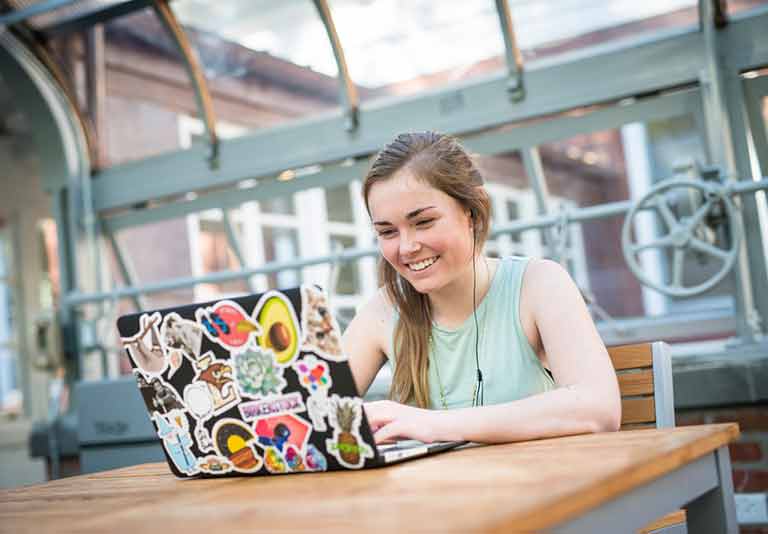
Join us virtually to discover more about Lehigh University! Sessions with admissions counselors, current students and faculty will help you learn more about Lehigh from wherever you are.
We encourage you to check out Hawktober , our virtual Open House that features sessions on various aspects of our Lehigh community throughout the entire month of October.
Virtual Information Sessions
We encourage you to attend a live session if available, but if you are unable to please feel free to watch this on-demand session .
Virtual Financial Aid Sessions
Virtual Campus Tour
Live Virtual Student-Guided Campus Tours
Join our current-student tour guides as they virtually take you across Lehigh's campus and share their experiences. Many topics and facilities that are particularly important to first-year students and their parents are included in the Live Virtual Student-Guided Tour, including residence life, dining, extra-curricular activities, course workload, relationships with professors, and student support services.
Virtual Tour
Our virtual tour is the next best thing to an in-person visit. You’ll follow the route of the undergraduate admissions tour to see academic and student life buildings while learning about life at Lehigh along the way.
YouTube and Instagram Live Tours
Follow our tour guides as they show you around campus on YouTube. You can watch the whole playlist or skip ahead to buildings you’re particularly interested in.
View a live-streamed tour from Instagram featuring our current student tour guides. Follow us on Instagram for more live-streamed events, Instagram Story Q&As and more.
Virtual Interviews
Interviews are available in the summer to rising high school seniors who wish to ask specific questions about Lehigh or provide additional context for their application. Interviews may take place with an admissions counselor, a current student who is part of our Admissions Fellows program, or an alumnus depending on where you are in your application process. Lehigh interviews are evaluative, but not required as part of the application process. All virtual interviews will be held via Zoom. An interview can be a useful tool for Lehigh prospective applicants to share more of their story and learn more about the institution. Interviews last approximately 30 minutes. Students can only interview with Lehigh once.
General interviews are available during the summer virtually to rising seniors who are considering applying, or have already submitted an application, to Lehigh. They are typically conducted by a current student who is a member of our Admissions Fellows program, or one of our admissions counselors. This is the most widely available interview option. Students can only interview with Lehigh once.
Alumni interviews are available to current seniors who have already submitted their application and have not yet completed an interview with Lehigh in any capacity. Applicants will have the opportunity to determine how they would like to be matched up with alumni interviewers based on a variety of factors such as geographic location, identity group or future career. Once a student has submitted their application and created their applicant portal, they will find the registration link in the bottom right hand side of the main portal page. The opportunity for an applicant to request an alumni interview is only available until the first week of January.
Virtual Student Panels
In these student panels, four to five current Lehigh students will share their stories about life on campus and answer questions from prospective students and families. Join us to learn more about Lehigh directly from our students, and bring your questions for the Q&A segment. All student panelists will be Lehigh juniors and seniors.
Advanced registration is required, no less than 24 hours before the event, and we will email a Zoom link for the event the day of or the evening prior.
Recording of Virtual International Student Panel
In this undergraduate student panel, current Lehigh international students shared their stories about life on campus, and answered questions from prospective students and families. View to learn more about life as an international undergraduate student at Lehigh from students and staff members from the Office of Admissions and the Office of International Students and Scholars.
View on-demand session >
Virtual Large Group Visits
Virtual programming for groups of 15 or more is offered on select weekdays and is available to Community-Based Organizations and schools with students enrolled in 9th-12th grade. Groups should make arrangements by completing the online registration form at least three weeks prior to their desired date for the virtual programming. Completion of this form is not a guarantee that we will be able to accommodate your group for a virtual event.
Our aim is to provide the best event experience to any student or group. On days when we anticipate a high volume of events or when our students are on break, we are unable to confirm any large group visits as we do not want to provide an experience that is less than our best. Please reach out if you have questions about dates our office may not be open.
Specialized Sessions & Events
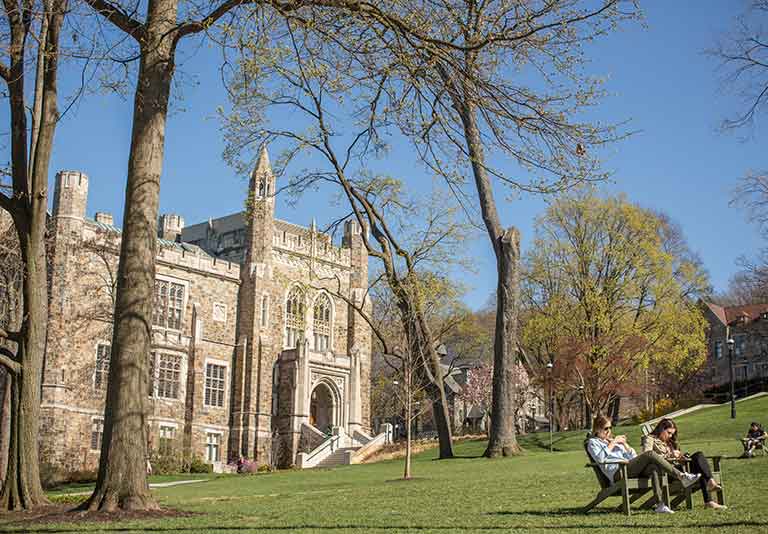
Join us for sessions that take a deep dive into topics like our colleges, special programs, student life opportunities and more.
Special Events
Special events include Open House, our Diversity Achievers Program and more.
Spotlight Sessions
Spotlight Sessions are unique events that each highlight a specific topic like the application process, academic experience, campus life and more. View upcoming sessions >
College-Specific Sessions
We offer several college- and program-specific virtual information sessions that delve deeper into areas of study. It is recommended, if possible, that students attend a general Virtual or On-Campus Admissions Information Session for an introduction to Lehigh prior to attending a college and program-specific information session. If you are unable to attend a Virtual or On-Campus Admissions Information Session, you are still welcome to register for a college or program-specific information session.
Learn more about college- and program-specific sessions >
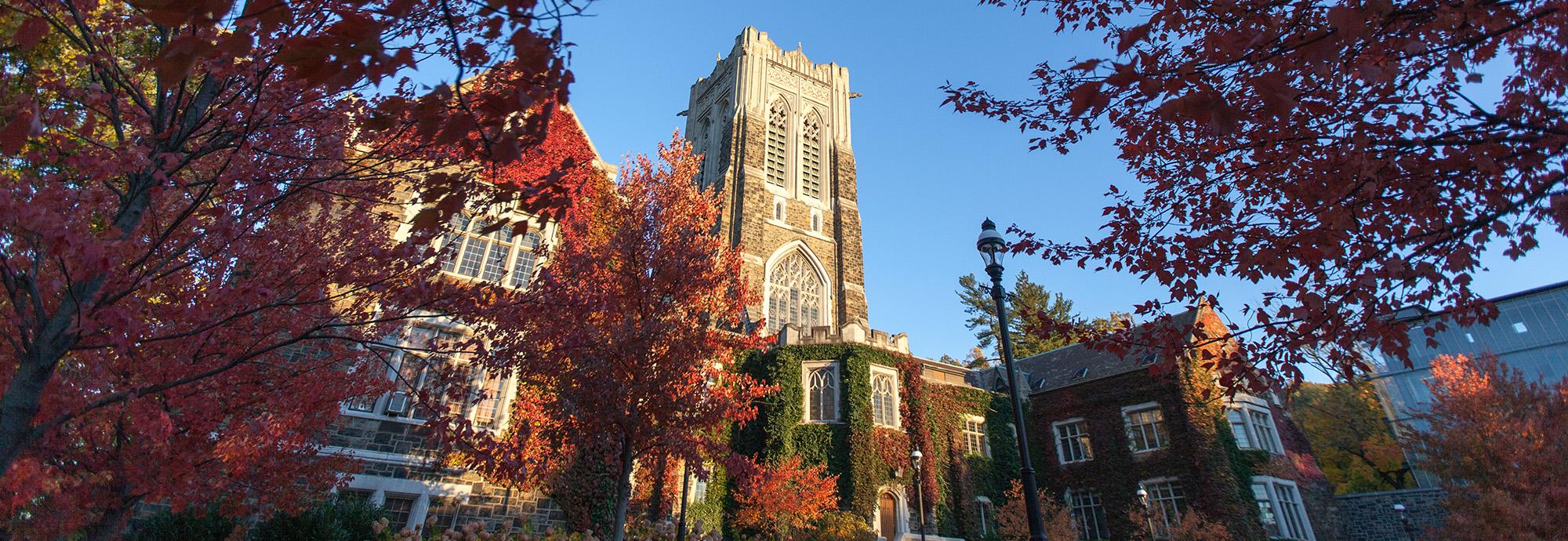
Class of 2028
Welcome to the lehigh family.
Find out if Lehigh is the right fit for you by exploring our campus and community, in-person and virtually. Between our Lehigh Fest (our on-campus Admitted Student Day), on-campus sessions and tours and a variety of specialized virtual sessions, there are many ways to engage and learn more.
Upcoming Special Visit Opportunities
Description
Students in the College of Arts and Sciences (CAS) often comment that international opportunities, research with faculty, and hands-on learning experiences outside the classroom are the best parts of their Lehigh experience. Please join a group of CAS students and faculty in a panel discussion as they talk about the unique learning experiences they've engaged in. This event will offer a college overview and an opportunity to ask questions to CAS faculty and students.
During these sessions, Lehigh Business will be sharing an overview of the business curriculum, as well as hosting a panel discussion with faculty, career services, and business students. Come discover what makes the Lehigh program unique and hear the panel's perspectives on 'Why Lehigh?
Lehigh opened the Business Innovation Building in 2023. Learn about how the upgraded Bosland Financial Services Laboratory, new Ventures Lab business accelerator, and expanded Rauch Center for Business Communication support our commitment to experiential learning.
On-Demand Events
Join admissions counselors to learn more about academics and student life, while hearing how Lehigh is built for tomorrow and prepares you for post-graduate success.
Please join us for a panel highlighting Lehigh University alumni from a variety of academic backgrounds and disciplines. They will share insight into their journeys following graduation, and highlight how their experiences at Lehigh aided in their current success.
Our Director of Admissions, Bruce Bunnick, wants to answer all questions you have about college admissions and what the process looks like here at Lehigh! This is a Q&A session, so please come with questions.
This Spotlight Session is a conversation with the Associate Deans from each of our four undergraduate colleges moderated by our Director of Admissions, Bruce Bunnick. For this session, the Associate Deans engage in discussions around the academic experiences on campus and answer questions from prospective students and parents.
Lehigh’s Virtual Spotlight Sessions are unique events that highlight a specific topic like the application process, academic experience, campus life, and more. This Athletic Recruitment Virtual Spotlight Session is on athletic recruitment. Hear from our athletics liaisons as they share important information about the athletic recruitment process.
Learn about the holistic application process at Lehigh.
Did you know that at Lehigh you can get the best of both coasts? Join us to learn more about Lehigh's Western Regional Office and Lehigh@NasdaqCenter located in our west coast home of San Francisco. Here students can engage in immersive experiences, internships, job placement and more!
Join current-student tour guides on a tour across campus, learning more about academic and student life spaces.
Join the Center for Career and Professional Development to learn more about internships, corporate relationships and alumni networking connections for Lehigh undergraduates. Hear how the CCPD is supporting students in our current virtual world.
Join the Center for Career and Professional Development (CCPD) to learn more about internships, co-ops, alumni networking connections for Lehigh undergraduates and support for students who want to pursue pre-professional careers. Hear how the CCPD supports students in developing skills, gaining experience and building the connections for life-long career development.
Learn about Impact Fellowship programs, a Office of Creative Inquiry program that provides hands-on experience working on large-scale, impact-focused projects locally and/or globally, throughout the academic year and in the summer. Students who have gone through the IF programs will talk about their project work and how they made an impact in the world.
Learn about the Mountaintop Summer Experience and the Data for Impact Summer Institute. Program directors will highlight how the programs work and how students get involved, and students who have participated in these programs will talk about their experiences and accomplishments.
Learn about Lehigh's efforts to diversify its undergraduate population and opportunities for students to to understand and recognize the value of diversity and inclusion, and discuss the university's commitment to an anti-racist campus community.
Lehigh is committed to providing support for all students from First+ to underrepresented backgrounds. In this session you will hear from our Affinity Centers—the Pride Center, Office of Multicultural Affairs, Center for Gender Equity, and Student Access and Success—to learn about the resources they provide.
In this Virtual Spotlight Session we will discuss what to look for when exploring engineering programs, finding the right fit, and how to apply to them.
The application process can be challenging, especially when you're the first person in your family to go through it. In this session, staff members discuss navigating the application process as a first generation college student.
This session will highlight the Global Citizenship Program at Lehigh, an interdisciplinary four-year cohort-based program in which students cultivate a committed mode of intervening in a world populated by others who we may not know but with whom we must co-create a viable future.
With eleven dining options, two food trucks, and even a smart market, there's something for everyone when it comes to food on campus. The same can be said about our housing—your options range from traditional residence halls all the way through to themed housing and suite- and apartment- style living. Join staff members from our Dining Services, Residential Services and Housing offices to learn more about Dining and Housing at Lehigh University.
Lehigh’s Virtual Spotlight Sessions are unique events that highlight a specific topic like the application process, academic experience, campus life, and more. This Virtual Spotlight Session is on interviewing. In this session you will hear from one of our admissions counselors as they share information about the interview process.
Explore the Iacocca Institute's global leadership programs, including the Iacocca Global Village, a unique leadership experience with both an intensive summer residency and extended virtual community for students and young professionals from all over the world.
The Iacocca International Internship Program (IIIP) is a fully funded internship opportunity for Lehigh students to work or do research overseas during the summer. When COVID-19 impacted students’ ability to travel, IIIP pivoted to provide virtual internships for students. Join this session to learn more about global internship opportunities for students in 2021 and beyond.
Lehigh’s Virtual Spotlight Sessions are unique events that highlight a specific topic like the application process, academic experience, campus life, and more. This Virtual Spotlight Session is on International Admission. In this session you will hear from some of our international admissions counselors as they share tips on how to navigate the college admissions process as an international student.
Hear from international student alumni and learn about their experiences on campus, and their post-graduate success.
This Virtual Spotlight Session is on international financial aid. In this session you will hear from one of our admissions counselors as they share information about the process of applying for international financial aid.
Join us to learn about Lehigh Launch Semester, our first-semester experiential learning opportunity that takes place in Ecuador. Lehigh Launch is for students with intellectual curiosity and a global perspective. Learn about the classroom- and field-based learning in Quito, the Amazon, and the Galapagos Islands.
Join us to learn more about Lehigh Launch, our first-semester experiential learning opportunity in Lander, WY and Taos, NM. Hear from the program director, a National Outdoor Leadership School (NOLS) instructor, about the classroom- and field-based learning, as well as backpacking and canoeing expeditions. Current Lehigh Launch students will join to discuss the COVID-19-modified Lehigh program this year.
Learn about Lehigh Launch Semester, our first-semester study-away experiential learning opportunity that takes place in the American West, or Ecuador and the Galapagos. Lehigh Launch is for students with intellectual curiosity and leadership potential. Learn about the classroom- and field-based learning in Wyoming and New Mexico, and in Quito, Ecuador and the Galapagos Islands.
Hear from the Office of First-Year Experience (OFYE) and the Office of Registration & Academic Services (RAS) to learn about the support they provided to new transfer students at Lehigh. Stefanie Burke, the Director of First-Year Experience, will speak about support and resources to help students transition to campus. Learn about what happens over the summer before your arrival on campus, orientation, and the support you will receive throughout your first year at Lehigh. The Office of Registration & Academic Services (RAS) plays a key role in facilitating the academic experience of students. Alison Valish from RAS will cover topics like course registration and transfer credits.
Lehigh’s Application Launch Sessions are a series of workshops designed to prepare students to apply for college admission. These workshops will each focus on a specific area of the application and its review process.
Most applications have one main essay and some institutions will require or have optional supplemental essays. This session will cover ways that essays are reviewed and provide tips on writing your essay.
This session will provide an overview of the sections of the application and discuss how to best represent your activities on your application.
This session will provide an overview of holistic admissions and how that process is applied when reviewing applications. It will go into more detail on ways that institutions identify academic and social fit through a holistic process.
This session will discuss how the transcript and letters of recommendation are reviewed as part of the holistic process. It will also provide tips on choosing recommenders.
This Spotlight Session features the Office of Admissions and F1RST (First-Generation Initiative Represented by Students and Teachers). Hear from a student panel of first generation students at Lehigh, followed by first generation trivia.
In this session we will share tips on how to prepare for Admissions Interviews.
In this session, we will share tips and insight on how to go through the application process as a first generation college student.
Hear from our Interim Director of the Pride Center for Sexual Orientation and Gender Diversity, Scott Burden, as he shares resources and tips to use for as you search to find the best college fit for you.
As soon as you commit to Lehigh, 85,000 alumni around the world become part of your community. What does that mean for you? What makes Lehigh's network unique? How can you take advantage of it as a student? How can you benefit from it right after graduation, and then 5, 10, 70 years later?
This Spotlight Session is about the Pre-Health track at Lehigh. Hear from our Pre-Health advisor, Mary Ellen Raposa, about advising, resources, and support offered at Lehigh. In addition, hear from current Pre-Health students, who serve as Med Mentors, about their experiences.
Safety and security on Lehigh's campus will be addressed by Jason Shiffer, Chief of the Lehigh University Police Department, including ways that undergraduates play a key partnership role in the mission of the LUPD.
Is being involved in clubs and organizations something you know will absolutely be a part of your college experience? If yes, then Lehigh is the place for you as 93% of students are involved in at least one activity! Join members of Student Senate as they talk about student involvement at Lehigh, the different clubs and organizations we have, and the vast amount of university-wide programming that takes place. This is a Q&A session, so please come with questions. You will receive an invitation from Zoom with the link to access the event the day of or the evening prior.
This session will help students to appreciate the opportunities for personal growth through involvement in original research, both with the faculty and independently, and regardless of what subject areas interest them.
Our admissions counselor will share insight on what makes a great supplemental essay and other tips.
Join us to learn more about sustainability at Lehigh in a fun and interactive session. Hear from sustainability officer, Katharine Targett Gross and sustainability program manager, Audrey McSain, about Lehigh's 2030 Sustainability Plan, Climate Action Strategy, and how you can get involved in sustainability on campus. A panel of current Lehigh students will join us to discuss their sustainability story and what their involvement in campus sustainability has meant to them.
In this Live Virtual Spotlight Session you’ll learn more about how to write a college essay and to hear tips from one of our admissions counselors.
Transition and change can be both exciting and challenging. The Office of First-Year Experience provides support and resources for the academic and social transition of new students and their families. In this session, hear from the Director of First-Year Experience and learn about everything from Orientation to continued support at Lehigh during a critical transition from high school to college.
Have you ever wondered what it would be like to be an NGO Youth Representative at the United Nations, to explore your entrepreneurial side, to complete an internship abroad, or to spend a semester harnessing your leadership skills while exploring the world? These are just some of the many opportunities that make Lehigh unique. In this session you will learn more about our UN Partnership, Baker Institute, Iacocca International Internship and the first-semester Lehigh Launch Program.
Learn about Lehigh's relationship with the United Nations, including our NGO status, opportunities for undergrads to intern at the UN, and the chance to hear from global leaders.
This Live Virtual Spotlight Session is on Lehigh's Affinity Centers. In this session you will hear about Lehigh's Affinity Centers and have the opportunity to chat with current students involved in the Office of Multicultural Affairs, the Center for Gender Equity and Pride Center.
This Virtual Spotlight Session is on our Western Regional Office. Lehigh established the Western Regional Office (WRO) to extend opportunities for students, faculty and alumni through curricular and research partnerships with dynamic enterprises in key western cities. Join us to learn more about the WRO, Lehigh@Nasdaq Center partnership and the ways in which we educate, connect and inspire the next generation of global entrepreneurial leaders.
This Live Virtual Spotlight Session is featuring women in STEM. Join us to hear from a panel of female Lehigh alum who are all pursuing STEM related careers after their time in undergrad. Please come with questions!
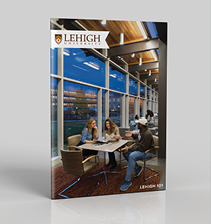
Admissions Materials
Get an overview of Lehigh as you explore digital versions of the same print brochures found in our lobby for in-person visitors.
Visits & Interviews
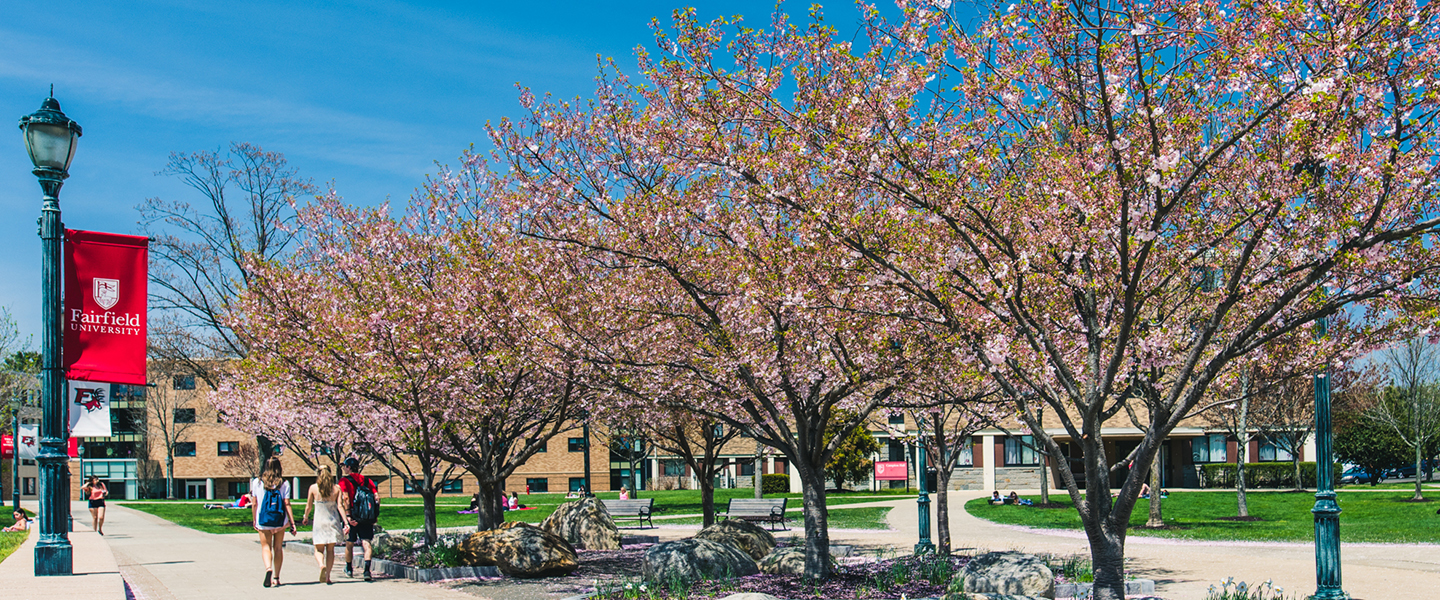
Visits and Interviews
On this page, tour our campus, schedule an interview, additional visit opportunities, plan your visit.
With quick access to most major interstates, airports, and train lines, Fairfield University is easy to visit. Come explore our beautiful campus and experience our close-knit community first-hand. We would love the opportunity to meet you in person and truly believe that visiting campus is the best way to get a sense of everything Fairfield has to offer.
Browse our in-person visit options or explore our virtual visit experiences to easily engage with our community and learn more about Fairfield from any location.
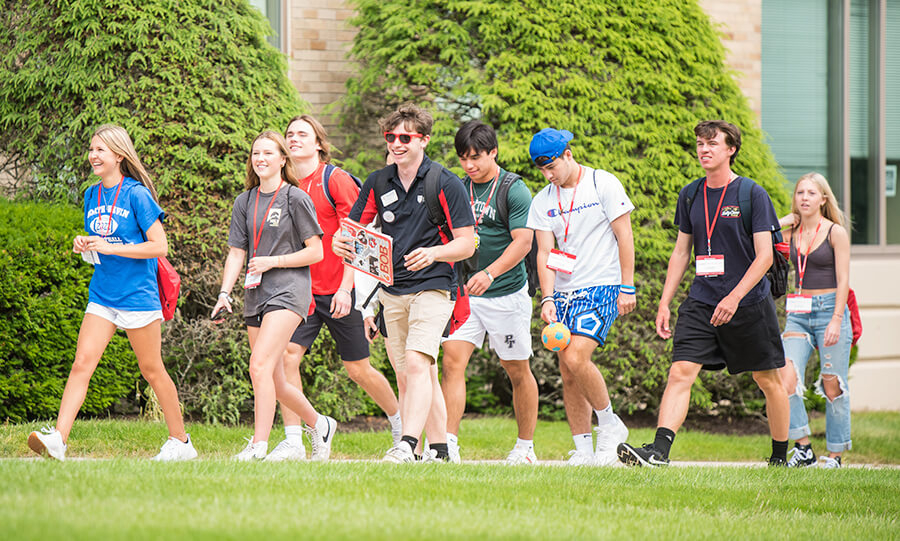
Campus Visits
Our Campus Visits , which include an information session followed by a tour, are offered Monday through Friday at 10:30 a.m. in the summer between Monday, June 3 and Friday, August 9, 2024 .
In the summer , our Campus Tour Only options are held Monday through Thursday at 9 a.m. and 1:30 p.m. and on Friday at 9 a.m.
If you select the tour only option, we hope you will also take the opportunity to view our virtual information session .
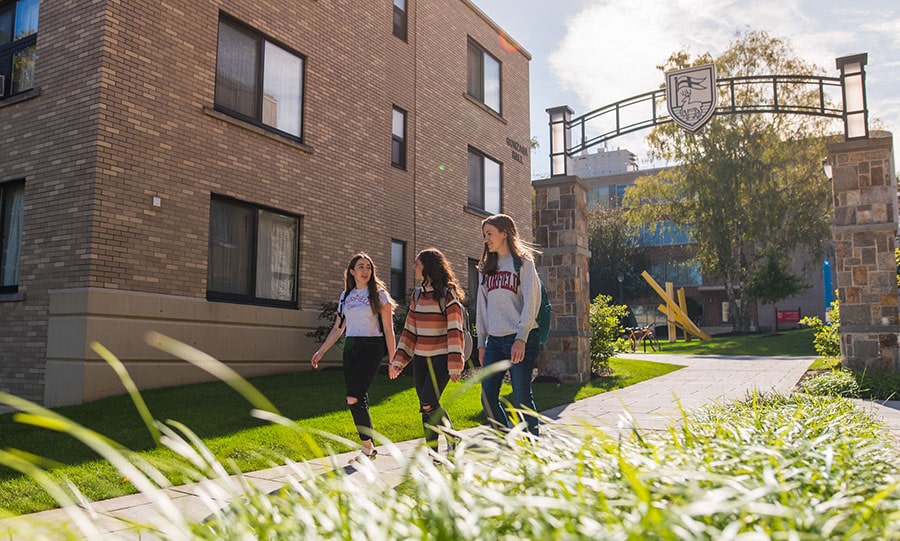
Admitted Student Campus Visits
Campus Visits tailored for admitted students are offered Monday and Friday at 1:30 p.m. and on select weekend dates at 11:15 a.m. in the spring. Our Campus Tour Only options are held at 11 a.m., 1 p.m., and 2 p.m. on Tuesday, Wednesday, and Thursday, and at 10 a.m. and 12 p.m. on select weekend dates.
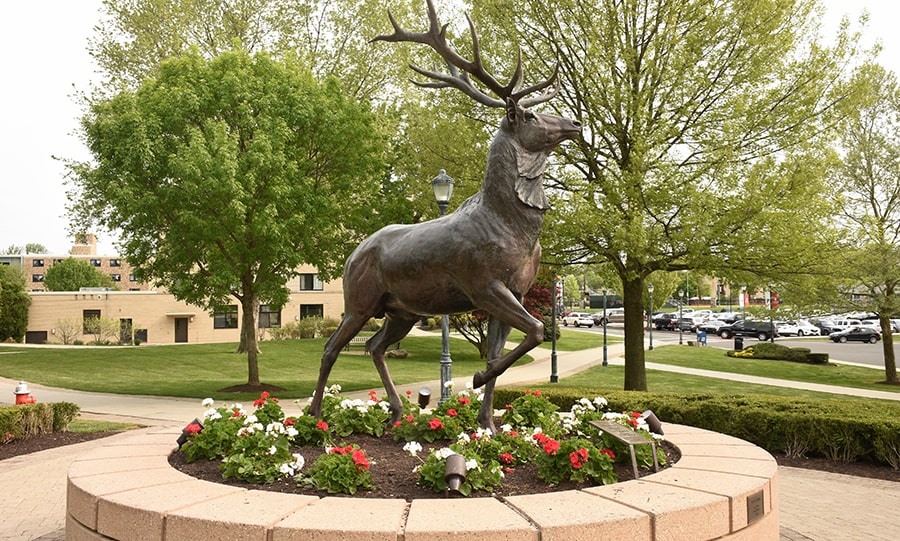
Self-Guided Campus Tours
Register for a self-guided tour of Fairfield’s campus. Maps with a suggested route and fun facts about each stop are located in the red mailboxes outside of the entrances to the Kelley Center.
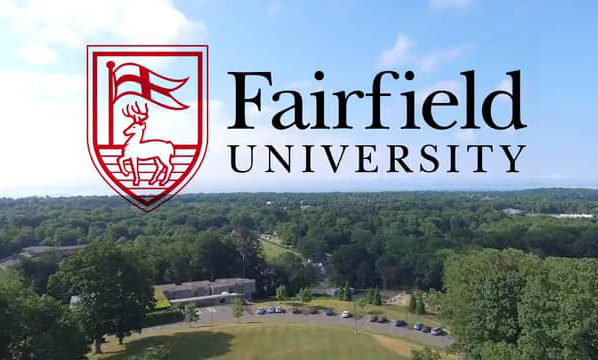
Fairfield University Tour Video
Join our Stags on a fast-paced tour of our state-of-the-art academic buildings, campus center, recreation complex, downtown Fairfield, and more.
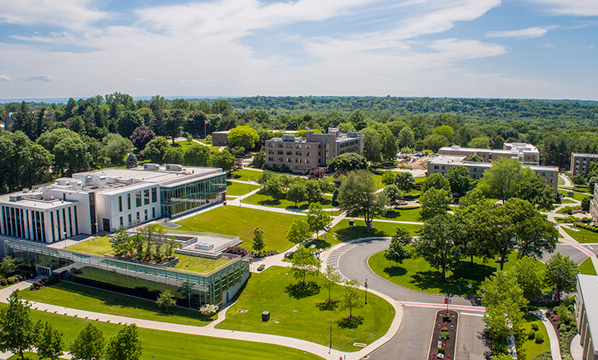
Virtual Tours
Explore Fairfield’s 200-acre campus and surrounding community with the click of a button. This immersive experience offers 360-degree views of our modern campus and provides useful information about Fairfield academics and student life.
An interview is one of the single best ways for an applicant to stand out during the admission process. While completely optional, they are a great way to demonstrate your interest and help us get to know you better as an applicant. Interviews are conducted by a member of the admission team.
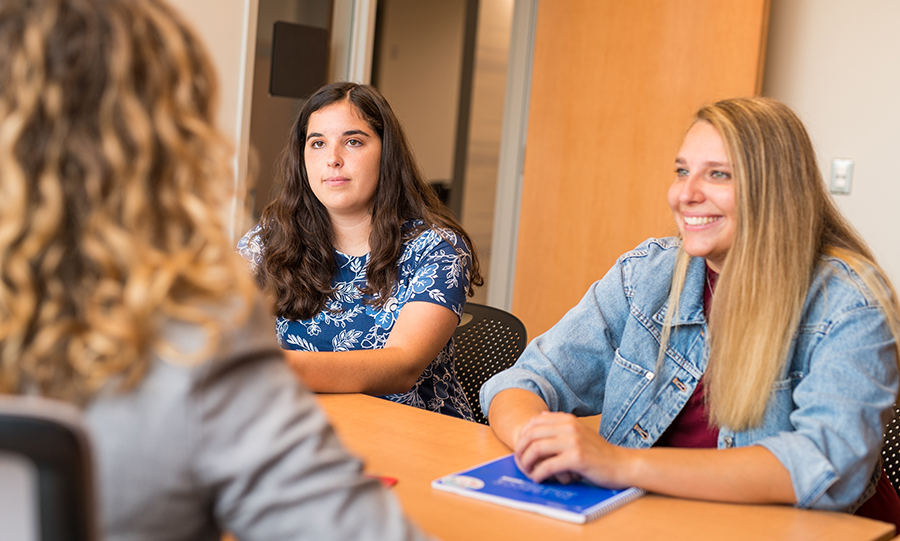
Schedule an In-Person Interview
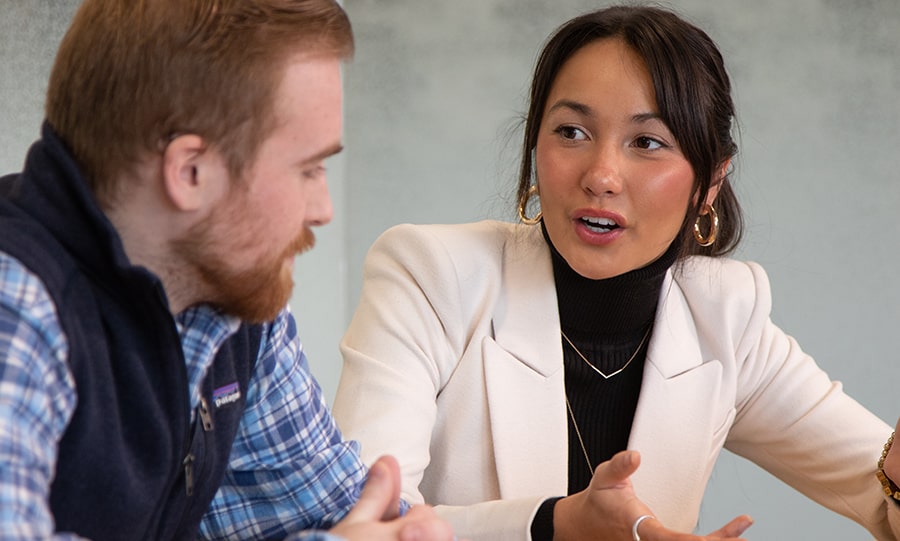
We think interviews are a great way for us to get to know you and for you to get to know us. Fairfield takes great pride in a holistic approach to admission, and interviews are an important way to demonstrate your interest in the University. Prospective students who will be graduating from high school in 2025 are encouraged to interview as soon as their schedule allows.
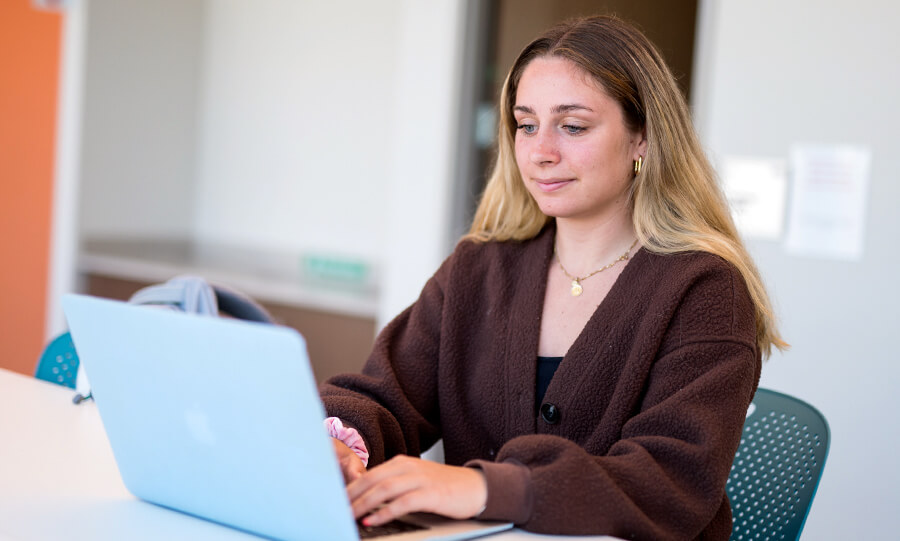
Schedule a Virtual Interview
We think interviews are a great way for us to get to know you and you to get to know us. Fairfield takes great pride in a holistic approach to admission, interviews are an important way to demonstrate your interest in the University. Prospective students who will be graduating from high school in 2025 are encouraged to interview as soon as their schedule allows.
The Office of Admission offers a variety of in-person and virtual information session to help prospective students and their families engage with our campus community and determine if Fairfield is the school for them. Choose from any of the options below and get to know our University and our school-specific programs on a more personal level.
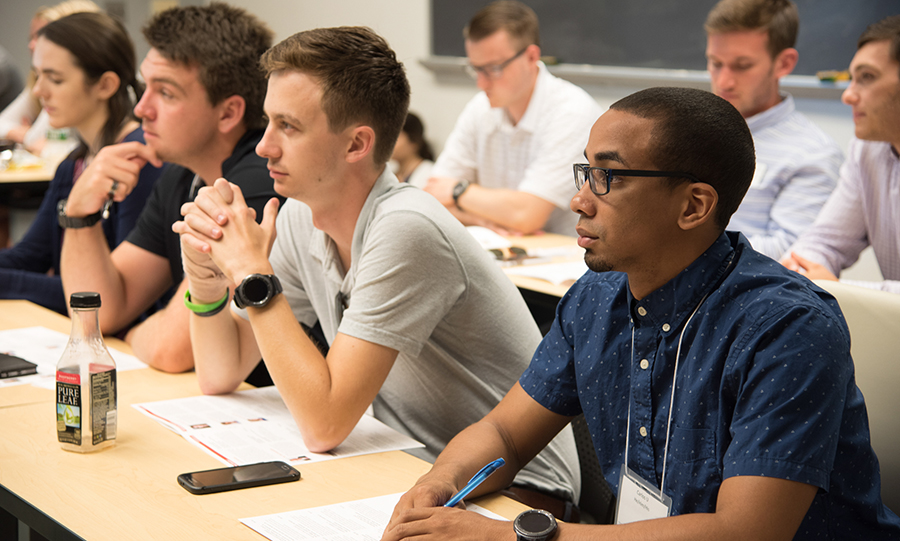
Prospective Student Virtual Information Session
We hope you will take the opportunity to view our virtual information session.
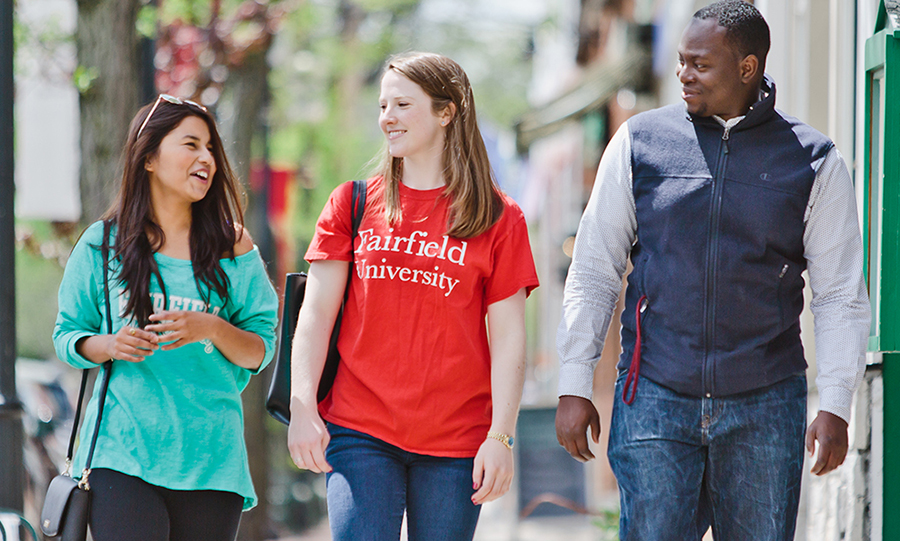
Multicultural Visit Program (MVP)
MVP celebrates the culture and diversity of our campus community through a series of virtual visit opportunities that connect prospective students with current students, faculty, and staff of color and/or unique backgrounds.
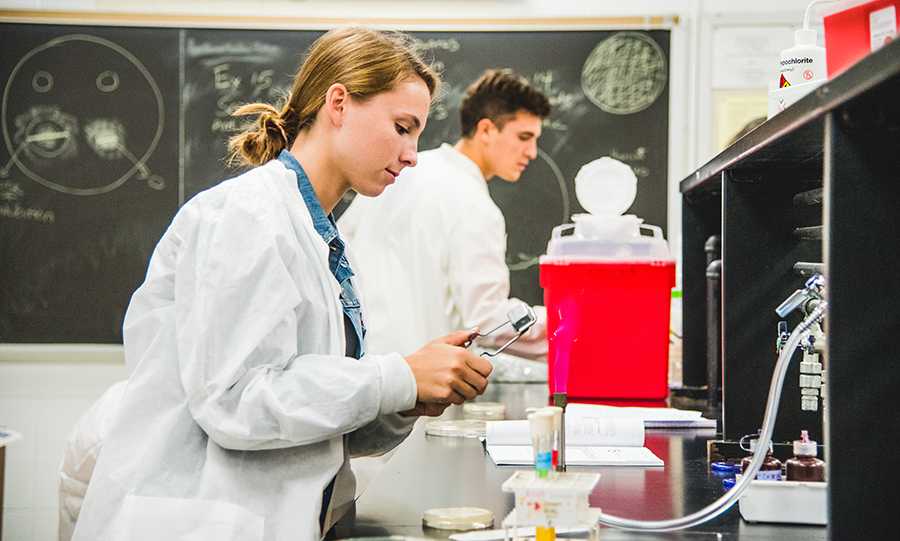
College of Arts & Sciences Information Session
Prospective students interested in studying the humanities, natural and behavioral sciences, or mathematics are invited to join the College of Arts and Sciences and the Office of Undergraduate Admission for a series of major-specific information sessions that will be held on select dates throughout the year.
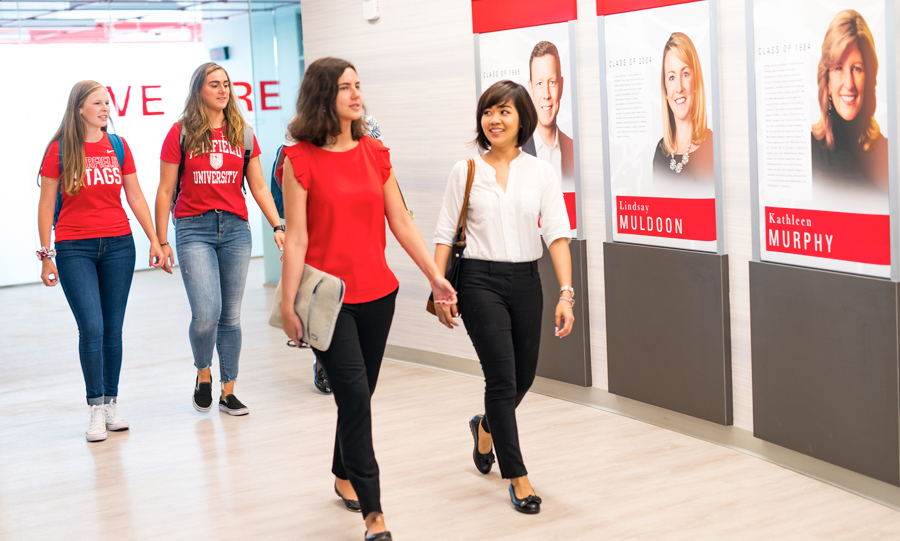
Dolan School of Business Information Session
Prospective students interested in studying business at Fairfield are invited to join the Dolan School of Business and the Office of Undergraduate Admission for a business-specific information session held on select dates throughout the year.
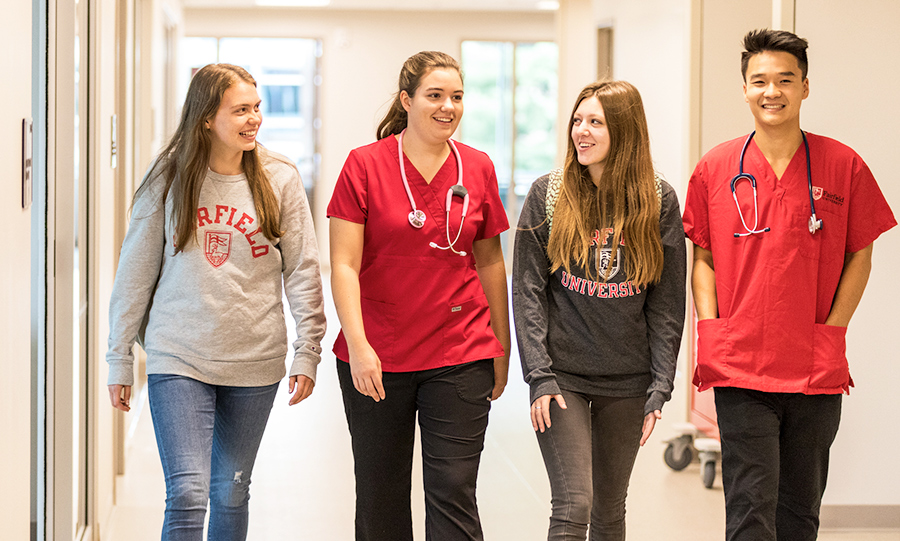
Egan School of Nursing & Health Studies Information Session
Prospective students interested in studying nursing, public health, or social work are invited to join the Egan School of Nursing and Health Studies and the Office of Undergraduate Admission for a nursing-specific information session held on select dates throughout the year .
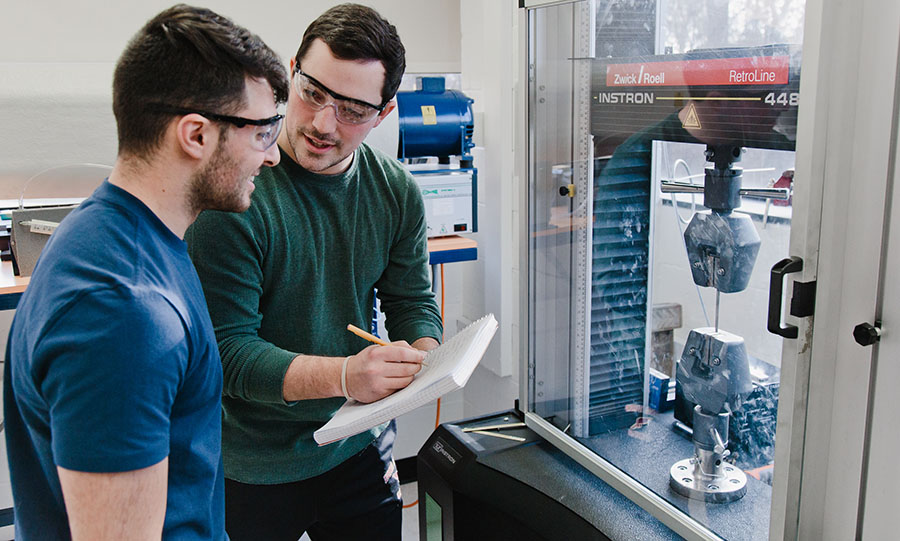
School of Engineering & Computing Information Session
Prospective students interested in studying engineering at Fairfield are invited to join the School of Engineering & Computing and the Office of Undergraduate Admission for an engineering-specific information session held on select dates throughout the year.
Campus Map & Directions
About the town, meet our counselors.
If you have any questions, please call the Office of Undergraduate Admission at (203) 254-4100 or send us an e-mail at [email protected] .
Search Results
- Skip to main menu
- Skip to user menu
The First-Round Interview Versus the Campus Visit
- Interviewing
Question: I am going on my first-ever campus interview soon, and I see that there is an “interview with the search committee” on the itinerary. But I already did an interview with all of the committee members over Skype. Will this next “interview with the search committee” be much different? Are they going to ask me the same questions? Will it be the same people?
That’s a logical question for a first-time candidate, as that sequence of events must seem redundant. But it really isn’t. Everyone knows that a campus interview is a coup that propels you into the next level of the academic-hiring game. A campus visit will involve many things that go well beyond the scope of those quickie, first-round interviews conducted long distance via technology or in person at a scholarly conference.
In a campus visit, you won’t have to deal with the technical problems of a Skype interview or face a screen full committee members who have positioned themselves like a cheerleading pyramid so they can all fit into the camera view. You also won’t have the awkwardness of a conference interview where you are seated in a large expo hall separated from the other 50 hopefuls by a thin translucent blue curtain that is supposed to create an illusion of privacy — or worse, in a hotel room where seating is so limited that either you or a member of the search committee has to sit on the bed.
The campus interview is a whole different stage of the game, and yet there is that seemingly redundant “interview with the search committee” on the itinerary. That is extremely common during campus visits, if not universal. No, the committee members haven’t forgotten that you already did this, and no, they won’t necessarily ask you the same questions — because the functions of the Skype/conference interview and the campus visit are very different.
A first-round interview is best thought of as a screening tool. It’s about ticking certain boxes. By this point, the search committee has already waded through hundreds of applications looking for candidates who meet certain things (those things will of course vary somewhat — depending on the type of institution and the needs of the department — but will generally comprise some of the following: well-written job documents, teaching experience in the requisite areas, research interests that fit departmental needs, and particular experience relevant to the job, like being able to run a lab.) The committee winnows down those many applicants to a “long shortlist” of 12 to 15 people for first-round interviews.
Those interviews are short (some may last as little as 15 minutes) and uniform (the questions tend to be extremely standardized and possibly approved by the institution’s HR department). A Skype or conference interview doesn’t really allow for in-depth substantive engagement between you and your potential colleagues. It exists to check another set of boxes:
- Can you speak engagingly and coherently about your research and plans for publication?
- Can you describe your teaching vision and a class you would like to teach without stumbling, meandering, or lapsing into grandiosity?
- Are you genuinely interested in the position — evidenced by things like your having done homework on the department and asked informed, strategic questions of the interviewers.
So even when the committee is done screening all of the applicants, it is still screening the smaller pool of candidates via the first-round interviews.
The campus visit is where the real interview happens. Your second “interview with the search committee” is the substantive one. It’s not a screening tool. Instead of 15 minutes, this time you will speak with the full committee for an hour or 90 minutes, and that meeting will be just one piece of a long agenda. The search committee already knows you tick all the boxes — that’s why it flew you out. The substance of the questions might overlap with what the committee members already asked you the first time around, but the context and depth will be different.
An important aside about something I’m often asked: If they do repeat a question, you can repeat an answer you gave in the initial interview. Because guess what? They don’t remember the specifics of what you said one or two months earlier. So feel free to discuss the same proposed course or research project that you mentioned before — just offer some additional elaboration.
Here are some things you might be asked during your second interview with the search committee:
- You have now had a chance to meet the other members of the department, and get to know our institution and our programmatic priorities a bit. How do you see your research fitting in with our trajectory? ( Translation: Do you “get” what we’re about, or will you want to march to the beat of your own drum?)
- Can you think of possible links or collaborations between your research and that of other faculty members here? ( Translation: Do you play well with others? Will you play well with us?)
- You have now had a chance to guest-teach our undergraduates (and/or have a Q&A session with our graduate students). In what ways do you think your teaching or mentorship can speak to them and their priorities? ( Translation: Are our students going to be happy with you? Are your teaching evaluations going to be good?)
- In your job talk you mentioned X as the next phase of your research. What resources would you need for that? Our campus is somewhat limited in A or B. Could your research be scaled in a way that we could support at this campus, and still be successful? ( Translation: Is your tenure case going to fall apart because we don’t have the budget to buy the expensive equipment you need?)
- Tell us about two courses you would develop for us. ( Translation: Yes, we know we asked this identical question at the preliminary interview. You can use the same two courses. but this time, can you give us specifics, ideally with prepared syllabi or course descriptions to hand out?)
In my book , my columns , and my blog posts , I stress the importance of the tailoring paragraph — the key paragraph of a cover letter where you explain why you are suited for a particular position. Think of the on-campus interview as the live-action version of the tailoring paragraph. Meaning: In commenting on your vision for your scholarship and pedagogy, you are expected to calibrate and tailor your answer in real time to what you have seen up to that moment on the campus visit.
So go through the visit with that in mind, and look for ways to make connections. For example:
- That new project a professor mentioned at lunch on telepathy in Fiordland penguins? Maybe it dovetails with a research strand you have recently become interested in on collective unconscious in Tasmanian emus. This is a perfect moment to say that you were very excited to hear about this professor’s research, as you see possibilities for productive overlaps with your own work.
- Those master’s students who took you on a campus tour and talked about how worried they were about finding jobs after they graduate? Maybe there was an internship program at your alma mater that you could envision replicating here.
- This is also the moment (especially at public institutions that primarily serve the surrounding population) where you might be asked, flat-out, whether you would be able to develop research projects that are locally based — both to strengthen town-gown relations and to provide students with nearby research opportunities. The answer to that questions is yes (if you want the job). Think about how you might be able to do such research in a way that would also be interesting and meaningful to you — it does not have to be your only project, but you have to be able to say something cogent about it on the spot, if required.
In sum, your campus interview with the search committee will be different from the first go-round. Expect to be screened against general criteria at the preliminary interview, and quizzed far more substantively in the context of the ecology of the campus you are visiting. Keep your eyes open for ways to show that you won’t just be a successful academic — you will also be a successful colleague to this specific group of people.
Karen Kelsky is founder and president of The Professor Is In , which offers advice and consulting services on the academic job search and on all aspects of the academic and postacademic career. She is a former tenured professor at two universities. Browse an archive of Kelsky’s previous advice columns here .
Share this article
Related articles

How to Manage the First-Round Executive Interview

The Job Season Without In-Person Interviews

How to Ace the Virtual Interview
Latest articles, visit chronicle advice for more higher ed news and advice, for would-be academics, now is the time to get serious about plan b.

- Parents & Guardians
- Faculty & Staff
BC.EDU LINKS

- Boston College
- Campus Life
- Jesuit, Catholic
- Academic Calendar
- BC Magazine
- Directories
- Offices, Services, Resources
- Agora Portal
- Maps & Directions
The people of Boston College are at the heart of the experience here, and students guide our campus visits. The core of our Eagle Eye Campus Visit is a candid conversation with current students—an opportunity to ask them about classes, housing, Boston, service learning, and more. And our virtual visit programs allow you to engage with our community from the comfort of your home.

Eagle Eye Campus Visit
These two-hour visits include an information session and student-led outdoor campus tour. The information session features authentic conversation with current students.
Register for a Campus Visit

Virtual Programs
We look forward to (virtually) connecting with you!
Register for a Virtual Program
Eagle for a Day (In-Person)
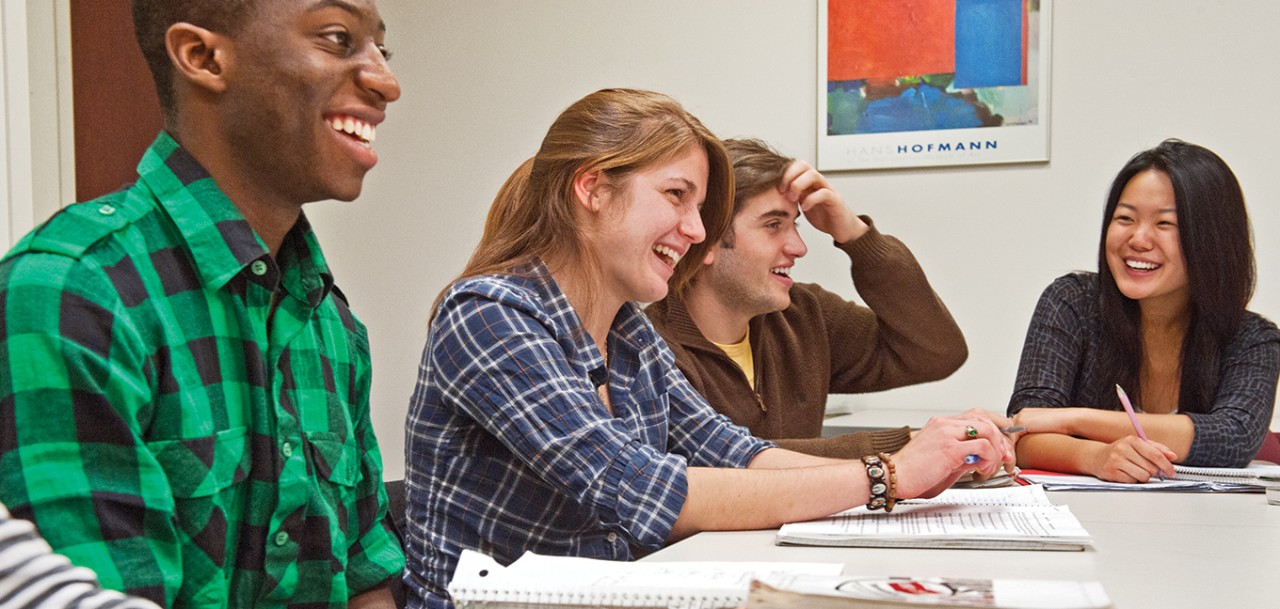
Looking for an opportunity for a personalized and in-depth view of Boston College? Look no further and consider our Eagle for a Day program. If you've been to campus and perhaps already attended an Eagle Eye Campus Visit, the Eagle for a Day visit is a wonderful opportunity to take a closer look at life at Boston College.
Learn More and Register
Hosted by members of our Student Admission Program (SAP), the Eagle for a Day experience is an opportunity to learn more about the typical day in the life of a Boston College student. These three-hour visits provide an opportunity to attend class, accompany your host to lunch and meet their friends, and gain an in-depth look into what happens on campus. Inquire about classes and professors, campus clubs and organizations, residential life, and more.
While geared towards rising seniors who may be narrowing down their college list, any prospective student interested in Boston College may register for an Eagle for a Day. We encourage you to prepare questions in advance.
Please note, the Eagle for a Day visit is not an evaluative interview for admission, but rather an opportunity for you to connect with a current BC student. Boston College does not offer interviews as part of the admission process.
Register for Eagle for a Day (In-Person)
Eagle for a Discussion (Virtual)
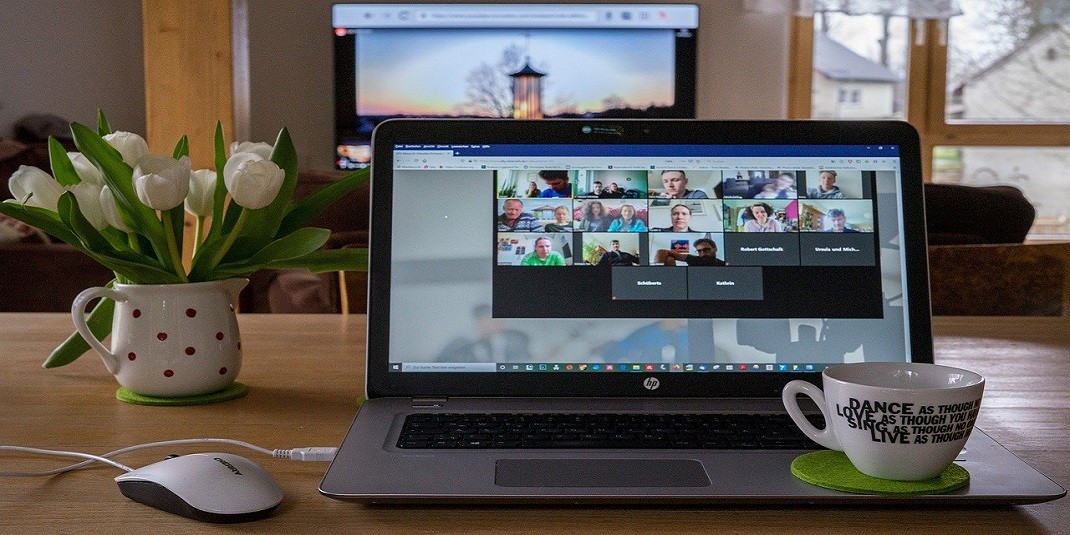
If you've already attended an Eagle Eye Campus Visit and would like to continue learning more about our campus community, consider registering for an Eagle for a Discussion. These 30-minute virtual chats will allow you to connect one-on-one with a current BC student.
Hosted by members of our Student Admission Program (SAP), these 30-minute one-on-one virtual discussions will allow you to ask the experts, our current students, specific questions about Boston College. Inquire about classes and professors, campus clubs and organizations, residential life, and more.
While geared toward rising seniors who may be narrowing down their college list, any prospective student interested in Boston College may register for this Discussion. We encourage you to prepare questions in advance.
Please note, these Discussions are not evaluative interviews for admission, but rather an opportunity for you to connect with a current BC student. Boston College does not offer interviews as part of the admission process.
Register for Eagle for a Discussion (Virtual)
Organization & High School Visits
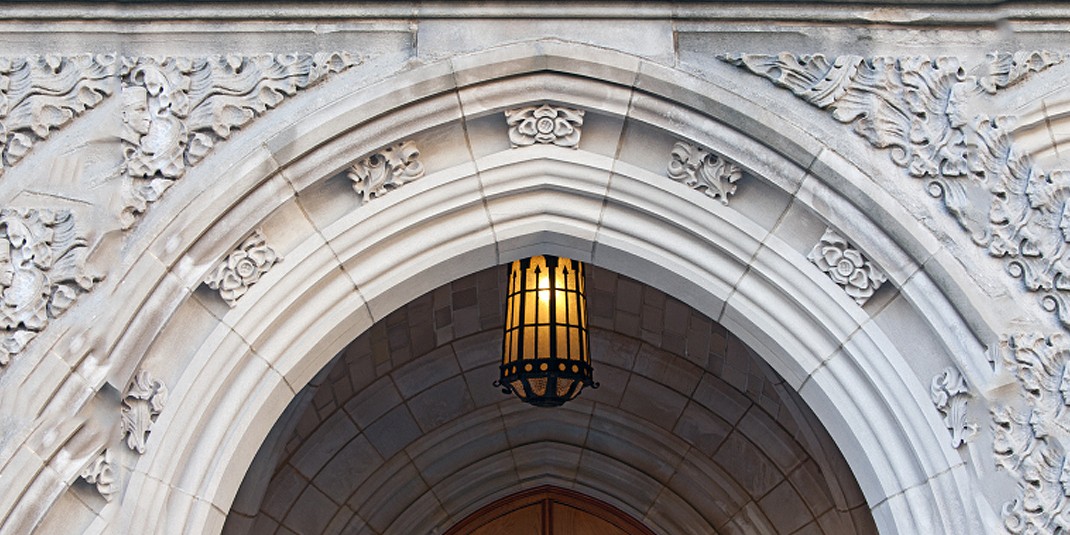
Groups of 10 or more members of college access/readiness organizations or college-bound high school students are welcome to join us for a 60-minute campus tour.
These two hour visits are offered for groups of 10 or more members of high school or college access/readiness organizations in their sophomore, junior, and senior years of high school. Included is an information session and tour. Attendees will be encouraged to ask questions.
Please register below and help us learn more about your group. All forms must be completed at least two weeks prior to your requested date. We will reply to your request within 10 business days.
Register for an Organization & High School Visit
Now Playing: Boston College Campus Tour
Learn about the buildings, history, and campus life on a student-led tour of Boston College.
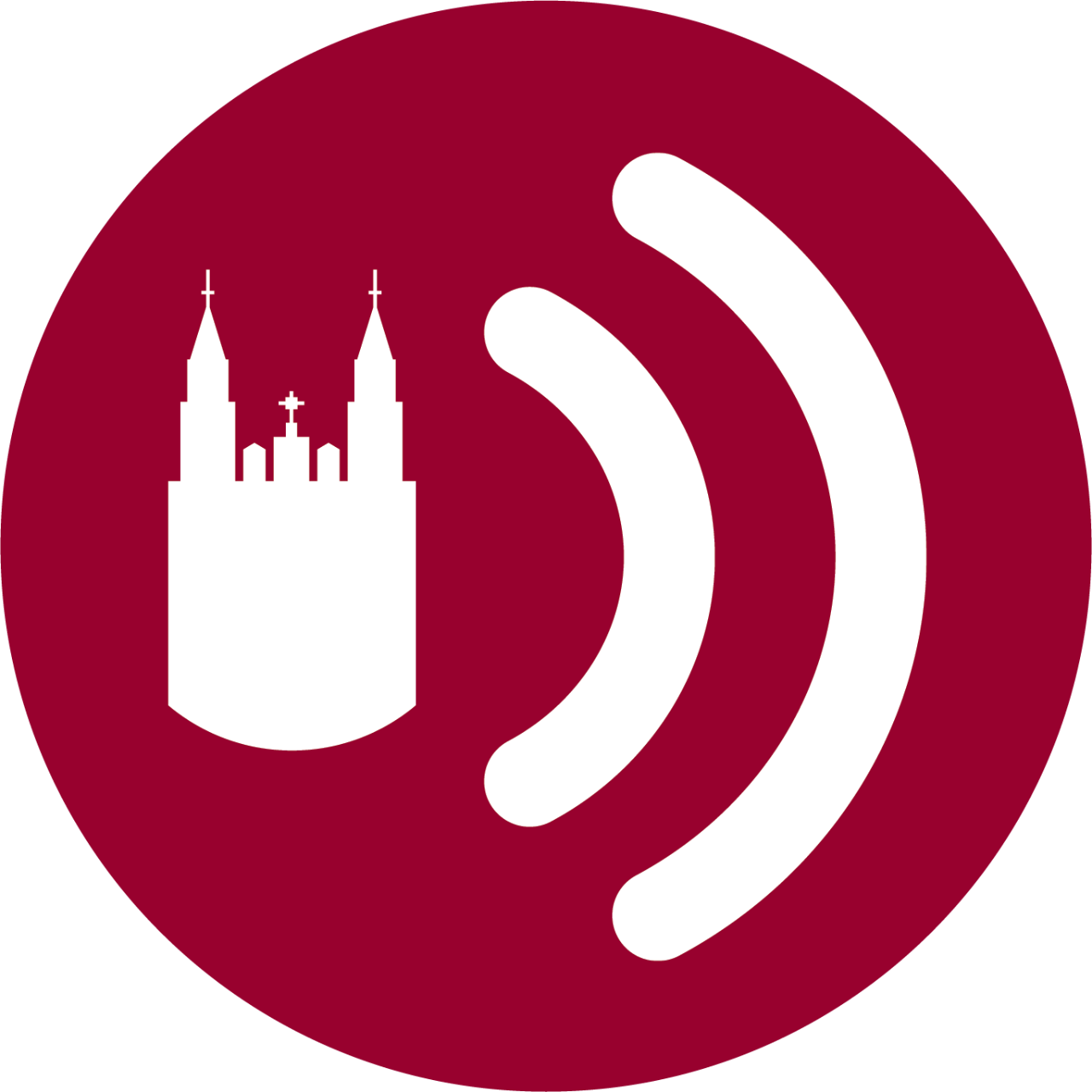
BC Campus Audio Tour
This audio tour of the Chestnut Hill Campus highlights our facilities, from state-of-the-art academic buildings to our iconic athletic stadium and other Boston College treasures.
Download the Audio Tour Guide
Meet the Student Admission Program Council
The members of the Student Admission Program (SAP) work to provide the best possible experience for prospective students and their families while visiting campus. SAP ensures your campus visit will help you learn about Boston College through authentic student perspectives. To learn more about members of SAP Council, feel free to take a few moments to meet them below.
- Filter Filter By Carroll CSON LSEHD MCAS
See Yourself at BC
Life on the heights.
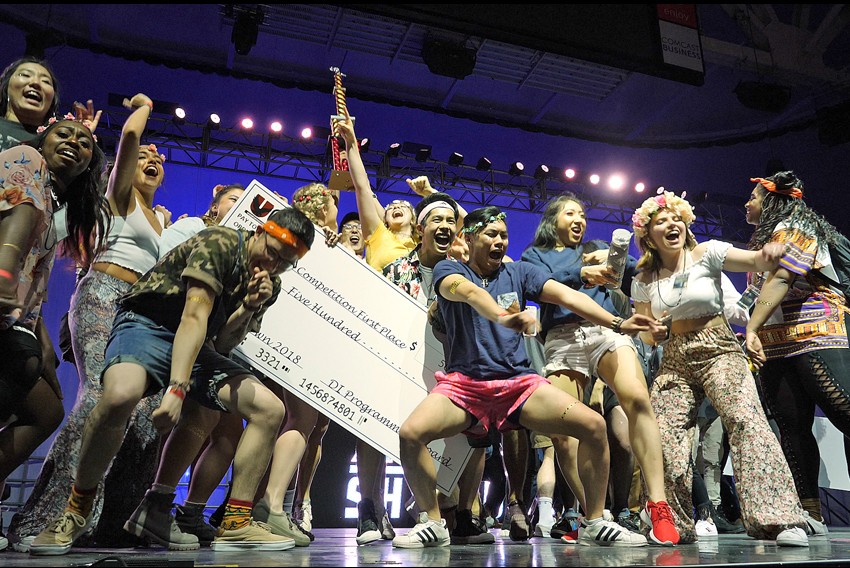
ALC Showdown
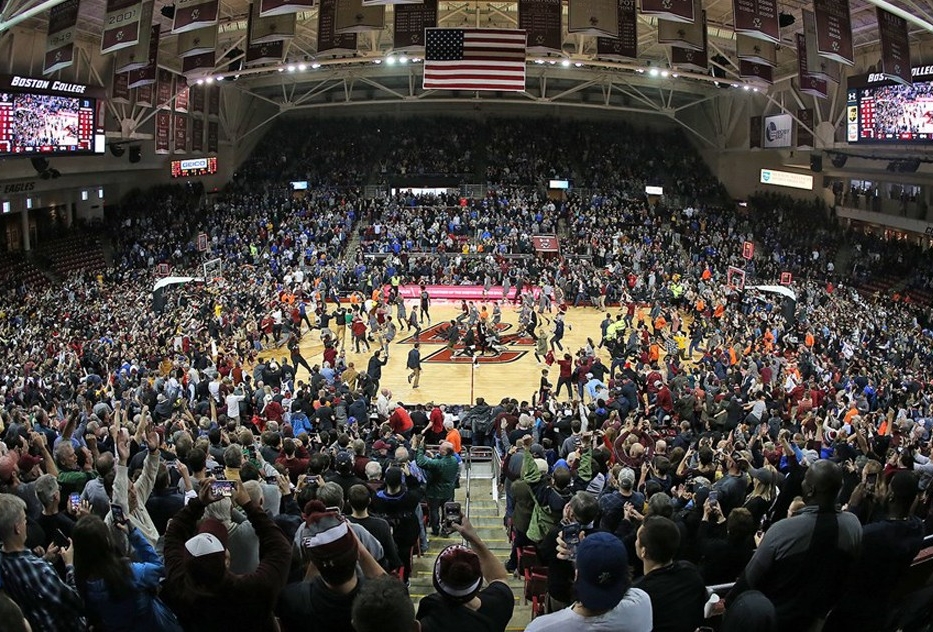
BC Eagles vs. Duke
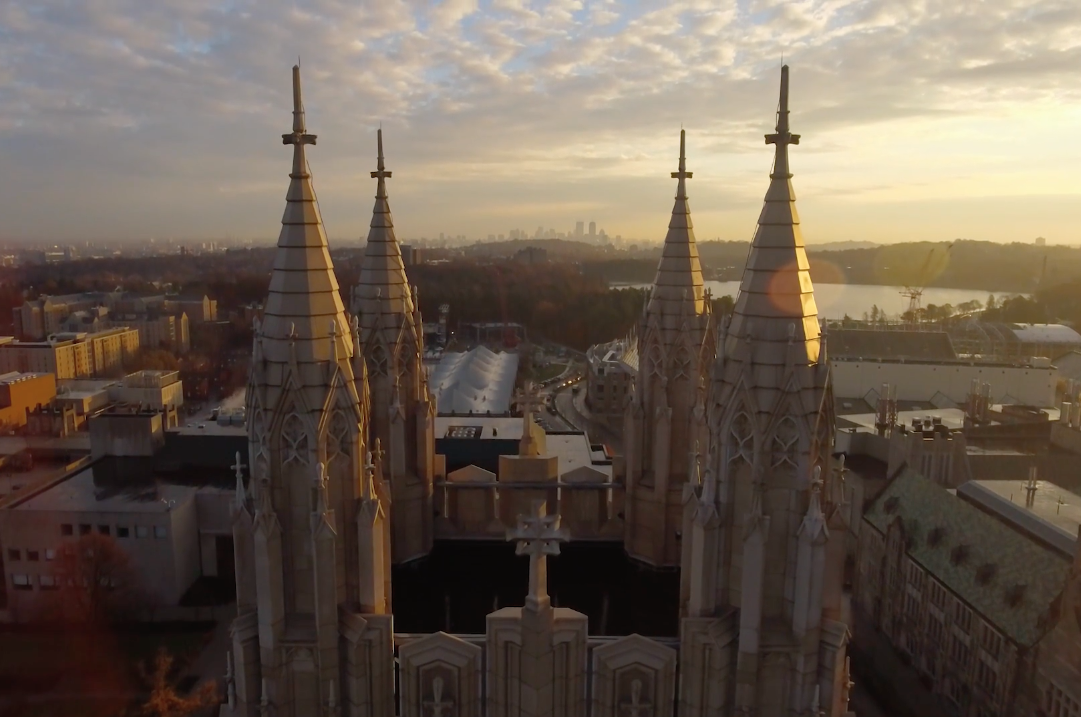
Men & Women for Others
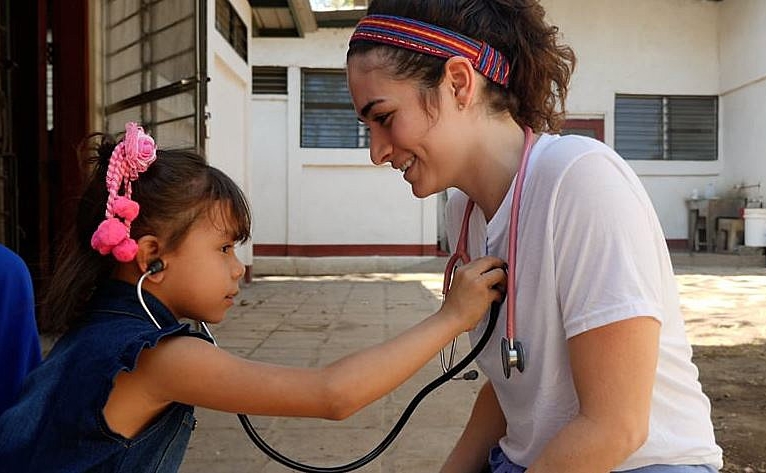
Nursing in Nicaragua
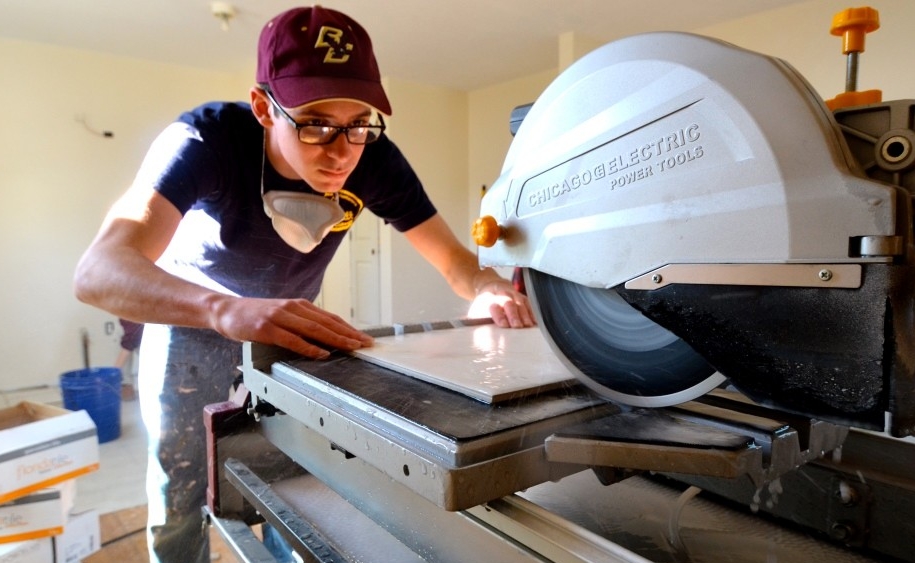
Appalachia Volunteers
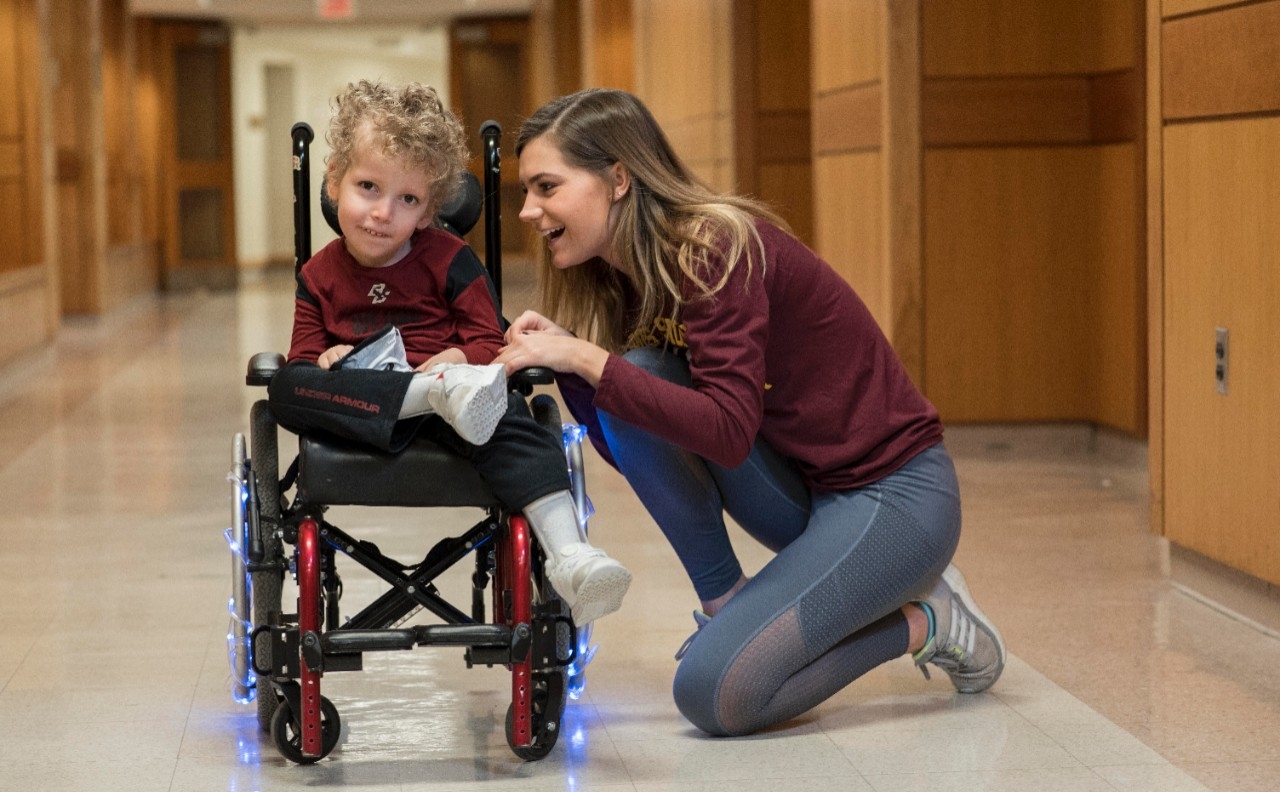
Campus School Volunteers
Academics & Research
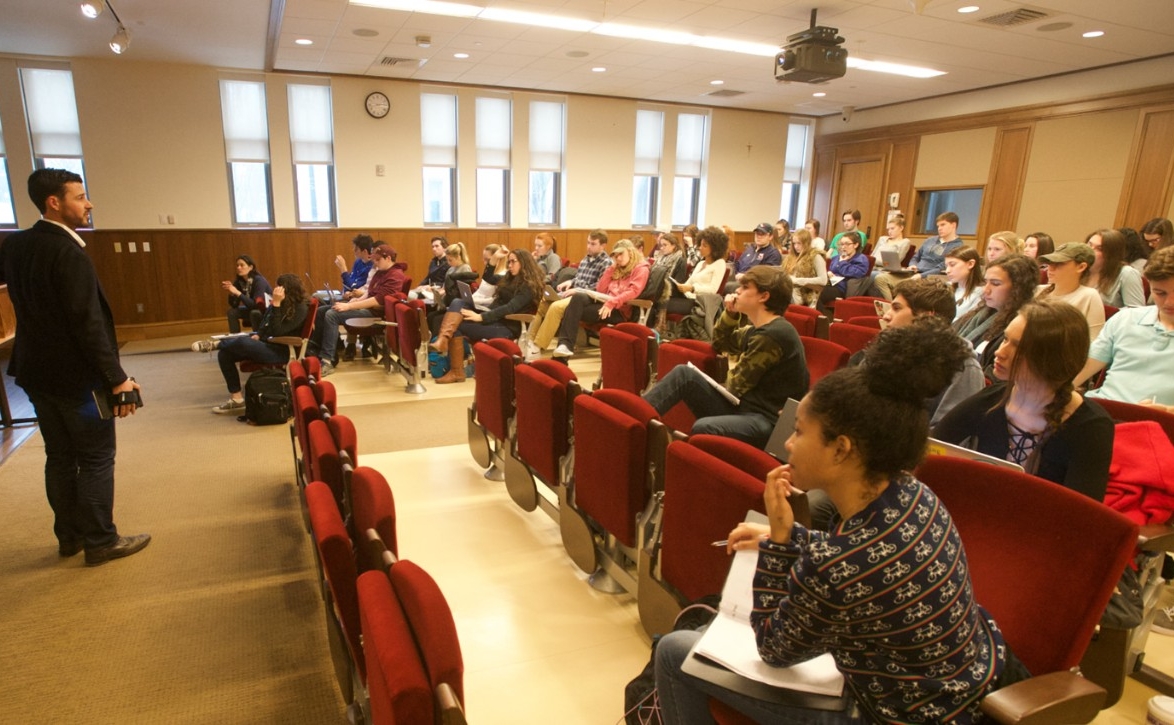
Core Curriculum
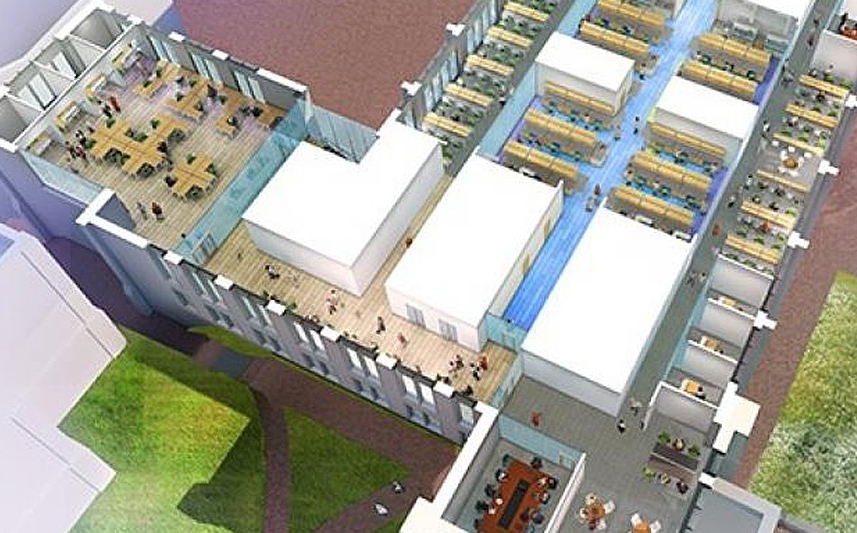
Schiller Institute
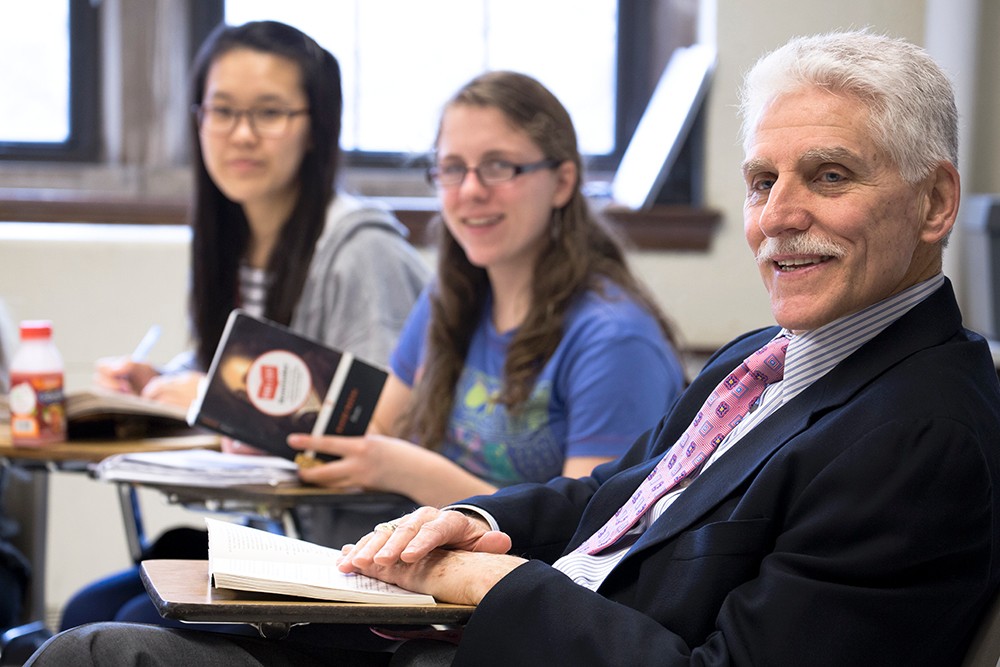
Perspectives Program

Explore Our Campus
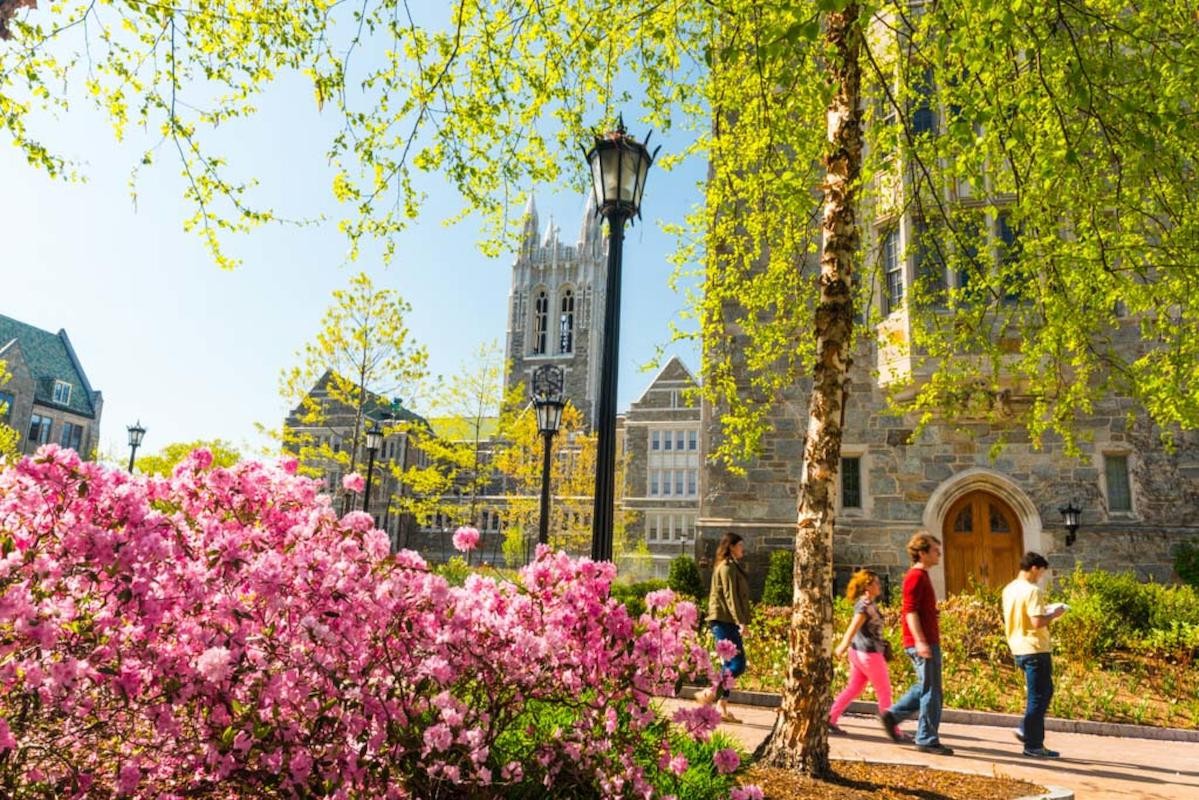
Gasson Hall in the spring
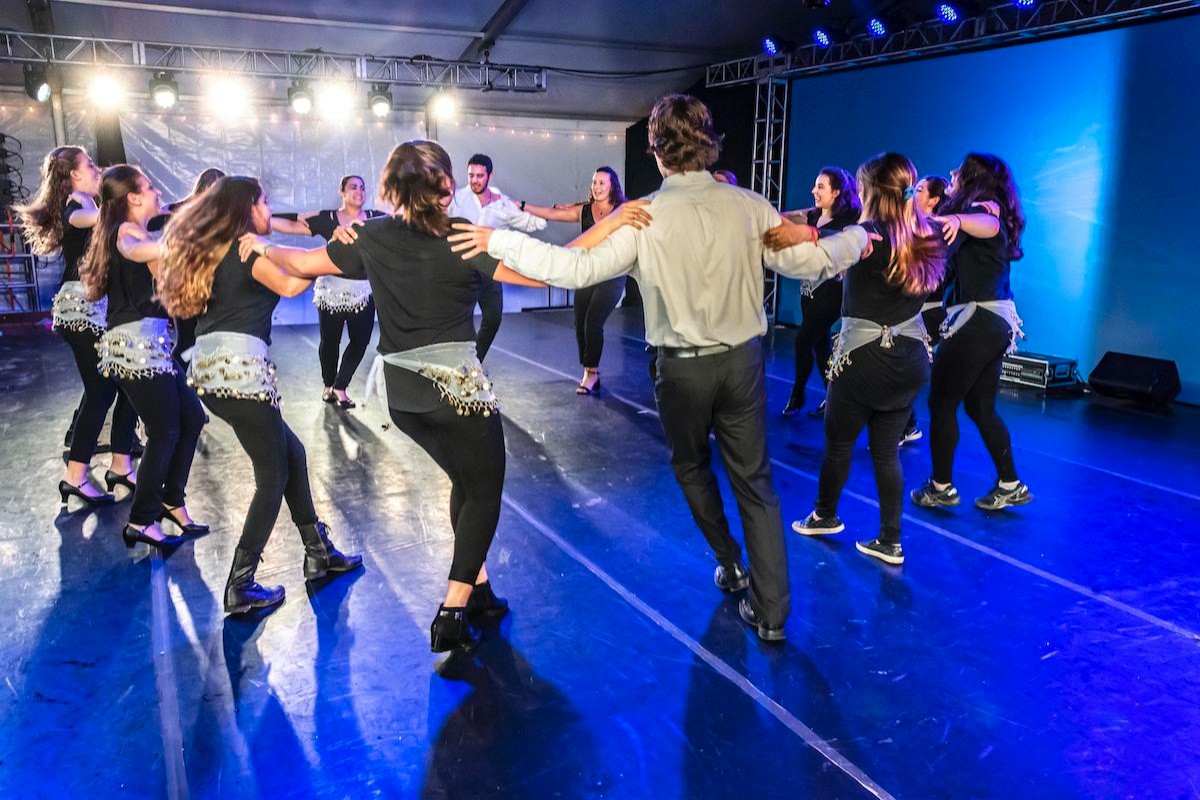
Every year, the Boston College Arts Festival brings the Boston College and surrounding communities together to celebrate the arts.
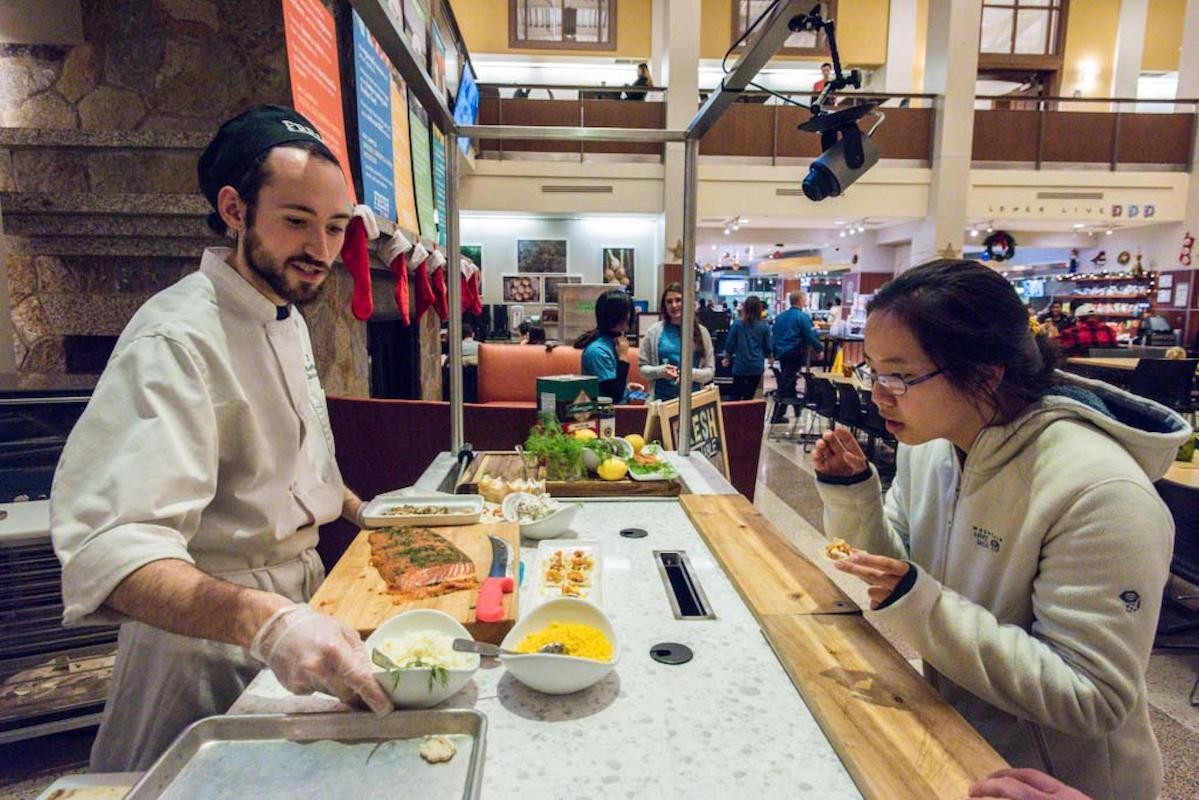
BC dining services has 14 locations and a variety of options.
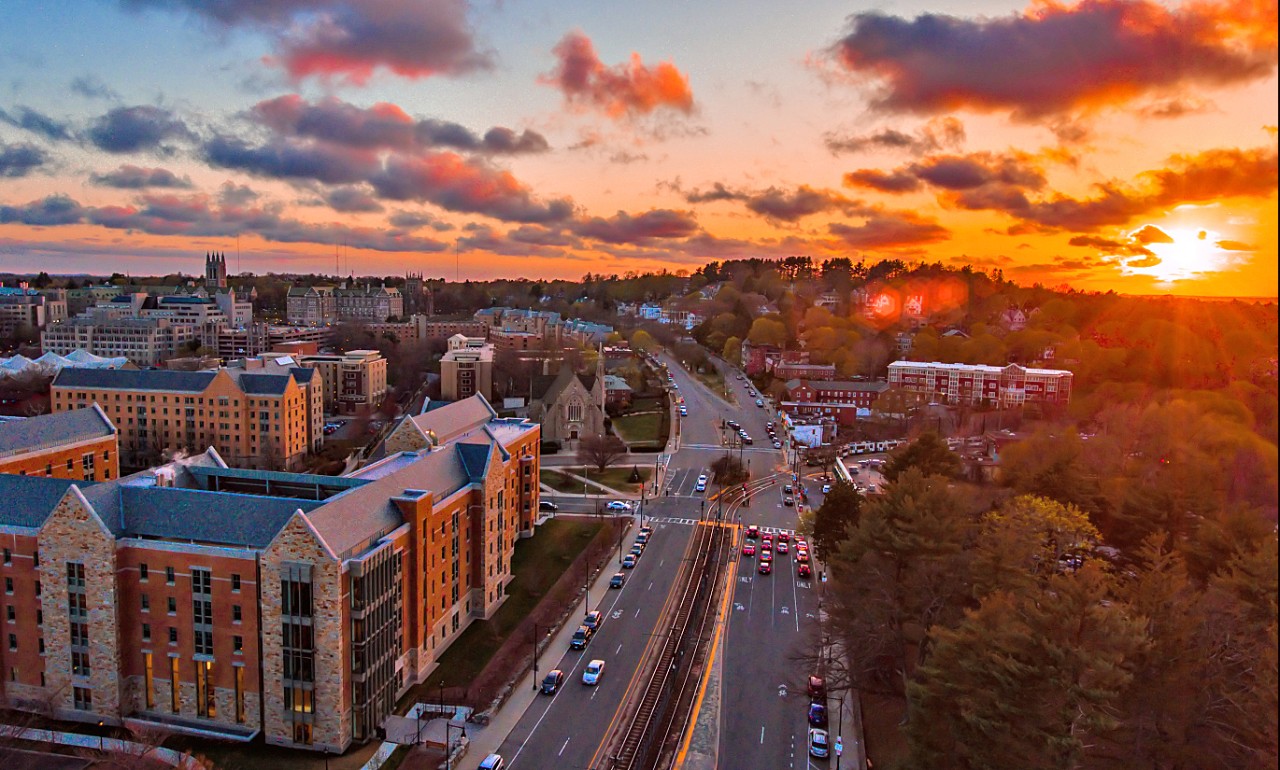
Commonwealth Avenue connects BC's campus to downtown Boston.
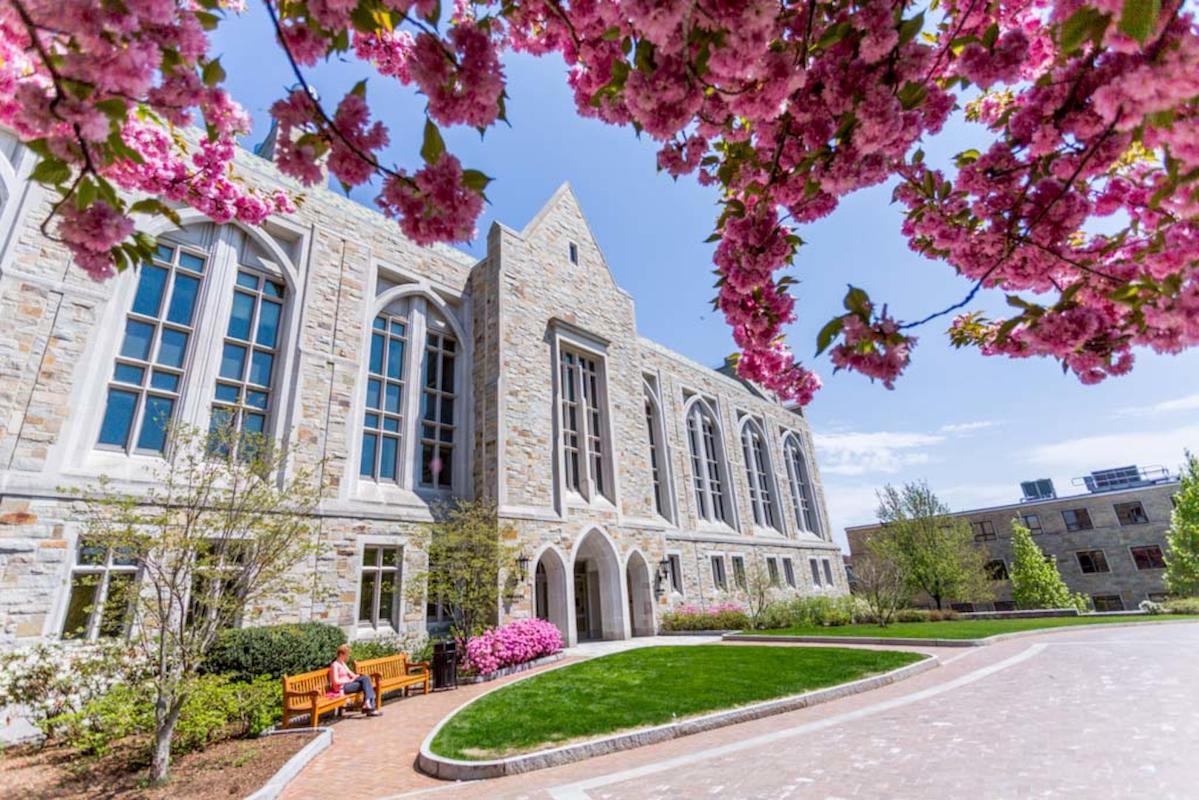
Higgins Hall is home to the Biology and Physics Departments
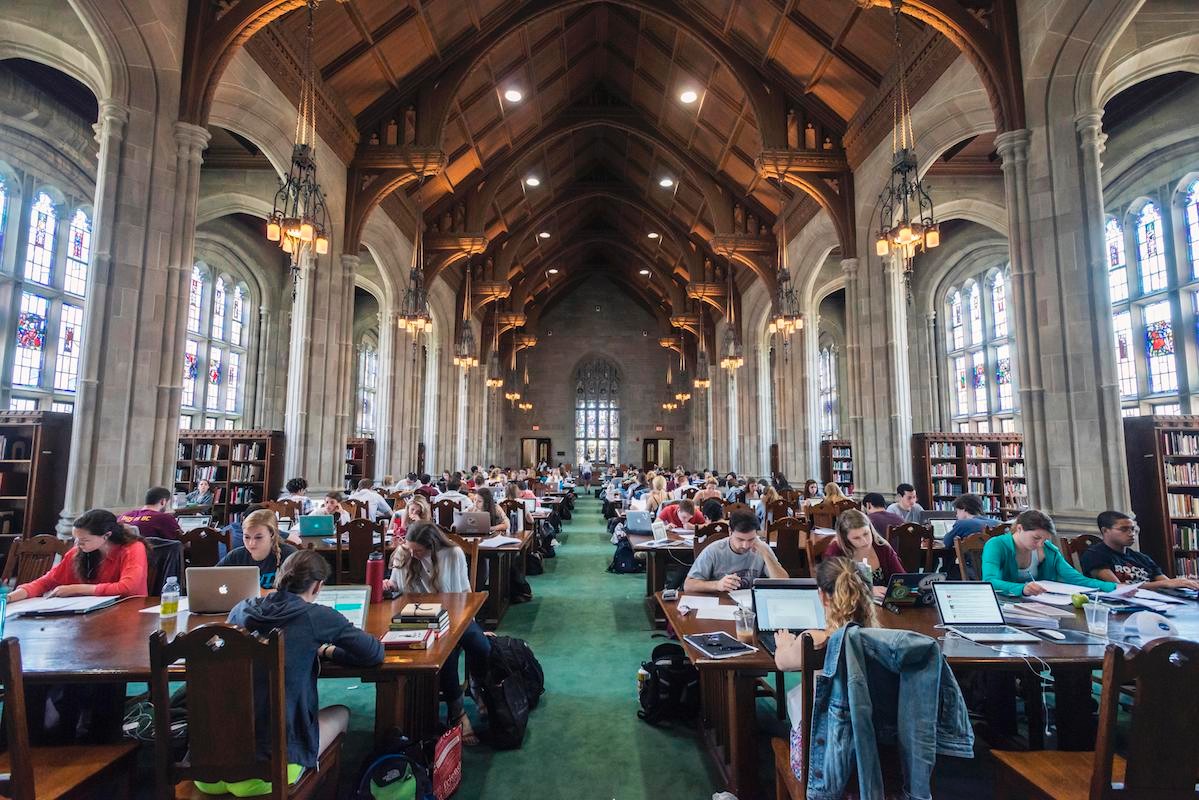
Gargan Hall in Bapst Library
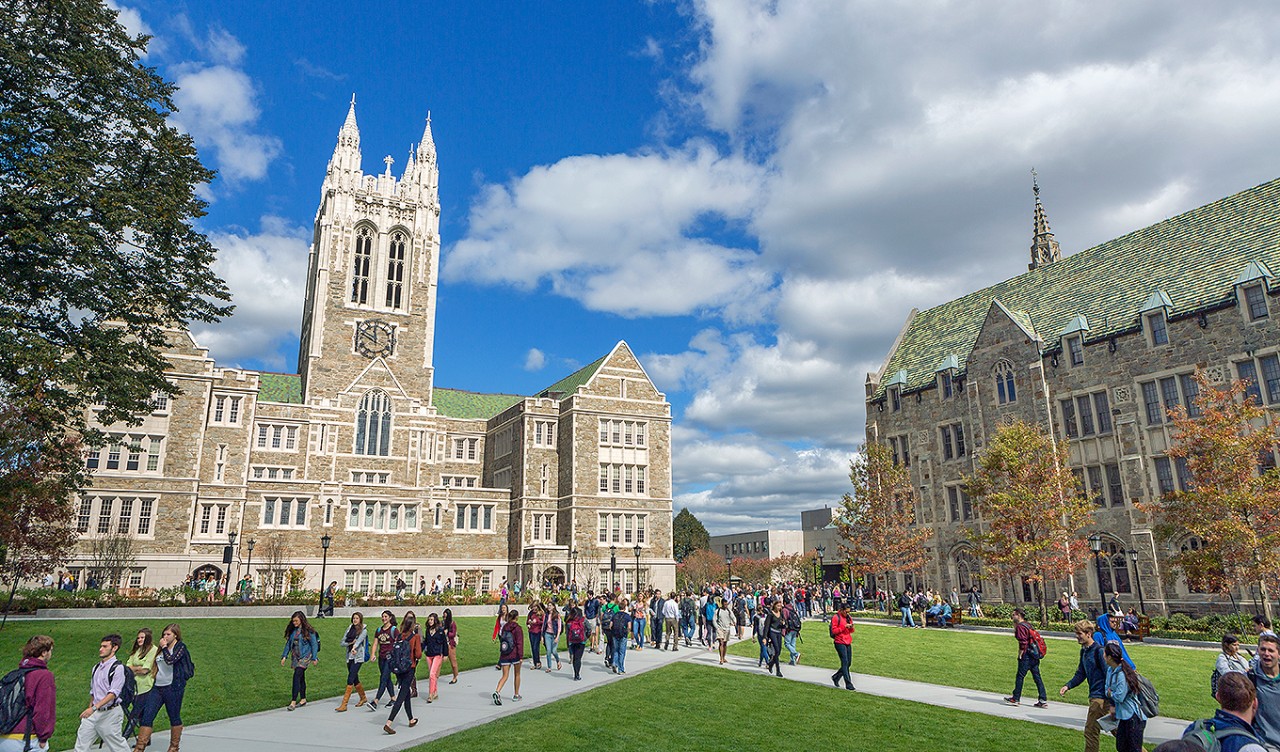
Gasson Hall and Devlin Hall on middle campus
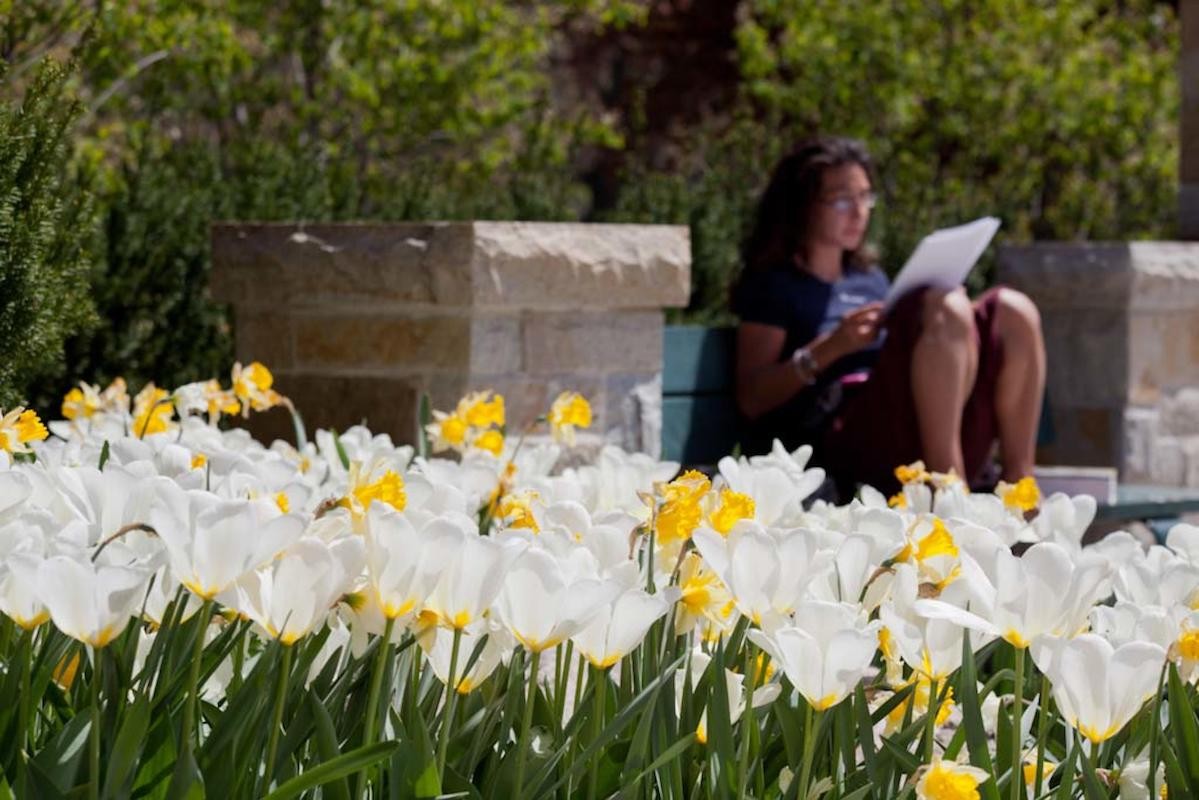
Dedicated in 2018, the Harrington Athletics Village features baseball and softball stadiums
- Funding Opportunities
- Discussion-Based Events
- Graduate Programs
- Ideas that Shape the World
- Digital Community
- Planned Giving

7 On-Campus Interview Tips Every Academic Job Seeker Should Know
Making a good impression during the final stage of the interview process is often what makes or breaks your academic job search. Here are a few on-campus interview tips to help you ensure a successful campus visit and, hopefully, a job offer.
General Advice
The campus visit is an extended interview. It can last up to three days, including travel, though the substance of the visit is typically contained within a single day filled with various one-on-one meetings and presentations. You generally arrive the evening before your scheduled meetings begin and leave the morning after.
Tip: You should treat all interactions that occur during the visit as an interview. This includes travel to and from the airport and all meals. This does not mean you cannot have a personality; you just need to acknowledge the entire visit can factor into the job offer decision.
The schedule for the campus visit is usually set before you arrive. Your schedule may change based on many factors, including the schedules of those you are meeting with, travel going according to plan, and even the weather.
Tip: You should know exactly when you’ll be presenting and who you’ll be meeting, but be flexible and prepared for change. Play it safe by having your materials ready to present the moment you step off the plane, and be prepared to meet with anyone on your schedule at any time.
If you’re planning on flying by plan, a faculty member will likely provide you transport from the airport to your hotel.
This part of the visit is not formal and you shouldn’t treat it as such. However, in the spirit of treating the entire visit as an interview, you don’t want to come across as careless either. You want your potential future colleagues to see you as a productive and professional academic. You also want them to see you as someone that would be enjoyable to work with. In the very least, you don’t want to be seen as a pain. While your CV signals your quality as an academic, the informal conversations you hold signal your personal compatibility with your prospective colleagues.
Tip: If this is the case, you should plan on traveling in your suit, and be prepared be prepared to hold a steady conversation the person who picks you up from the airport (you’ll likely know who it is in advance). This is your chance to ask the individual more detailed questions about the area and signal your interest in living there if the opportunity presented itself.
Campus visits often occur usually occur during flu season. Combine this with the general fatigue you experience from the job market and germs you come across while traveling, and you have a significant chance of becoming ill. Campus visits are exhausting in their own right, and it would be substantially more difficult to maintain your focus for a full day of meetings and presentations if you were ill.
Tip: Take care of yourself, and always be sure to bring vitamins and hand sanitizer with you.
Individual Interviews
You’ll usually know who you are meeting with before you arrive on campus. If you read my previous blog post discussing initial interviews, you’ll be better prepared for faculty interviews. Each individual interview you have during your campus visit will be short. You should be familiar with their research and teaching interests, even if they are completely unrelated to yours. If nothing else, this allows you to ask them questions if the conversation begins to falter.
Preparing for individual interviews with administrators is slightly different than preparing for interviews with faculty. While it is likely they will still want to discuss your research and teaching interests, the focus will be different. You’ll want to emphasize how you can contribute to broader goals regarding the college or university. As with faculty members, you can familiarize yourself with each administrator. This allows you to focus on the aspects of your work that are relevant to that administrator’s specific role.
Tip: Understand the purpose behind each individual interview, and read up about your interviewers in advance.
Presentations
You’ll almost certainly know what style of presentation you’ll be expected to give: research, teaching, or both. You should know if the audience will consist of faculty, students, or a mix of both. Your research presentation should be substantially different depending on the audience. In fact, there could be an entire blog post concerning presentation style differences for faculty-only audiences versus student audiences. I’ll only note here that if there are students present for your research talk, you should spend less time explaining the methodological nuances of your approach and more time discussing the intuition behind your research question.
Regardless of the audience, your research presentation should be well-rehearsed. You should know every detail of the paper you are presenting and be prepared to answer questions. If you’ve presented the paper in the past, you should be aware of common questions that come up and have thoughtful answers for these. The best way to prepare for answering questions you aren’t anticipating is to present.
Tip: Present your work every chance you get. Presenting is a skill, and you can only improve upon this skill through practice.
Similarly, the only way to prepare for teaching presentations is through the act of teaching. The faculty will most likely be judging the teaching based on your ability to connect with students in the classroom, rather than the actual content you are presenting. This is something you learn by doing.
Tip: If you have any opportunity to teach in your graduate career, take it.
Campus visits represent your final step in your long job market journey. They are busy and can be stressful; however, it is important to try to remain as relaxed as possible.
This is an exciting time. You get to explore new places and meet many new people. With these campus interview tips, you’ll be well prepared for a successful visit. Even if you don’t end up working at the school you’re visiting, you may end up with new collaborators or friends. Enjoy it as much as you can.
Previous Post This Land is Your Land, This Land is… Whose Land?
Next post the 7 rules for completing and publishing your first academic paper.
Comments are closed.
- Privacy Policy
© 2024 Institute for Humane Studies at George Mason University
Here is the timeline for our application process:
- Apply for a position
- An HR team member will review your application submission
- If selected for consideration, you will speak with a recruiter
- If your experience and skills match the role, you will interview with the hiring manager
- If you are a potential fit for the position, you will interview with additional staff members
- If you are the candidate chosen, we will extend a job offer
All candidates will be notified regarding the status of their application within two to three weeks of submission. As new positions often become available, we encourage you to visit our site frequently for additional opportunities that align with your interests and skills.
32 Questions to Ask on a College Visit
Students should feel free to ask questions during an information session or on tour.
Questions to Ask on a College Visit

Getty Images
Prospective students should conduct at least basic research to facilitate questions to ask during the information session or on tour, experts say.
Key Takeaways
- Before a campus visit, students should do basic research on the school.
- Students and their families have various opportunities to ask questions.
- No question is dumb.
College visits, whether in person or virtual, can help give prospective students a better feel of campus life.
Contrary to popular belief, however, students don’t need to have that “a-ha” moment when they eventually find the campus where they belong, says Thyra Briggs, vice president for admission and financial aid at Harvey Mudd College in California.
“I just don't think that happens for most students,” she says. “I don't want students to walk away from a visit where that didn't happen thinking, ‘Oh, this is not the place for me.’ This is a long-term relationship. It's not necessarily love at first sight. … In this age of instant gratification, I think it's an important thing to give a school a chance to affect you in a different way.”
For an in-person visit, families should prepare ahead of time by checking the weather and dressing comfortably as tours are mostly held outside.
"Leave plenty of time at an individual campus and allow yourself to enjoy the experience, be present in the moment and (don't) feel rushed because that could also skew your perception of things," says Bryan Gross, vice president for enrollment management at Hartwick College in New York.
It’s also important, experts say, to conduct at least basic research on the institution – even if it’s just looking at their social media accounts – to help facilitate questions to ask during the information session or on tour.
"We know that for some of you, this may be the first time you are going through this," Briggs says. "For others, it's a different student (going through the process) than the student you had who's older. So there’s no bad questions. ... I would hope that any college would welcome any question a student would ask.”
Here are 32 example questions, collected from college admissions and enrollment professions, that students don't always think to ask on college visits. These questions – edited for length or clarity – were provided by Briggs, Gross and Brian Lindeman, assistant vice president of admissions and financial aid at Macalester College in Minnesota.
Questions About Admissions
- Does this school consider demonstrated interest?
- Is there an opportunity for prospective students to sit in on a class to experience a real lecture?
- Are there options to receive a lunch or dinner pass at the dining hall to try the food?
Questions About Academics
- Where do students typically study?
- How does advising work?
- What are the academic strengths of this school?
- What opportunities are there for study abroad and exchange programs?
- If available, are these global programs directly run by this school – where faculty members travel with students – or are these study abroad programs outsourced to a third-party company?
- Are these study abroad experiences built into the tuition or are there additional fees to participate?
Questions About Financial Aid
- What is this school's average financial aid package?
- What is the average net cost when students enroll?
- What is the current level of funding with endowed scholarships – how much are donors contributing to scholarships?
- Do you offer merit aid ? If so, what are you looking for in a candidate?

Questions About Campus Housing and Community
- What are the housing options?
- What are the fee structures for these different options?
- Are students required to live on campus ?
- How does your campus define diversity, equity, inclusion and belonging?
Questions to Ask Your Tour Guide to Gauge Campus Life
- What surprised you about this school? What's something you didn't expect?
- What keeps you coming back to this school each year?
- Have we seen your favorite place on campus?
- What event on campus gets the biggest turnout every year?
- If you were struggling with an issue, would you know who to turn to? Who would that be?
Questions About Work and Research Opportunities
- What are the opportunities for undergraduate research on campus?
- How do those research opportunities give students valuable hands-on experiences that enhance their resumes?
- What are some specific ways this school helps students gain hands-on experience through internships ?
Questions About Student and Career Outcomes
- What is the retention rate from freshman to sophomore year?
- What is the five-year graduation rate?
- What is the job-attainment rate of graduates within six months of graduating?
- What percent of students are going on to graduate school ?
- What percent of students are intentionally taking time off post-graduation compared to those who are not able to find jobs?
- What size is the alumni network?
- How are alumni actively engaging with recent graduates to help connect them specifically to opportunities in their fields?
Searching for a college? Get our complete rankings of Best Colleges.
Unique College Campus Visits

Tags: colleges , education , campus life , college applications , students
Ask an Alum: Making the Most Out of College
You May Also Like
Scholarships for lesser-known sports.
Sarah Wood May 15, 2024

Should Students Submit Test Scores?
Sarah Wood May 13, 2024

Poll: Antisemitism a Problem on Campus
Lauren Camera May 13, 2024

Federal vs. Private Parent Student Loans
Erika Giovanetti May 9, 2024

14 Colleges With Great Food Options
Sarah Wood May 8, 2024

Colleges With Religious Affiliations
Anayat Durrani May 8, 2024

Protests Threaten Campus Graduations
Aneeta Mathur-Ashton May 6, 2024

Protesting on Campus: What to Know
Sarah Wood May 6, 2024

Lawmakers Ramp Up Response to Unrest
Aneeta Mathur-Ashton May 3, 2024

University Commencements Must Go On
Eric J. Gertler May 3, 2024

Interviewing and Talking with Prospective Faculty
The graduate application process varies broadly and depends on your specific academic program.
The variations might include:
- Admission decision based only on an online application
- In the cases where you are admitted to work with a specific faculty member, you should contact faculty directly
- A short list of applicants are invited for an on-campus interview trip
- Applicants are admitted first, and then invited for an on-campus recruiting trip
Because of the range of possible application processes, it’s critical to learn about each program's requirements. For some graduate programs, you will need to directly contact faculty because a specific professor will decide whether to admit you as their own graduate student. In these circumstances, make sure to contact the faculty directly. (When contacting faculty for the first time, see the side box below for suggestions.)
It will be important in your decision-making process to determine if you envision working closely with that faculty member and if you have complementary working and communication styles. The faculty member will also want to assess your experiences and how you work by communicating with you. Thus you will want to sharpen your interview skills as you communicate with faculty.
Some graduate programs will invite you to conduct a phone interview or invite you to the university for a campus visit (common in the biosciences). The interview is your opportunity to more thoroughly demonstrate that you have what it takes to be in the graduate program. You will want to show your understanding and enthusiasm for the research that you have done. Some suggestions to prepare for the interview are provided below.
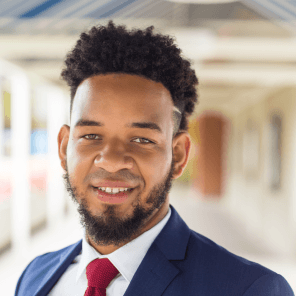
My advice to the next generation of scholars is to never be afraid to ask for help. At times it may seem like brilliance is a singular, herculean effort, but a lot of great ideas have been shaped and molded from the minds of many. Whether it’s your advisors or peers, we’re all here to help. Never be afraid to acknowledge that you don’t fully understand something—collaboration is encouraged and celebrated.
— Bryen Irving, PhD candidate in Physics
1. Before the interview
- For campus visits, it’s OK to ask what is expected of you and how to prepare (e.g., if your travel expenses will be covered, how to dress, if you should bring your CV, etc.).
- Learn about the faculty and people you will be meeting or communicating with. Read about the research interests of the faculty, including abstracts or papers. Prepare at least 1-2 specific research questions for each interview.
- Review the research that you conducted. If it was published or presented at a conference, reread the paper, abstract, or poster. Prepare a brief (1-2 minutes) oral summary of your past work. What was the research question? How did you address it? What did you specifically complete and achieve? What are some possible questions that faculty might ask?
- Prepare detailed questions you have of the program you are considering. Generic questions (e.g., tell me about your program) indicate that you didn’t read the basics on their website, and so won’t leave a positive impression. Determine what’s important for you (specific research facilities, professional development activities, student groups, opportunities for collaborations, etc.) and research them online.
- Determine and list the questions you have about the program, university, and location of where you are visiting. What are you hoping to see and learn?
- Ask a peer or friend (e.g. a current grad student or postdoc who is familiar with grad school interviews) to help you sharpen your interview skills.
- Come prepared to the mock interview in professional attire and with your materials (CV, papers, etc.).
- If possible, video record your mock interview. Although many cringe at watching themselves, the video can be incredibly helpful in revealing blind spots.
- If your interview will be conducted via Skype or another video platform, some helpful tips are provided in this YouTube video .
- After the mock interview, ask your peer for honest and critical feedback. Listen actively without being defensive and allow your peer to speak openly, which will help you improve.
2. During the interview
- For campus visits, dress appropriately (usually business casual, but be comfortable); be on time; organize your papers (e.g., résumés/CVs, slides or images, questions).
- Even for phone/Skype interviews, dressing professionally will help you to mentally prepare for the interview.
- Speak enthusiastically about your work. Highlight your research accomplishments and/or professional growth. If asked to speak about a weakness, phrase your answer in a forward-looking manner to demonstrate learning and growth, and awareness of your weaknesses.
- You’ll want to sound positive and enthusiastic. But avoid excessive enthusiasm, which could be interpreted as naiveté or desperation. This is a tough balance to achieve, so practice with others.
- Listen actively to your faculty interviewers as they talk about their research.
- Ask questions, using your prepared lists. Take notes to remember comments and suggestions.
3. After the interview
- Summarize your perceptions of the program, university, and environment. Make a table listing the pros and cons. List the people whom you met on your visit, and write a brief comment for each person to help you remember your interactions. Is it a good fit for you?
- Email your interviewers and thank them for their time. Follow up if you promised to provide any materials. Even if you determine that you don’t wish to work with that faculty member, this isn’t the time to burn bridges, and you might bump into them in the future.
- Reflect on your interview performance and make adjustments to strengthen your next interview.
contacting faculty for the first time
Your first contact with faculty is absolutely critical, because you don’t get second chances to make a first impression. You’ll need to craft an initial email message that will clearly communicate who you are, and why you’re reaching out to them specifically.
This can be very challenging because you’ll need to be clear and concise in a brief email message. Provided below is a sample email message with additional suggestions.
Don’t simply copy this message, but this example provides a template that can be used to customize your own initial email message.
Subject: Ecology PhD Program at Stanford
Dear Professor Peter Beak, I am currently a senior and McNair Scholar at UC Davis, and would greatly appreciate an opportunity to briefly speak with you about your research and the Ecology and Evolution PhD program at Stanford. I am seeking to pursue a PhD in Ecology, and my research advisor (Professor Emilio Laca) spoke highly about Stanford’s graduate program. I am particularly fascinated by studies on the influence of infectious diseases on population dynamics and community interactions. I have conducted similar research here at UC Davis, and also at Northwestern University using freshwater plankton, and won an oral presentation award at ABRMCS. These are further described in my attached CV. I carefully reviewed your website, and would greatly appreciate speaking with you on the phone (~15 min) to learn more about future directions of your research, particularly on developing mathematical models. I am available during these time slots. Please let me know if any of these work for you, and I’d be happy to offer more time slots if needed.
Sept 1, Wed 12-5 pm Sept 3, Fri 12-7 pm Sept 6, Mon 12-7 pm Sept 7, Tue 9-12 pm
Steve Lee McNair Scholar splee "at" ucdavis.edu (cell) 650-555-1234
- Use a brief subject line. Avoid vague subjects (e.g., “question” or “request”).
- Address them by their full name and professional title. Don’t use “Hi” or “Hey” or other informal greetings.
- In the very first sentence, quickly summarize who you are and why you’re contacting them. If a person known to the professor suggested that you reach out to them, include that info also.
- Explain why you’re contacting them specifically. Describe your highlights briefly. Attach CV and/or link to LinkedIn profile. Include other links as needed.
- State your request; be specific. Make it easy for them to say yes to your request; provide ample times when you’re available.
- Include your full name. If you’re in a graduate prep program, include info. Include your email and phone.
© Stanford University, Stanford, California 94305
Gettysburg College Gettysburg College
Visit Gettysburg College
The Gettysburg College Admissions Office offers in-person tours of campus. Opportunities for on-campus interviews for h igh school students and transfer students are also available. If you aren’t able to travel to campus, we have a variety of virtual visit opportunities including online interviews, information sessions, and much more.
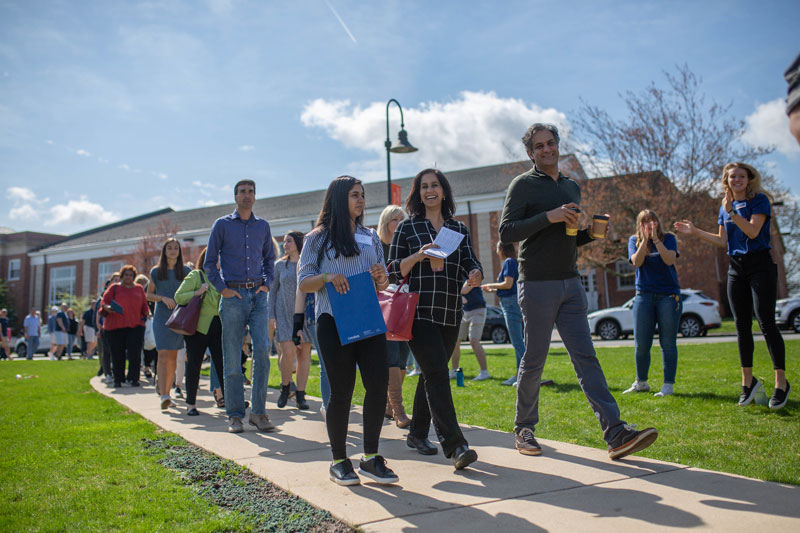
Campus visit
The Gettysburg College Admissions Office will be welcoming registered visitors for in-person tours of campus and interviews with an Admissions representative. We will continue to add dates and visit options weekly.
Learn about campus visits
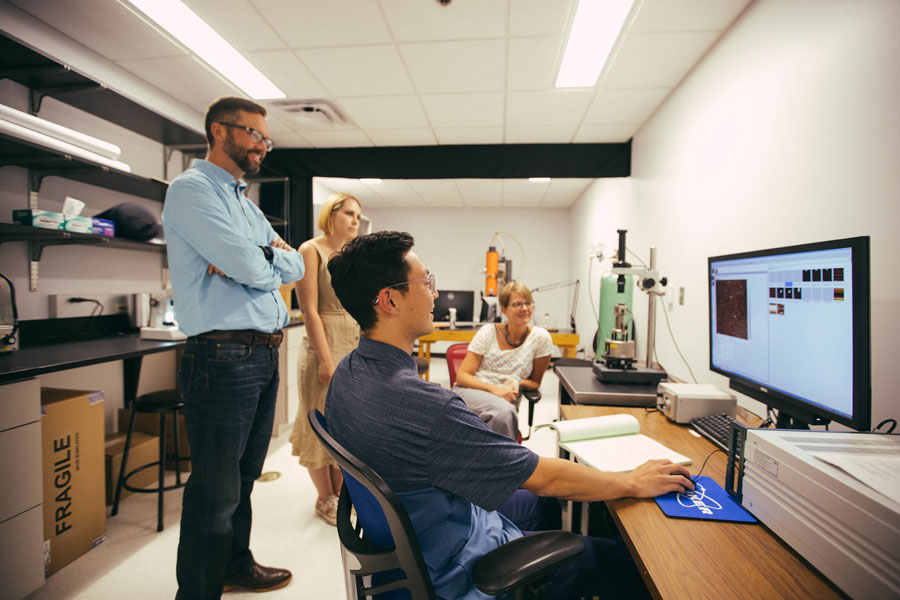
Virtual visit
The Admissions Office offers a variety of ways for you to connect with us virtually including information sessions, interviews, and opportunities to meet with current students.
Learn about virtual campus visits
Plan your visit
After you have scheduled your visit, learn about visiting Gettysburg!
- Getting to Gettysburg - Driving directions, town and campus maps, transportation options
- Where to stay and eat - Lodging and restaurants
- While you are in Gettysburg - Explore the Battlefield or attend a show at the college-owned Majestic Theater.
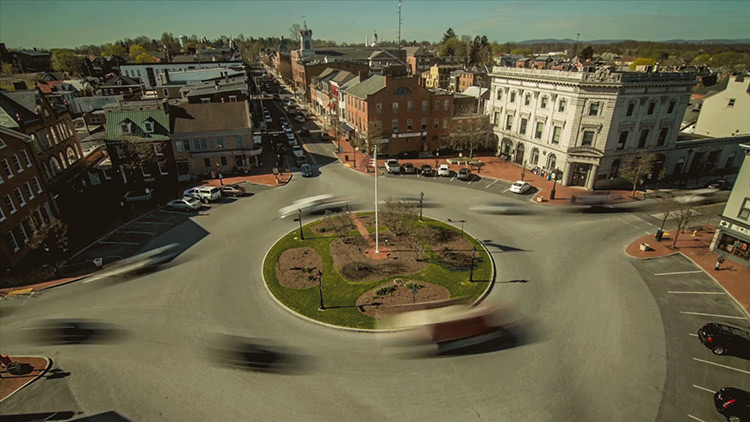
Historic Gettysburg has something for everyone.
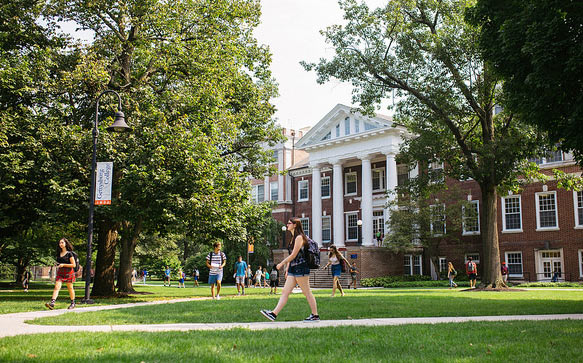
Questions to ask a current student:
- How are the food options at Servo ?
- Who can participate in the Sunderman Conservatory of Music ?
- How are the students involved in the community with the Center for Public Service ?
- What is a First-Year Seminar and which one did you take?
- What amenities and activities are offered at the John F. Jaeger Center for Athletics, Recreation, and Fitness ?
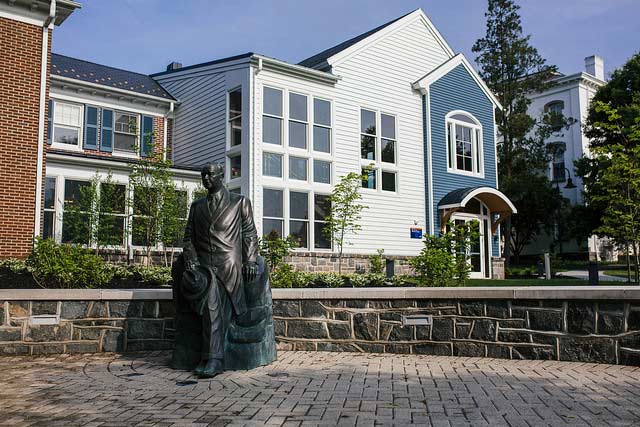
Meet the admissions staff
The Admissions Office staff is here to assist you with anything you need and tell you about everything Gettysburg College has to offer. Feel free to contact them !
Undergraduate Admission
- Contributors
- Valuing Black Lives
- Black Issues in Philosophy
- Blog Announcements
- Climate Matters
- Genealogies of Philosophy
- Graduate Student Council (GSC)
- Graduate Student Reflection
- Into Philosophy
- Member Interviews
- On Congeniality
- Philosophy as a Way of Life
- Philosophy in the Contemporary World
- Precarity and Philosophy
- Recently Published Book Spotlight
- Starting Out in Philosophy
- Syllabus Showcase
- Teaching and Learning Video Series
- Undergraduate Philosophy Club
- Women in Philosophy
- Diversity and Inclusiveness
- Issues in Philosophy
- Public Philosophy
- Work/Life Balance
- Submissions
- Journal Surveys
- APA Connect

How do you bring candidates “to campus” during the COVID-19 pandemic? Part 2

The APA Best Practices for Interviewing and the APA Good Practices Guide, Chapter 5 on Interviewing and Hiring serve as invaluable resources for candidates and hiring departments. Nevertheless, the pandemic has thrown us all into a bit of a conundrum for how best to conduct interviews—especially the important second-round or “on-campus” interview—in spite of rather challenging conditions related to social distancing and travel restrictions. In a previous post , we offered some suggestions for re-imagining the traditional on-campus interview. In this post, we use the standard categories of activities during an on-campus or second-round interview to guide more specific suggestions.
Teaching demonstration : The academic job market is primarily about hiring teachers for our institutions. The teaching demonstration is one of the most important elements of the campus interview. Although, arguably, we are all better teachers when we are “live” and in person, the pandemic has taught us of the importance of being flexible in course delivery and introduced many of us to the possibilities abundant in online teaching. Candidates are always keen to demonstrate their abilities with technology and the current situation provides an avenue for that. Additionally, familiarity with online teaching in some form will likely become a necessity in the coming years.
Much of the available advice for teaching demonstrations applies also to online teaching demonstrations, but some consideration is needed for how to conduct the demonstration. Hiring departments still want to know that candidates can communicate course content in a way that builds connections with students and demonstrates flexibility and teaching aptitude. Hiring departments also look for the candidate’s ability to meet diverse student needs, to create an inclusive classroom environment, and to provide equitable treatment of students. Some ideas:
- Ask candidate to teach a session of a course via Zoom to a fully online course.
- Offer a teaching demonstration to a group of students via zoom and record for faculty evaluation later (i.e., exclude faculty from the online class).
- Have the candidate teach a session of a live course via remote presentation (i.e., the candidate is on the screen while the students are in a socially-distant in-person class).
- Ask the candidate to record a mock class session or make a quality short video for use in a class.
Job-Talk/Research presentation: The second major component of a traditional on-campus interview is the research presentation or job talk. This tends to take the form of a paper presentation followed by questions, but it also could be a conversation around a pre-circulated paper. These practices, too, can be adapted to fit the remote format. Regardless of which style of presentation format is selected, all candidates should be instructed that the same format will be used in order to ensure fairness. Consider these proposals:
- Candidate provides a prerecorded presentation of the reading of the paper; hiring department and candidate meet via video conferencing to discuss. Chair of session should maintain the list of the questioners so that the candidate is free to concentrate on responding.
- Candidate provides a written version of the paper which the department reads ahead of time. Hiring department and candidate meet via video conferencing to discuss. Chair of session should maintain the list of the questioners so that the candidate is free to concentrate on responding.
- Candidate reads paper over video conferencing and responds to questions, i.e., simply move the traditional presentation to the video conferencing format.
- Candidate provides a brief (~20 min) presentation with slides of a pre-disseminated paper. Questions from the hiring department follow.
Meeting with Dean, Associate Dean, Graduate Dean: On-campus interviews usually include at least one meeting with a college or university administrator. These meetings tend to be short (30 minutes) and take the standard format of questions and answers. In fact, these interviews usually involve sitting in an office or at a conference table and talking. Meetings with administrators in the traditional on-campus format sometimes spill overtime and schedulers have included ample “travel time” to-and-from the interview to allow for that contingency. These administrator interviews could easily be transitioned to the virtual format using Zoom, Microsoft Teams, or Skype. However, hiring departments should take care not to schedule them one after another, but should instead space them out with at least 30 minutes of down time in between each one.
Meeting with Chair: The department chair plays multiple roles in an on-campus interview. The chair is often the organizer and host of the campus visit. In addition, the chair plays a role in representing the candidate to administrators prior to, during, and after the campus visit. The chair also explains some of the more complex elements of a position to the candidate, such as research support or the requirements for tenure. The chair answers questions about teaching support, evaluation, and even local public schools. Usually there is at least one formal meeting with the department chair in addition to multiple informal meetings as the chair shuttles the candidate from one meeting to another or delivers the candidate from the hotel to the campus. On the surface, many of these are not easily replaced in a remote format. However, with some diligence and care, we think all of them can be covered.
- Chair should meet with candidate (however briefly) before any other part of the interview so that the candidate has an opportunity to ask questions.
- Departments ought to have written statements about evaluation criteria; universities similarly ought to have policies on rank and tenure review. The department chair can provide links or pdf of relevant documents and invite candidates to send written questions or invite candidates to follow up with a telephone call or video conferencing. (Offering resource information in written form has the benefit of removing one video conferencing chat from the schedule.)
- Department chairs can schedule a dedicated video conferencing conversation to discuss tenure, support, and evaluation. Given that there will be a lot of questions associated with this, the schedule should allow for 60 minutes.
- Chairs can prerecord a slide presentation with the relevant information and follow up with candidates for any questions via telephone or video conferencing.
- Chair meets with candidate via telephone or video conferencing
- One of the video conferenced social gatherings is dedicated to local area
- Chair provides links to local information via email
- Candidate and chair meet via video conferencing at end of all scheduled interviews.
- Chair provides information about the hiring and search process going forward via email.
Meeting with Director of Graduate Studies (DGS): Universities with graduate programs often have a dedicated interview session with the director of graduate studies so that the candidate may ask questions specific to the graduate program. The DGS also hopes to obtain a sense of the nature and variety of possible graduate courses the candidate could offer.
- Live meeting via Teams, Zoom, Skype.
- Email questions for written response (e.g., “what graduate courses are you interested in teaching at our institution and why?”). Any request for written responses should give the candidate a full week to compile responses.
- Telephone call discussion.
Social interactions: Social interactions (meals, walks between appointments, and receptions) make up a significant portion of a traditional on-campus interview. We can all agree that social interactions of any sort are more difficult in a remote context. Nonetheless, there are ways to meet the challenge. As a precursor for virtual interactions, we cannot underestimate the value of faculty having relatively up to date and informative webpages to provide a sense of the intellectual life of the department. Beyond that, the first step in replacing the traditional social interactions of a second-round interview is to think about what one hopes to provide from social interactions and what one hopes to learn about the candidate. Importantly, social interactions present the hiring department to the candidate as much as vice versa. In thinking about how to engage socially, departments might need to think about how to balance personalities so that dominant colleagues are balanced (or controlled!), and interesting aspects of the departmental community are highlighted. A number of possibilities spring to mind:
- Multiple video meetings between no more than three different faculty members and the candidate focused on predetermined topic, e.g., “how do you teach intro?”; “what do you enjoy when not doing philosophy?”; “the foodie/art/music/museum scene in our area”; “the support of philosophy in our college or university”; etc. The idea is to give the candidate a chance to talk to everyone in the department or in related interdisciplinary programs while not requiring the candidate to be the center of the “interview” all the time.
- Whether as part of the video meetings or as a separate, intentional activity, an icebreaker event as suggested by Jewkes et al . contributes to “openness in communication and rapport building between candidates and committee members.” They explain the value of social engagements as creating “empathetic joining processes.” Using lighthearted ice-breaker questions to which both committee members and candidates respond provides a virtual substitute for the in-person equivalent.
- Teaching tools like Flipgrid or VoiceThread might also be used. For instance, each faculty member could post a short conversation-starter and question via Flipgrid. The platform allows candidates to record short videos and preview the video to accept or reject their recording. This increases accessibility as candidates can record videos at times that are convenient to them, and to re-do a video as many times as needed. Further, although some care in the initial set-up is required to keep candidates from seeing each other’s postings, all faculty can review all submissions and make evaluations across all three candidates for the same questions. Conversations on Flipgrid are amazingly versatile and fulfilling, in spite of being slightly stunted. Some hiring teams are already using a similar approach with written questions to which the candidate provides a recorded response.
Interactions with administrative assistants : Some hiring departments put a premium on the interaction between the candidate and the department staff. For the traditional on-campus interview, those interactions have already moved to be primarily email but some in-person interaction is still involved and encouraged. The feedback from these interactions measures a candidate’s professionalism in working with staff as well as organization in responding to the necessary paperwork. Moving these fully online should be relatively easy but hiring departments will have to be conscientious in soliciting feedback about candidates from staff.
- Hiring departments could create a short survey that asks staff to evaluate candidates on a set list of traits: e.g., responsive to email requests, professional in correspondence, and respectful of staff.
- Administrative assistants could be asked to write a short report (one paragraph) about their interactions with candidates, emphasizing the positives.
- Administrative assistants could be provided a rubric to offer feedback.
- Administrative assistants could be asked to report to the department chair of any concerns.
Notice that the presumption is that all candidates will conduct themselves professionally and respectfully with the staff who are organizing the logistics.
Lunch with Undergraduate Students or Graduate Students: Although not part of every on-campus interview, there are usually some opportunities for more informal interaction with students or graduate students. Meals, receptions, teas, or even ferrying the candidate from one appointment to another are common in the traditional campus visit. Moving these online means thinking about what is of value in those interactions. Students and graduate students are often looking for a possible mentor. They seek a prospective faculty member who is approachable and open, while also able to offer (and communicate effectively) good advice. Creating an opportunity for the candidate and students to engage, as well as coordinating the feedback through surveys or rubrics, helps the candidate have a greater feel for the institution as well.
- Host a live lunch via video conferencing (limit the participation to 3-8 students) with each person providing their own meal.
- For undergraduate students: replace “lunch” with an informal conversation on “my favorite philosophy course and why.” The important thing is to create an environment where students and the candidate can talk; no faculty should be included. Stress to the candidate that this is not a formal presentation and that the aim is to allow students the opportunity to get to know a candidate. Departments should assemble a diverse group of students, perhaps including majors, non-majors, and students from different background and with varying interests.
- For graduate students: Replace “lunch” with an informal professional development presentation. For instance, the candidate could be asked to share “three pieces of advice for graduate students about to start a dissertation” or “what to think about in crafting a CV” or “writing a ‘philosophy of teaching’ statement.” The important thing is to create an environment where students and the candidate can talk; no faculty should be included. Stress to the candidate that this is not a formal presentation and that the aim is to allow graduate students the opportunity to get to know a candidate.
Tour of campus: The tour is an opportunity to “sell” the campus to the candidate, to allow the candidate to ask any questions that have developed over the course of the interview, to introduce the candidate to the student body or to display the unique characteristics of the campus and students.
- Ask undergraduate philosophy majors to share highlights from campus via Facetime. The students could be located at their favorite spot on campus and alternate explaining what they like about the spot and how it fits in their college experience.
- Ask the philosophy club to prepare a slideshow of a student-centered approach to campus. Students will have a very different view of what is important than faculty and it could be a fun activity for the club.
- Use a prepared video (Admissions offices usually have one) and send the candidate a link to view at their leisure. The department chair could follow up and ask if the candidate has any questions about the campus.
Academic hiring has most certainly been affected by the pandemic. Many colleges and universities remain in the midst of a hiring freeze. But as the freeze begins to thaw, creative utilization of technological tools allows hiring to proceed, even with travel restrictions or social distancing in place. Departments and candidates alike may also find the new hiring environment more conducive to achieving goals of accessibility and cost reduction while mitigating bias. The suggestions offered here and in the previous post are merely a starting point. We hope candidates and hiring departments will continue to suggest creative alternatives that maintain equity and fairness for the second-round interview.
The guidance is approved by and was developed in consultation with the APA Committee on Academic Career Opportunities and Job Placement. Peter Koch, Davey Tomlinson, and Sam Cowling offered helpful comments and discussion for this short series.
- Sally Scholz
Sally Scholz is Professor and Chair of Philosophy at Villanova University. She is a past chair of the APA Committee on the Status and Future of the Profession and Committee on Lectures, Publications, and Research, as well as a former member of the APA Committees on Women and Inclusiveness.
- APA Committee on Academic Career Opportunities and Job Placement
- coronavirus
- Editor: Nathan Eckstrand
- Good Practices Guide
- job interviews
- virtual job interviews
RELATED ARTICLES
Should we continue to read and honor immoral historical philosophers, treading water, or self-care and success as a graduate student, i don’t read enough, the ancient practice of rest days, finding meaning in moving: my experiences as an aussie grad student, philosophers at the cia an insider’s account, leave a reply cancel reply.
Save my name, email, and website in this browser for the next time I comment.
Notify me of follow-up comments by email.
Notify me of new posts by email.
WordPress Anti-Spam by WP-SpamShield
Currently you have JavaScript disabled. In order to post comments, please make sure JavaScript and Cookies are enabled, and reload the page. Click here for instructions on how to enable JavaScript in your browser.
Advanced search
Posts You May Enjoy
Introducing the question-focused pedagogy (qfp) series, how can we be good allies as bystanders during war, digital ideology, moral psychology, jada wiggleton-little, politics and appointments, philosophers on the (green) market, fighting with uc santa cruz for a cost of living adjustment:....

US News & World Report – EDU
14 Tips for an Effective College Visit
Posted: December 21, 2023 | Last updated: December 21, 2023
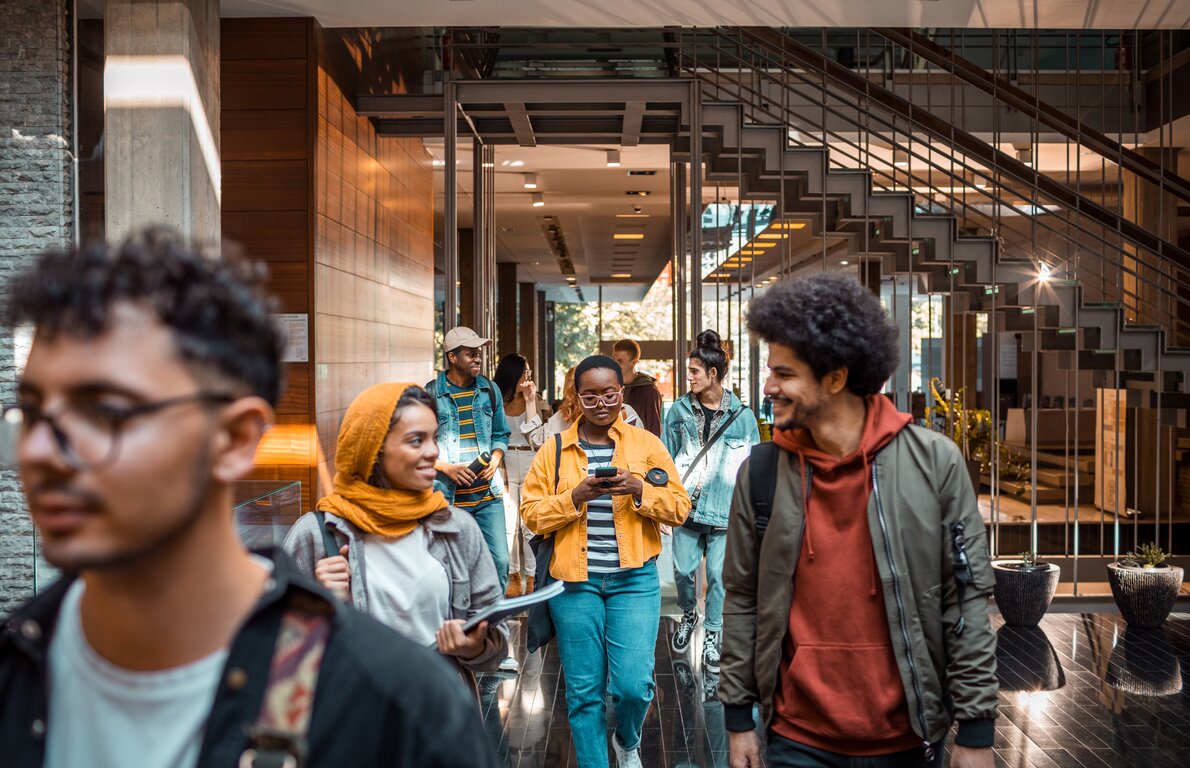
Finding the right fit.

Start planning early.
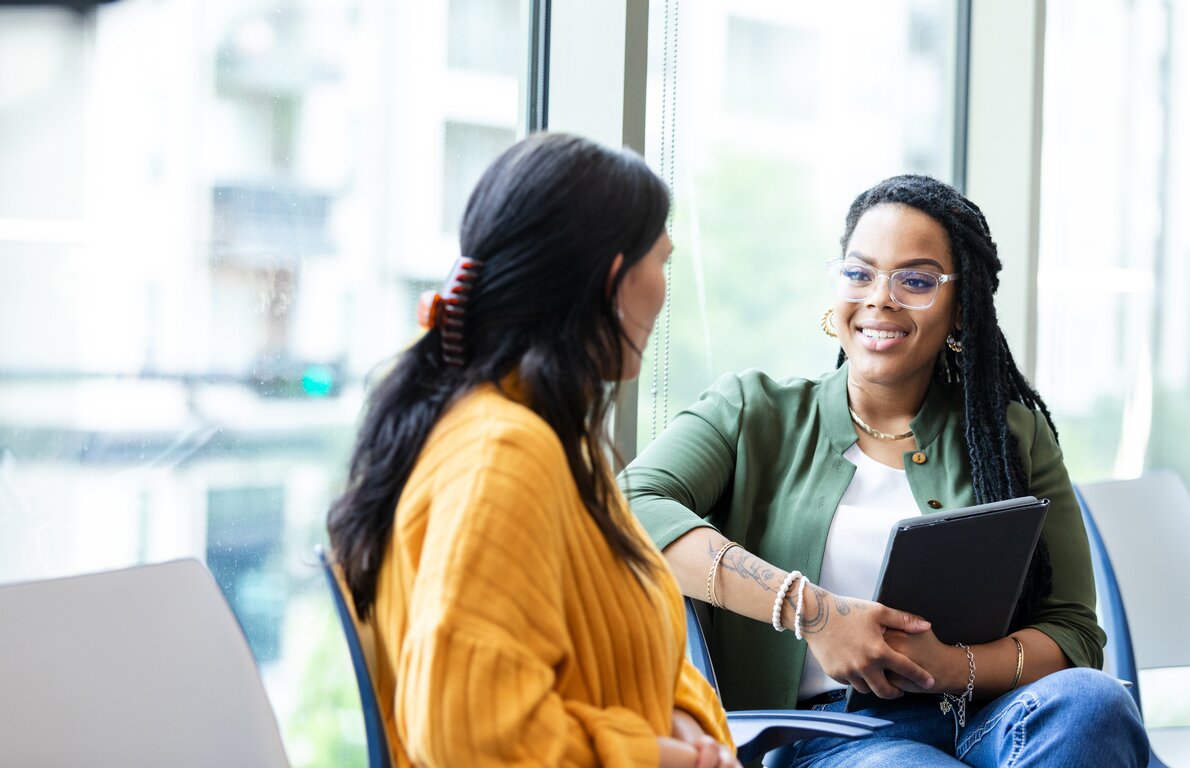
Ask questions.
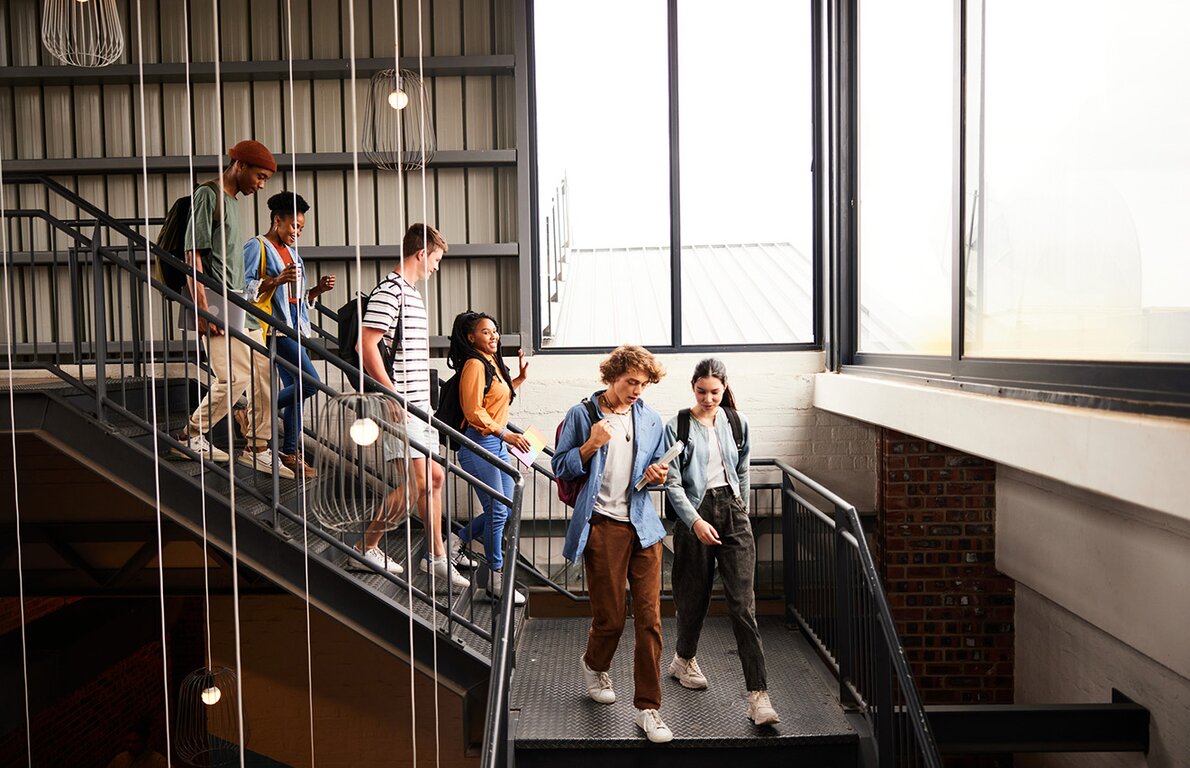
Get student perspectives.

Explore college through the lens of campus media.
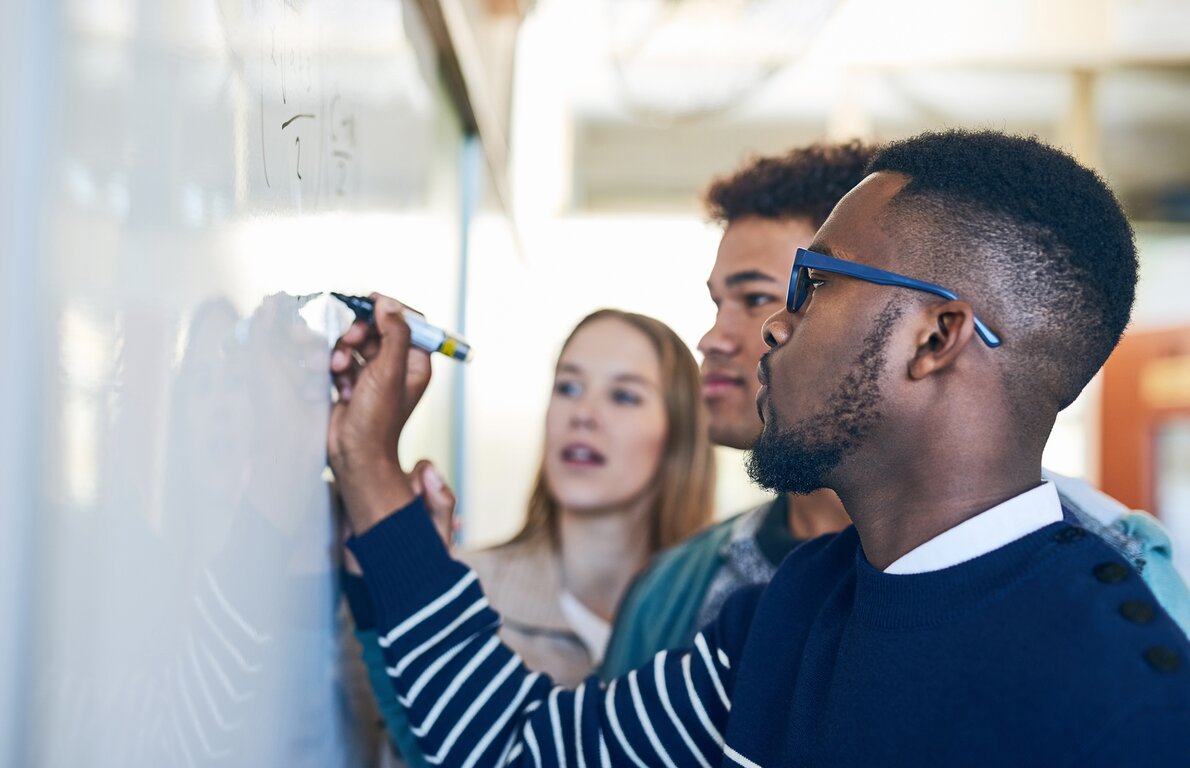
Visit academic departments.
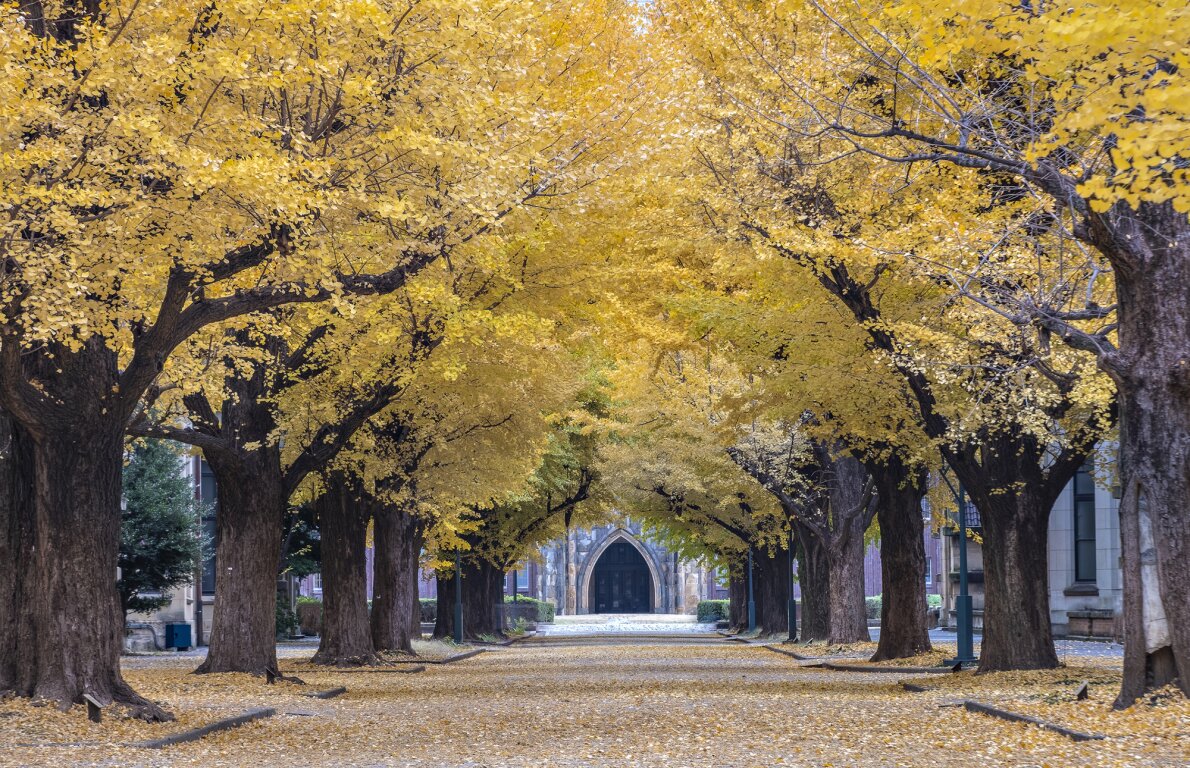
Check out other campuses nearby.
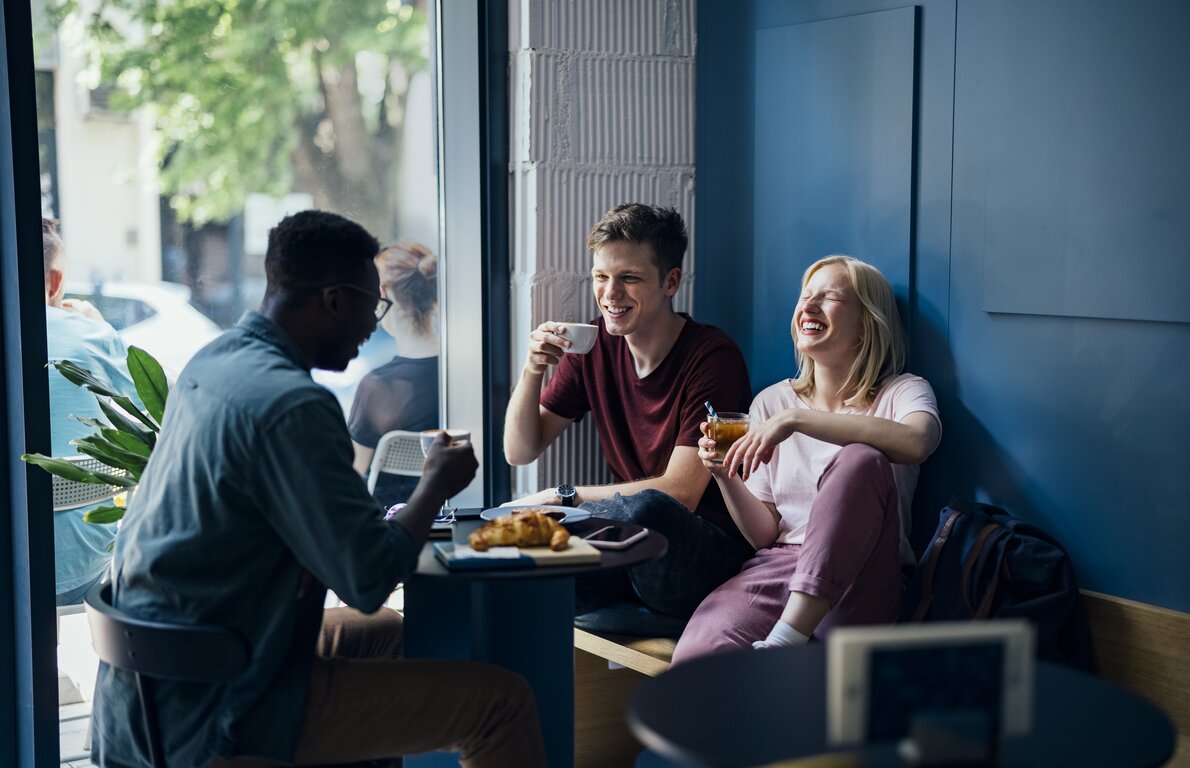
Learn about the local community.

Visit a dining hall or student center.

Explore the campus library.

Explore various virtual tour options.
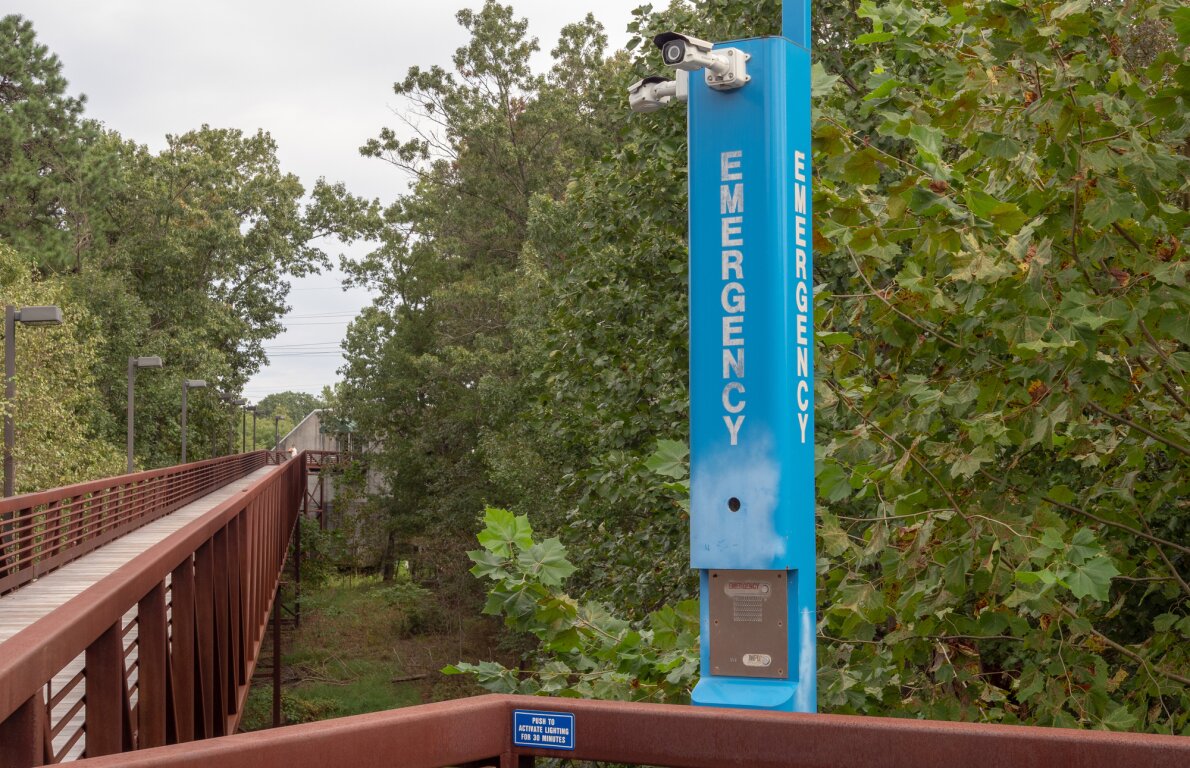
Ask about campus safety.

Get financial aid information.
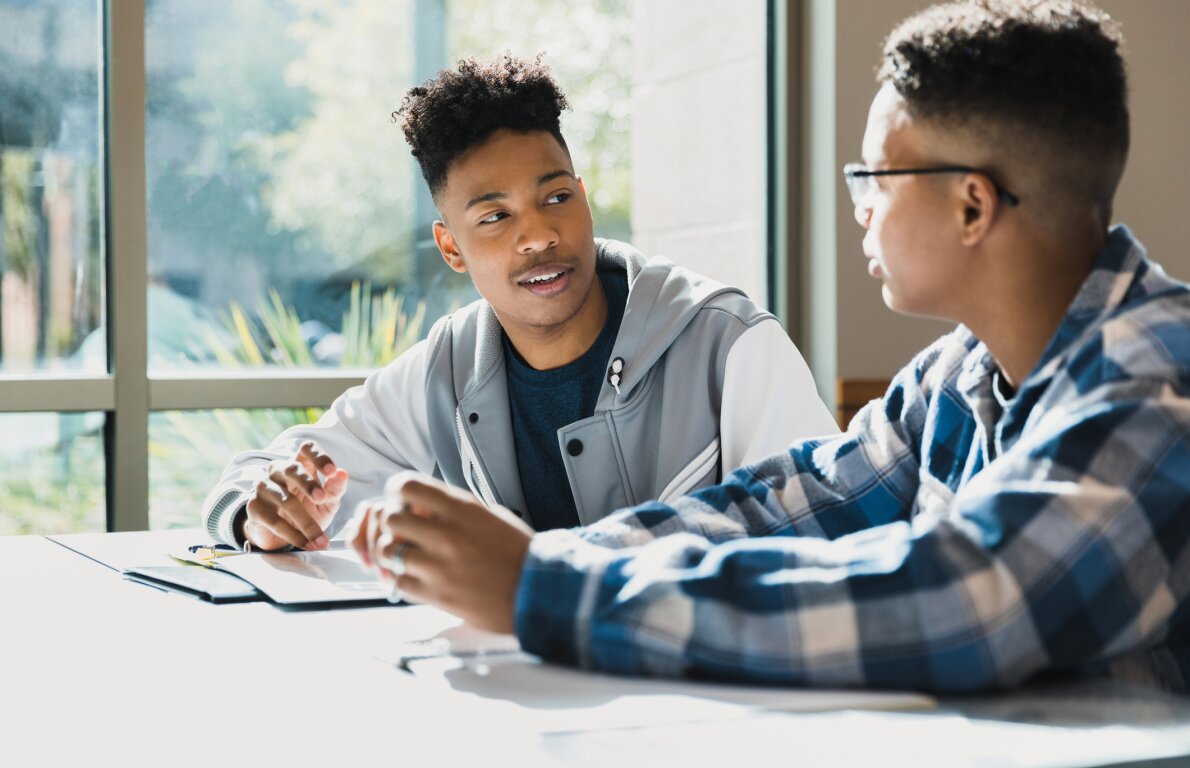
Ask about disability accommodations.
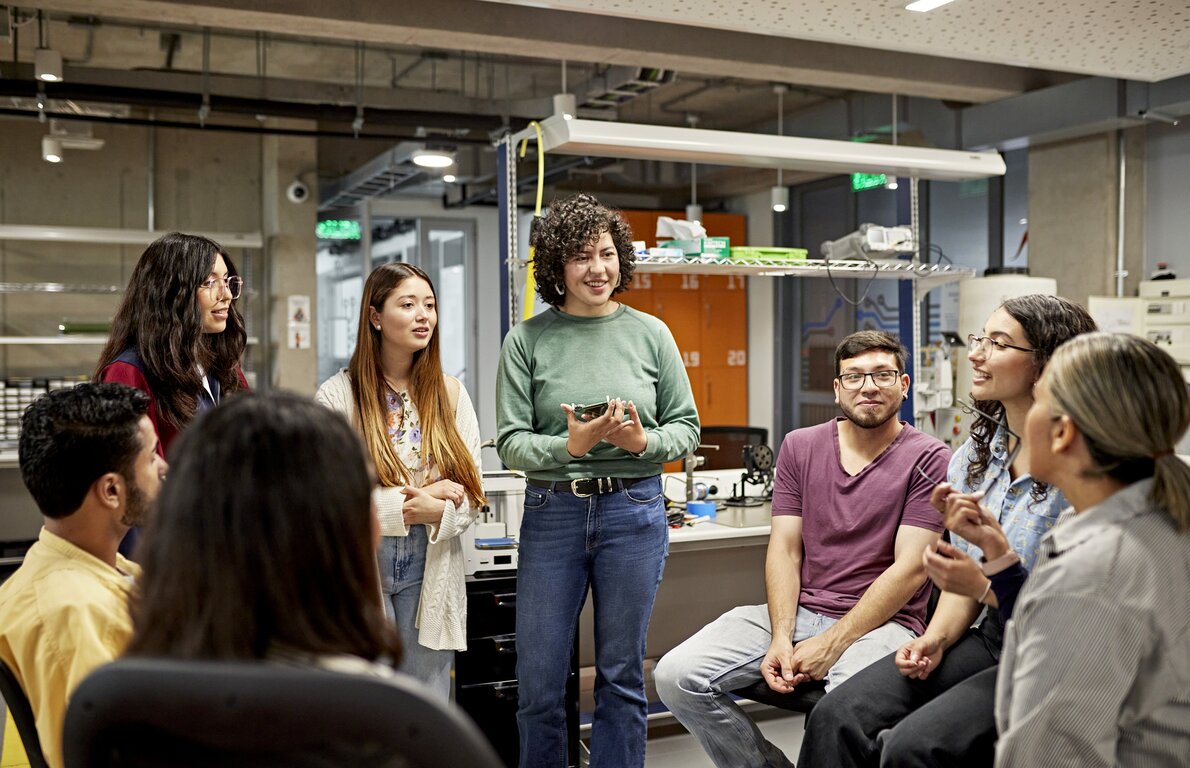
Meet with clubs and organizations.
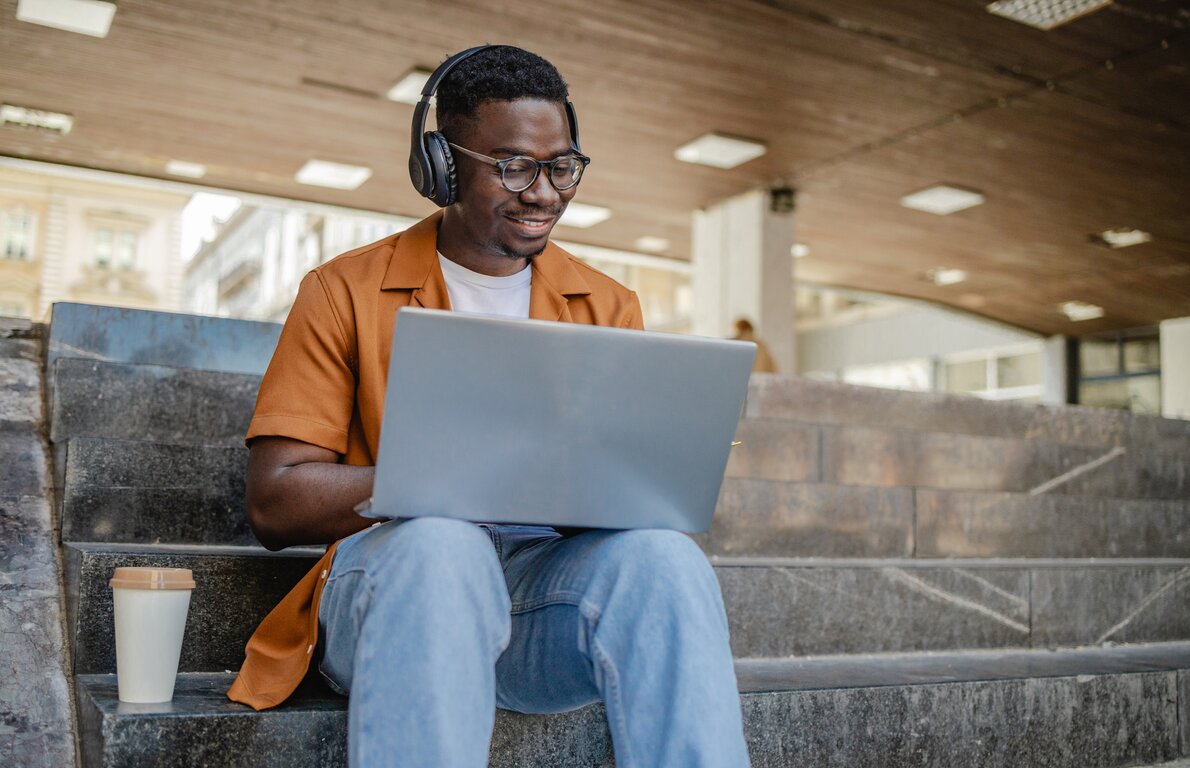
Learn more about colleges.
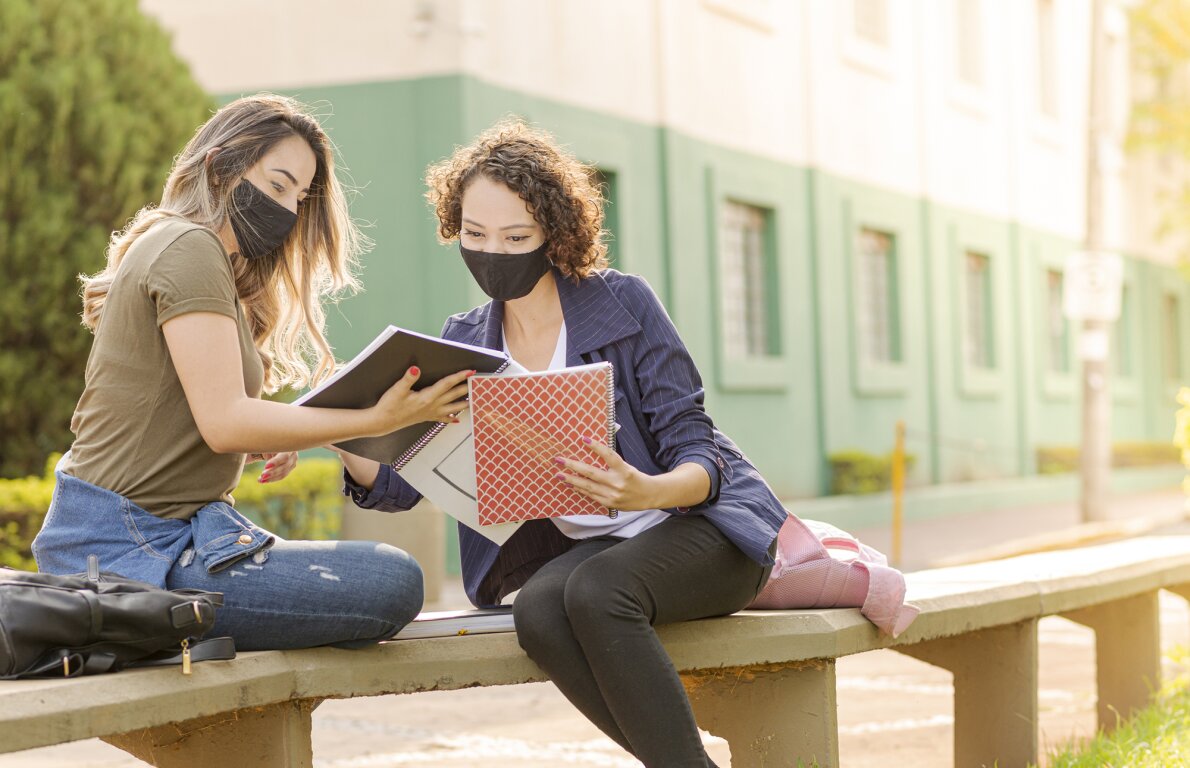
College visit tips
More for you.
Chris Pratt’s stunt double Tony McFarr dies aged 47
The public colleges that are most worth the money, based on data
18 Mouthwatering American Foods That Make Foreigners Drool
Hakeem Jeffries Calls Out Speaker Mike Johnson Over Missing Jan. 6 Plaque
Putin, Xi Issue One-Sentence Warning on Nuclear War
I quadrupled my salary to nearly $200,000 by age 30 because I advocated for myself and knew when to pivot. Here's how I did it.
'Top Gun' star Tom Cruise ready to fly again as co-star Jennifer Connelly says 'I'll be there'
‘I’m weary of repeating myself’: How do I deal with rich friends who take $22,000 cruises and book $800 hotel rooms? Prices are crazy enough already.
The best public college in America, based on data—and see the rest of the top 100
12 Strange Facts About Redheads You Never Knew
I live in a $250,000 houseboat in Toronto, Canada: Take a look inside
13 cereals we loved as kids and 13 we absolutely hated
17 movie and TV lines actors refused to say on screen: ‘I’m a self-respecting human being, I can’t do this’
37 high-paying jobs for people who don't like stress
'It's going to take time': Lauren Jackson defends 'future GOAT' Caitlin Clark
5 Classic Plymouth Muscle Cars That Are Totally Underappreciated
NATO makes strong statement on Ukraine
Bride’s sister springs to action when snake interrupts wedding party
Mom of Chiefs player under fire for telling women to be homemakers is a renowned physicist
20 healthy slow cooker recipes

Plan your Summer Visit to USC Viterbi!
Summer is upon us, and we know that many of you are starting to plan your vacations, which may include a visit to usc. we want to share how you can make the most of your visit to usc, of course, we’d love it if you stopped by our side of the campus for one of our visit viterbi experience sessions. check out the calendar below to see availability., summer visit calendar.
Click on available dates to see registration links and available seats in each session
Note: the calendar allows you to register for just a USC Viterbi Info Session. If you are interested in a campus tour to accompany this program, please refer to the campus tour portal page . If you sign up for a Viterbi Session through the campus tour portal page, you do not need to come back to this page to sign up again.
Can’t make it to an in-person event?
No worries, we have virtual sessions just for you: viterbiadmission.usc.edu/events/#virtual .
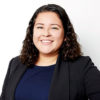
About Angie Solares
Angie was born and raised in southern California. She attended UCLA for her undergraduate education and is currently working on a Master's degree at USC (talk about a never-ending internal conflict). She is passionate about education and access for all. At Viterbi, Angie's focus is counseling transfer students on the admission process.
Recent Popular Posts
- Plan your Summer Visit to USC Viterbi! May 15, 2024
Next Post Admitted Student Events - Off Campus
Related posts, admitted student events – off campus.
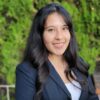
Admitted Students Next Steps
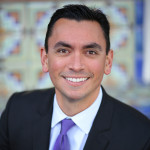
Not Admitted to USC? You still have options!
Comments are closed.
© 2024 USC Viterbi | Undergraduate Admission.
- EVENTS & VISITS
- About the School
- Innovation & Entrepreneurship
- Going Abroad
- Hands On Experiences
- Success After Undergraduate
- Engineering Challenges
- Engineering Plus
- How to Apply
- AP & IB Credit
- Blog Updates for First Year Applicants
- How to Transfer
- 3+2 Engineering Program
- 2nd Bachelor’s Degree
- Request More Information for Transfer Students
- Aerospace & Mechanical Engineering
- Astronautical Engineering
- Biomedical Engineering
- Chemical Engineering & Materials Science
- Civil & Environmental Engineering
- Computer Science
- Electrical & Computer Engineering
- Industrial & Systems Engineering
- Undeclared Engineering
- MEET THE STAFF
- MEET STUDENTS
- REQUEST INFO
- REQUEST INFO – TRANSFERS
- Skip to primary navigation
- Skip to main content
- Skip to primary sidebar
- Skip to footer
The Professor Is In
Guidance for all things PhD: Graduate School, Job Market and Careers

Ep 2.22: The Campus Visit
By Karen Kelsky | January 19, 2021

Campus visits are hard! Forewarned is forearmed, though, and Karen and Kel continue in the “job market advice” vein and talk about managing the campus visit, mostly focused on zoom challenges, but with insights for in-person visits as well. We cover the basic schedule, the challenges of meeting Deans, department heads and faculty, coping with Zoom settings and overwhelm, and end on the many bewilderments of the job talk. We disagree on several matters, including on how to best balance “they want to hear about you”/”they don’t want to hear too much about you.”
[ Become a subscribing membe r [ Become a subscribing membe r for just $3.99 a month and get access to our subscriber only goodies like free webinar recordings, AMAs, the chance to suggest topics, access to the podcast video from our house in Oregon, and — new from this week – live videos with Karen and Kel on Friday mornings, all on our dedicated podcast member page on Mighty Networks!]
Similar Posts:
Reader interactions.
April 20, 2021 at 7:52 am
Karen and Kel, you both seem to continually step on each other’s toes, and it’s distracting and kind of painful to listen to. You should get a third person to moderate and be host, and also maybe each have separate podcast episodes entirely!
Personally, I come to The Professor is In for Karen’s nuts and bolts advice. That said, I find that advice too doggedly focussed on the tenure-track job search. I’ve had close to ten job interviews at this point, and only one has been for a tenure-track job in my field.
April 20, 2021 at 10:22 am
Sounds like you better not listen, then.
February 23, 2022 at 11:21 am
Thanks so much for this. I just purchased the webinar series and am up for an interview for a tenure track job next month!
February 24, 2022 at 11:32 am
You can work with us individually you know! Our Interview Intervention and Campus Visit Interventions are truly life-changing, if I do say so myself.
Leave a Reply Cancel reply
Your email address will not be published. Required fields are marked *
This site uses Akismet to reduce spam. Learn how your comment data is processed .
- Who Is Dr. Karen?
- Who Is On the TPII Team?
- In The News
- Why Trust Me?
- Testimonials
- Peer Editing
- PhD Debt Survey
- Support Fund
- I Help With Custody Cases for Academics
Get on my schedule to work on your tenure track job cover letter, CV, grant applications, book proposals, interview preparation, and more.
Check for Openings
- Business Bridge
- Executive Education
- Faculty & Research
On-Campus Interviews & Visits
For Round 3 applicants: there are two in-person interview dates on April 1st and 8th and registration will be available in late March. Due to the interviewers' schedule, on-campus interviews are very limited so please register for a virtual interview if these dates are no longer available. We are unable to accommodate to individual requests to interview in-person. Use the calendar below to find available interview dates for in-person interviews at Tuck.
On-campus interview scheduling reminders:
- You may not register for multiple interview slots
- We do not maintain a waitlist for interview slots
- If the date you were looking to interview on-campus is full, please sign up for a virtual interview.
- We are unable to accommodate individual requests to schedule an in-person interview other than the options we have available on this site.
Please note that when you register for an on-campus interview, you will be automatically registered for a program of events on the same day which includes (but not limited to) a lunch chat with students, a campus tour, and a Q&A with a member of Tuck Admissions. Upon registering for an on-campus interview, you will receive an email with full details of your visit day schedule. Please use this schedule to coordinate your travel to Tuck. We understand that not every candidate will be able to secure an interview at Tuck and we value all interviews equally in our evaluation process, whether in-person or virtual. You should decide which option is best for you based on your individual circumstances. If you were unable to register for an on-campus interview but still interested in visiting Tuck, please register for a virtual interview, and consider joining a Tuck Visit Day, which includes a program of events such as a lunch chat with current students, a campus tour, and a Q&A with a member of Tuck Admissions. You can find more information about this on the Tuck Admissions Events site .
100 Tuck Hall Hanover, NH 03755 USA
- Visit / Interview
- Attend An Event
- Search UNH.edu
- Search Undergraduate Admissions
Commonly Searched Items:
- Academic Calendar
- First-Year Students
- Transfer Students
- International Students
- Veterans & Non-Traditional Students
- Verto Wildcats Abroad Program
- Readmission and Reinstatement Information
- Check Application Status
- Admissions Forms and Resources
- Senior Checklist
- Test-Optional Policy
- Parent Checklist
- Net Price Calculator
- Financial Aid Resources
- Scholarship Information
- New England Regional Student Program (NERSP)
- The Wildcat Take - Admissions Blog
- Voices of Wildcats - Student Stories
- Wildcat Success
- Guided In-Person Tours
- Virtual Campus Tours
- Academic Sessions
- Shadow a Wildcat Day
- Transfer Student Visit Opportunities
- Prospective Student Visit Day
- Fall Open House
- Wildcats Across the Years (Virtual)
- Group Visits
- School Counselor Programs
- Meet Our Ambassadors
- Self-Guided Walking Tour
- UNH Comes to You
- Navigating Financial Aid
- COVID-19 FAQ
- Readmitted Students
- Admitted Student Visit Options
- UNH Near You
- Admitted Student Forms
- Changing Majors and Competitive Majors
- Find Your Admissions Counselor
- Request Information
- Application Decisions & Communication Policy
How to Visit Campus
Are you ready to plan your UNH campus visit and tour our campus? Prospective students have told us they love visiting UNH over the summer. You can grab an ice cream at the Campus Creamery, enjoy the beautiful weather and — the best part — see everything UNH has to offer with your own eyes .
What is a campus visit? Is a campus visit worth it? A college tour is the best way to see campus buildings and areas of student life with your own eyes and decide on the best college for you. Read on to learn how to plan your UNH visit and what it will include!
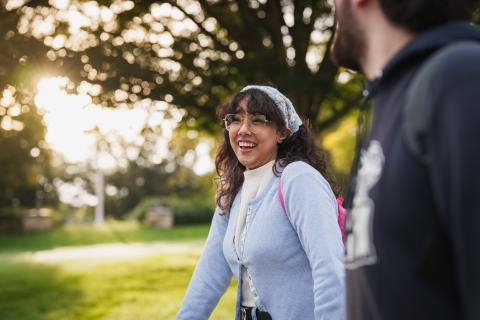
Why should I visit UNH?
Visiting UNH will enable you to see the campus for yourself , including residence halls, dining halls, classroom buildings, student life facilities and so much more. You’ll also be able to ask specific questions you may have about UNH and hear the perspective of a current student (your tour guide).
How can I sign up for a tour and information session?
Visit here to sign up for a tour and information session! You’ll be able to choose the date and time that work for you.
Who will lead my tour?
Your tour of UNH will be led by a current UNH student tour guide . These students love UNH and can’t wait to share with you everything about campus , talk about their UNH experience and answer all your questions !
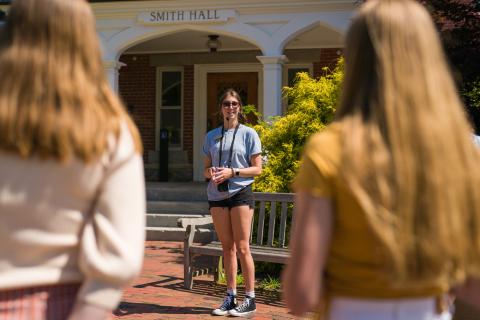
How long is a UNH campus tour?
Your tour (including a brief information session at the beginning) will last about 1 hour and 30 minutes total. At the end of this time, you will have the opportunity to ask your tour guide more questions and meet with admissions counselors in Smith Hall, our admissions building.
What will my campus tour be like?
You'll be walking a lot, so wear comfy shoes and dress for the weather! Your tour guide will stop at various indoor and outdoor locations around campus to talk about that location and answer any questions.
Tour stops may include:
- A residence hall and room
- The MUB (student union)
- The Hamel Recreation Center
- Dining areas
- Dimond Library
- An academic building & classrooms
What will my information session be like?
All tours start with a brief information session with UNH undergraduate admissions . This is your chance to learn some background information about our campus and location . It is also an opportunity to ask any questions you may have before starting the tour.
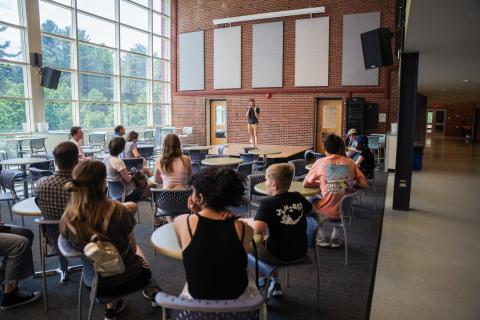
What should I ask on my tour?
Your campus tour is your chance to explore campus fully and learn more about the experience of a real student (your tour guide). Every question is a good question! Here are a few ideas if you're not sure what to ask your tour guide:
- "Why did you choose UNH?"
- "What's your favorite thing about UNH?"
- "How did UNH prepare you for deciding what you want to do after graduation?"
- "How have you found friends and community on campus?"
- "If we have time after the tour, what else do you recommend we check out at UNH and in Durham?"
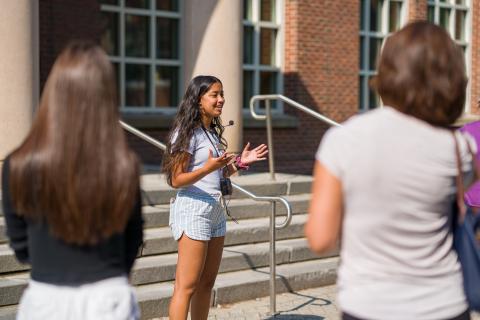
What if I can’t visit in person?
If you can’t visit UNH in person, visit this page to learn about other visit options and check out our virtual tour for a 360-degree experience!
You are going places. This summer, make UNH one of them!
- Sign up for a tour today
- Explore other visit options
- Navigate our campus virtual tour
related posts:
What you might not see on your campus tour.
Though our tours give an overview of the most important parts of campus, they don’t have time to cover everything. Let’s talk about some unique campus features and locations that are off the beaten path !
learn about our campus
- Wildcat Take
- Campus Tour
- Undergraduate Admissions
- Transfer Advisors by Major
- Transfer Credits

- Sustainability
- Embrace New Hampshire
- University News
- The Future of UNH
- Campus Locations
- Calendars & Events
- Directories
- Facts & Figures
- Academic Advising
- Colleges & Schools
- Degrees & Programs
- Undeclared Students
- Course Search
- Study Abroad
- Career Services
- How to Apply
- Visit Campus
- Costs & Financial Aid
- Graduate Admissions
- UNH Franklin Pierce School of Law
- Housing & Residential Life
- Clubs & Organizations
- New Student Programs
- Student Support
- Fitness & Recreation
- Student Union
- Health & Wellness
- Student Life Leadership
- Sport Clubs
- UNH Wildcats
- Intramural Sports
- Campus Recreation
- Centers & Institutes
- Undergraduate Research
- Research Office
- Graduate Research
- FindScholars@UNH
- Business Partnerships with UNH
- Professional Development & Continuing Education
- Research and Technology at UNH
- Current Students
- Faculty & Staff
- Alumni & Friends

International Students & Scholars
Apply for/renew your visa.
After receipt of your immigration documentation from UMD, and payment of the required SEVIS fee (F1/J1 only) , you can apply for your visa. An in-person interview is usually required. You should schedule your appointment as soon as possible. Some U.S. Embassies may have wait times for visa interviews and delays in visa processing.
To make your appointment and check wait times, visit the U.S. Visas - Department of State .
Note: You may not receive a U.S. visa more than 120 days before the reporting date on your I-20/DS-2019.
Attend the visa appointment and bring the application required documents listed below with you.
General Visa Application Required Documents
- U.S. Government Application form DS-160
- Payment of the U.S. Government Visa Application Fee
- U.S. passport-style photos for each visa applicant
- Passport(s) valid for at least 6 months into the future for each visa applicant
Additional Requirements by Visa Category
- Dependent Visas
- Signed original I-20 or DS-2019 Form
- SEVIS Fee Receipt
- Proof of ties to your home country: F and J visas are non-immigrant visas. As such, you will need to show that you plan to return after your studies. You can do this by showing strong ties to your home country with evidence such as proof of property ownership, a job offer letter, or letters from family.
- Proof of financial support : You will need to present the financial documents you submitted for your I-20/DS-2019 checklist.
- Newly Admitted Student (F-1/J-1) – Admission Letter
- Any standardized test scores you submitted to UMD
- Current Student (F-1/J-1) – Official Transcript and the Confirmation of visa status letter from iTerp
- Professors, research scholars, short-term scholars and interns (J-1) - Invitation letter from your sponsoring department
- OPT/STEM OPT (F-1) – Current OPT EAD Card and offer letter or proof of employment. If your STEM OPT application is still pending, ISSS does not recommend traveling abroad.
- Post-Completion Academic Training (J-1) – Offer letter or proof of employment
Note: Citizens of Canada and Bermuda do not require visas to enter the United States as students. However, you must pay the SEVIS fee and present a valid Form I-20 at the time of admission. For more information see U.S. Department of State information for Citizens of Canada and Bermuda
Original bottom portion and a copy of the original I-797 H-1B Approval Notice and travel packet. Appointment letter or job offer letter on university letterhead stating:
- Your position title and salary
- Academic Department
- Dates of Employment
- Brief job description
Note: individuals in H-1B status are viewed as having a dual intent when entering the U.S. Dual intent means that the H-1B holder may intend either to return home at the end of the H-1B program or to apply for immigrant status.
- Original certified and signed Labor Condition Application
- Proof of payment of the visa fee.
Important: A person in initial E-3 status can enter the U.S. up to 10 days before the E-3 start date
Mexican Citizens do need to apply for a visa using their original and signed TN letter provided by the department, or they may present the original bottom portion and a copy of the original I-797 TN Approval Notice.
Canadian Citizens do not need to apply for a visa. You can enter the U.S. using your original and signed TN letter provided by the department.
Important: A person in initial TN status can enter the U.S. up to 10 days before the TN start date.
Immediate family members (spouse and unmarried children under the age of 21) who will come with you to the U.S. may apply for dependent visas. You need to bring documents that prove your relationship. These can include a marriage certificate, birth certificate, or official family registry.
If your dependents go to the visa interview alone, they will need to bring copies of all the documents listed above for your visa category.
If all goes according to plan, you will receive a visa stamp in your passport. Congratulations! Check your visa for errors before you leave the U.S. Embassy or Consulate.
You may not enter the U.S. on your F-1 or J-1 visa more than 30 days prior to the report date on your I-20/DS-2019. Keep in mind the visa itself does not guarantee admission into the U.S.; all other documents must be in order as well .
Individuals entering the U.S. in H-1B/O-1/E-3/TN status may enter the U.S. no more than 10 days before their start date.
Please contact ISSS if you received a late visa appointment and will not be able to enter the U.S. by the report date on your I-20/DS-2019, or if your visa application has been denied.
Note: For J-1 visa holders, the U.S. Embassies may put your DS-2019 in a sealed envelope and staple it to your passport. We recommended that you do not open this envelope. The Immigration officer at the U.S. port-of-entry will open it and check your documents when you arrive.
If you have difficulty scheduling your visa appointment due to an unforeseen situation, such as a funeral or medical emergency, you may request an Expedited Visa Interview . Check the instructions posted on your U.S. Embassy website to schedule visa interviews. You will have to provide proof of your need for an early appointment.
Your I-20/DS2019 start date provides the necessary information you need to demonstrate your start date at UMD. Feel free to use our visa expedition letter if you feel it will assist your immigration case.
- Administrative Processing The U.S. Embassy may inform you your visa requires Administrative Processing. This means the consular officer needs more information before deciding to issue you a visa. Administrative processing can result in significant delays in visa issuance. Contact us and your UMD department if you will be unable to arrive for the start of your program.
- Visa Denial Contact us if your visa application has been denied
You only need the visa stamp in your passport to enter into the United States. Once you are in the U.S. the visa stamp may expire as long as you have:
- A passport that is valid for at least six months into the future
- An unexpired I-20 (for F-1s) or DS-2019 (for J-1s)
- An I-94 that indicates D/S (F-1 and J-1 only) or a date into the future
- A valid I-797 Approval Notice or valid I-94 for H-1B, O-1, E-3 or TN
If you leave the country, you will need to apply for a new visa before returning to the United States.

Arrival to U.S. - U.S. Customs and I-94
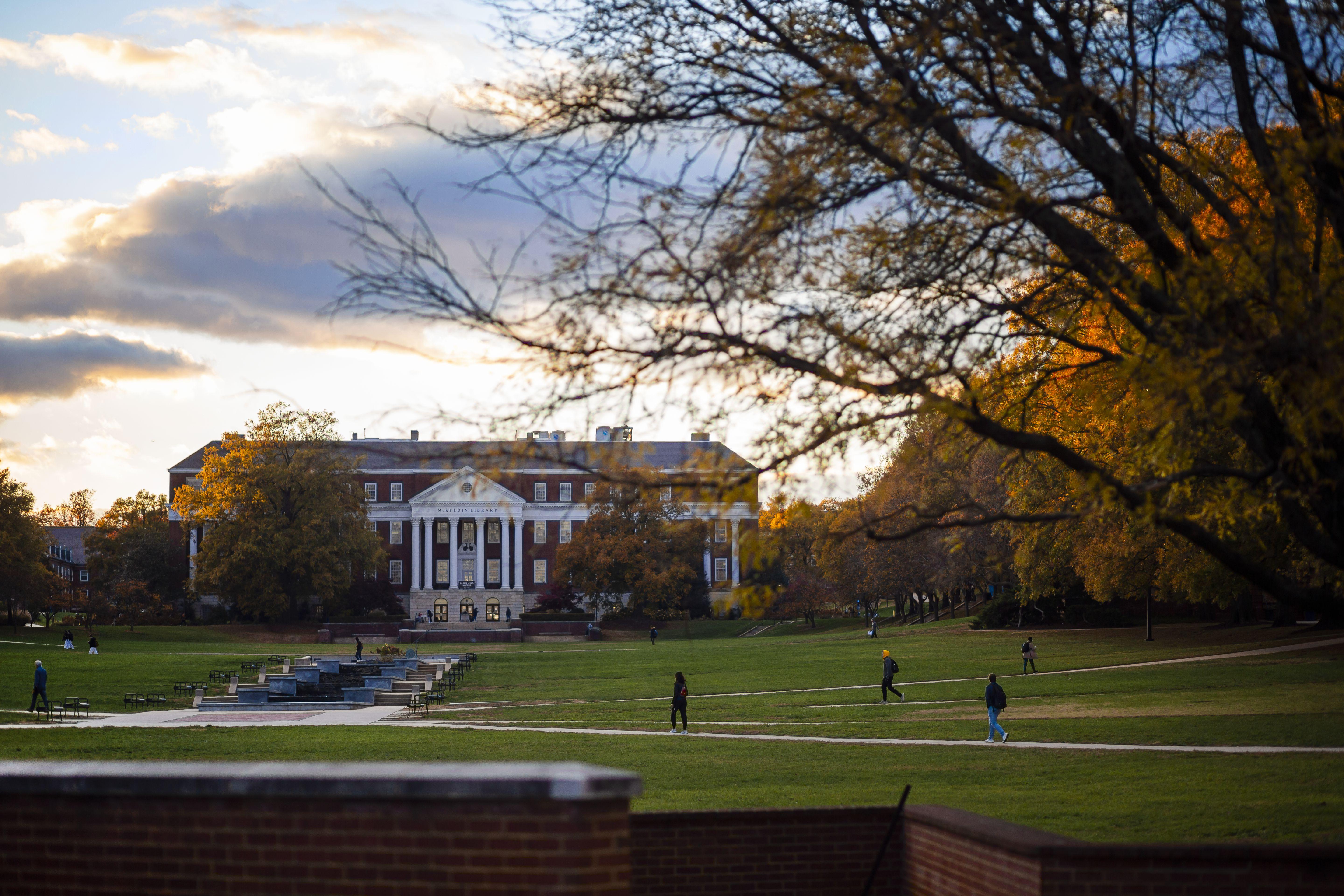
Arriving on Campus
This website uses cookies to measure traffic and improve your experience. View our Privacy Policy to learn more.

- Colleges & Degrees
- Academic Calendar
- International Education
- Graduate Studies
- Accreditation
- Tuition and Fees
- Parking & Maps
- Careers with CSULB
- Alumni Home
- Alumni Volunteering
- Alumni Giving
Campus Life
- Centers & Organizations
- Commencement
- Student Life
- Office of the President
- Office of the Provost
- Administration & Finance
- Student Affairs
- University Relations & Development
- Information Technology
- Beach Shops
- Campus Directory
- Enrollment Services
- Financial Aid
- Schedule of Classes
- Student Records
- 49er Foundation
- Research Foundation

1250 BELLFLOWER BOULEVARD LONG BEACH, CALIFORNIA 90840 562.985.4111

Off-Campus Community - In-Person: City of Long Beach Career Fair
COME AND JOIN OUR DIVERSE WORKFORCE AND BE PART OF THE GREAT THINGS OUR CITY ALREADY HAS IN MOTION AND USE YOUR TALENTS TO HELP CREATE A PROMISING FUTURE!
Thursday, May 23, 2024
1:00 pm – 4:00 pm
Long Beach City College – Liberal Arts Campus, Room T 1200
4901 E Carson St, Long Beach, CA 90808
FREE parking at Veterans Stadium
The City of Long Beach is a diverse community of almost half a million residents who add to the vibrancy of this beautiful city by the sea. Each city department plays a vital role in the daily operations of this magnificent city to continue supporting its economic growth, public health, accessibility, equity and inclusion, sustainability, public safety, overall, to keep our community thriving!
The City of Long Beach Civil Service in partnership with Long Beach City College Workforce Development are hosting theirsemi-annual job fair.
Sixteen City departments will be in attendance to showcase their current career opportunities. Attendees will have the opportunity to meet with their team members to ask questions and learn about their experience working for the city. Get a head start and check our jobs page www.longbeach.gov/jobs .
Civil Service will also facilitate a workshop on navigating the City’s hiring process from 1:30 pm – 2:30 pm. Come early to secure a spot!
REGISTER FOR THE JOB FAIR TODAY! https://bit.ly/lbcc-long-beach-career-fair-spring-2024
FOR MORE INFORMATION CONTACT
Laura Baeza • (562) 570 - 6119 • [email protected] OR Civil Service Main Line (562) 570 - 6203.
Go to www.longbeach.gov/civilservice to get a copy of the event flyer.

Facility for Rare Isotope Beams
At michigan state university, frib advanced studies gateway season concludes with nobel laureate talk.
Attendees from around the United States took part in the final event of the season for FRIB’s Advanced Studies Gateway (ASG) initiative on Sunday, 5 May, as Nobel Prize-winning physicist William Phillips gave a talk on the quantum reform of the modern metric system. The event drew several well-known scientists, former U.S. Department of Energy National Laboratory directors, and federal program managers, among others.
Phillips’s talk concluded the 2023-24 schedule of public events hosted by FRIB. The season included live music concerts, Zoom talks, and in-person guest lecturers. The talk is available online here .
Over 800 people attended the 16 ASG events during the academic year, which included nine concerts and seven talks. Musicians such as violinist Dmitri Berlinksy and pianist Young Hyun Cho performed at FRIB in a collaboration with the MSU College of Music . Speakers from Purdue University, the Massachusetts Institute of Technology, Harvard University, Duke University, and the University of Michigan, and other institutions delivered lectures on a variety of topics.
ASG began in 2018 and brings together researchers, innovators, creative thinkers, artists, and performers from all fields. It strengthens ties between Michigan State University (MSU) and the community. Activities include research workshops, public talks, concerts, and special events that are free and open to the public. Dean Lee, professor of physics at FRIB and in MSU’s Department of Physics and Astronomy and head of the Theoretical Nuclear Science department at FRIB, is the host of ASG. Ten members of the National Academy of Science have given lectures as a part of the program.
“The ASG events at FRIB have exceptional impact, attracting a broader public audience by showcasing researchers, innovators, artists, and performers from a variety of fields,” said FRIB Laboratory Director Thomas Glasmacher. “The success of the ASG program speaks to the interest that people across the nation have in programming that intersects science, technology, and the arts.”
FRIB also hosted two talks as part of the Distinguished Nuclear Policy Lecture Series . The series is a partnership between MSU’s James Madison College and FRIB. It brings global policy experts to campus for talks about the political and scientific communities. In 2023-24, FRIB welcomed Eugene Rumer, senior fellow and the director of the Carnegie Endowment for International Peace Russia and Eurasia Program, and George Perkovich, the Ken Olivier and Angela Nomellini Chair and vice president for studies at Carnegie.
For information about public events at FRIB, visit frib.msu.edu/public .
Michigan State University operates FRIB as a user facility for the DOE Office of Science (DOE-SC), supporting the mission of the DOE-SC Office of Nuclear Physics. Hosting what is designed to be the most powerful heavy-ion accelerator, FRIB enables scientists to make discoveries about the properties of rare isotopes (that is, short-lived nuclei not normally found on Earth), nuclear astrophysics, fundamental interactions, and applications for society, including in medicine, homeland security, and industry.
- GradPost Blog
How to hold informational interviews workshop
Career & Tools
This workshop, held May 24th at 1 pm, will unpack informational interviews and what they entail, walk through best practices and serve as a safe space to openly discuss feelings about anxiety or imposter syndrome that can impact your confidence.


COMMENTS
Visits & Campus Tours ... Visit us virtually or in-person and see if Lehigh's beautiful campus and thriving community is the place for you to call home—for the next four years and beyond. ... On-campus interviews may take place with an admissions counselor or a current student who is part of our Admissions Fellows program.
If you have any questions, please call the Office of Undergraduate Admission at (203) 254-4100 or send us an e-mail at [email protected]. Come explore our beautiful campus and experience our close-knit community first-hand. We would love the opportunity to meet you in person and truly believe that visiting campus is the best way to get a ...
A campus visit will involve many things that go well beyond the scope of those quickie, first-round interviews conducted long distance via technology or in person at a scholarly conference. In a campus visit, you won't have to deal with the technical problems of a Skype interview or face a screen full committee members who have positioned ...
A lack of preparation will communicate a lack of readiness and seriousness to the interviewers. Campus Interviews. If a first-round interview is successful, candidates will progress to the final stage, the campus visit. This is essentially a day-long job demonstration. Much of the same considerations from the first two stages of the process apply.
Admission. The people of Boston College are at the heart of the experience here, and students guide our campus visits. The core of our Eagle Eye Campus Visit is a candid conversation with current students—an opportunity to ask them about classes, housing, Boston, service learning, and more. And our virtual visit programs allow you to engage ...
Tip: You should treat all interactions that occur during the visit as an interview. This includes travel to and from the airport and all meals. This does not mean you cannot have a personality; you just need to acknowledge the entire visit can factor into the job offer decision. The schedule for the campus visit is usually set before you arrive ...
Before a campus visit, students should do basic research on the school. ... College visits, whether in person or virtual, can help give prospective students a better feel of campus life.
2. During the interview. For campus visits, dress appropriately (usually business casual, but be comfortable); be on time; organize your papers (e.g., résumés/CVs, slides or images, questions). Even for phone/Skype interviews, dressing professionally will help you to mentally prepare for the interview.
Things can feel very much out of your control. What is in your control: Doing your best during the interviews you do have, knowing how to talk about your own background in the context of a ...
Campus visits (aka: job interviews) typically involve mission-critical meetings with deans, department chairs, search committees, graduate students, lunch and dinner meetings, and conversations with a variety of other faculty and constituents across campus, in addition to the "crown jewel" of the campus visit: the job talk. Each of these ...
In-person campus tours for prospective students and their guests will be conducted mostly outdoors, with entrance into a select number of campus buildings. ... Interviews. Interviews are available for First-Year Students applying for Fall 2023. Interviews are only available for rising and current seniors and students may only interview once.
Long Live the Virtual Campus Visit. Six reasons why an online format is better for faculty job finalists than the traditional in-person campus interview. By Kaitlyn Sorenson. January 20, 2023 ...
The Gettysburg College Admissions Office offers in-person tours of campus. Opportunities for on-campus interviews for h igh school students and transfer students are also available. If you aren't able to travel to campus, we have a variety of virtual visit opportunities including online interviews, information sessions, and much more.
Interviews will be offered virtually and in person during the fall. Interviews are not required; they are OPTIONAL and will be offered Monday through Friday, on a first come, first served basis. ... A typical campus visit will include an Information Session, led by an Admissions Counselor, and a private campus tour. ...
Welcome to the course 'Interviewing for Academic Jobs: The Campus Visit'. Click Start to begin. Before we begin, let's take a tour of the navigational features of this course.
This Winter and Spring we are offering in-person tours and information sessions Monday-Fridays with the addition of some select Saturday dates. Sessions titled "Information Sessions and Campus Tour" will include a 20-30 minute presentation followed by a 90 minute campus tour where you'll get to explore campus with a current Bentley student ...
What to expect in an interview for a faculty position. You may be asked to give a job talk about your prior research, a chalk talk about your future research, or a demonstration of your teaching. You will typically talk to many faculty one-on-one about their research, and you may be asked to meet with graduate students.
Pre-registration is required for in-person campus visits. We look forward to welcoming you to Waterville — please don't hesitate to contact us at [email protected] with questions. During the summer, campus tours are offered as follows: May 24 through all of June: 10am and 2pm tours. July: 9am, 11am, and 2pm tours.
The APA Best Practices for Interviewing and the APA Good Practices Guide, Chapter 5 on Interviewing and Hiring serve as invaluable resources for candidates and hiring departments. Nevertheless, the pandemic has thrown us all into a bit of a conundrum for how best to conduct interviews—especially the important second-round or "on-campus" interview—in spite of rather…
Get financial aid information. Ask about disability accommodations. Meet with clubs and organizations. Visiting a college can help a student determine if he or she wants to spend the next four ...
By Angie Solares May 15, 2024 No Comments. Summer is upon us, and we know that many of you are starting to plan your vacations, which may include a visit to USC. We want to share how you can make the most of your visit to USC! Of course, we'd love it if you stopped by our side of the campus for one of our Visit Viterbi Experience sessions.
Interviews & Campus Visits. You may find that the admissions committee for your prospective program, especially medical schools, wants to meet with you in person to discuss your goals and your fit with their program. Don't panic; you can review the Center for Career Development & Academic Exploration's interviewing resources and schedule a ...
Ep 2.22: The Campus Visit. Campus visits are hard! Forewarned is forearmed, though, and Karen and Kel continue in the "job market advice" vein and talk about managing the campus visit, mostly focused on zoom challenges, but with insights for in-person visits as well. We cover the basic schedule, the challenges of meeting Deans, department ...
On-Campus Interviews & Visits. For Round 3 applicants: there are two in-person interview dates on April 1st and 8th and registration will be available in late March. Due to the interviewers' schedule, on-campus interviews are very limited so please register for a virtual interview if these dates are no longer available. We are unable to ...
The person you present during your visit to our campus is the person the committee will assume you to be. ... The campus interview helps us decide if you will contribute to that well-being or ...
Explore other visit options; Navigate our campus virtual tour ; related posts: What You Might Not See on Your Campus Tour. Though our tours give an overview of the most important parts of campus, they don't have time to cover everything. Let's talk about some unique campus features and locations that are off the beaten path! learn about our ...
The process and documents required to apply for your U.S. visa., After receipt of your immigration documentation from UMD, and payment of the required SEVIS fee (F1/J1 only), you can apply for your visa. An in-person interview is usually required. You should schedule your appointment as soon as possible. Some U.S. Embassies may have wait times for visa interviews and delays in visa processing ...
COME AND JOIN OUR DIVERSE WORKFORCE AND BE PART OF THE GREAT THINGS OUR CITY ALREADY HAS IN MOTION AND USE YOUR TALENTS TO HELP CREATE A PROMISING FUTURE!Thursday, May 23, 20241:00 pm - 4:00 pmLong Beach City College - Liberal Arts Campus, Room T 12004901 E Carson St, Long Beach, CA 90808FREE parking at Veterans Stadium
Attendees from around the United States took part in the final event of the season for FRIB's Advanced Studies Gateway (ASG) initiative on Sunday, 5 May, as Nobel Prize-winning physicist William Phillips gave a talk on the quantum reform of the modern metric system. The event drew several well-known scientists, former U.S. Department of Energy National Laboratory directors, and federal ...
This workshop, held May 24th at 1 pm, will unpack informational interviews and what they entail, walk through best practices and serve as a safe space to openly discuss feelings about anxiety or imposter syndrome that can impact your confidence. By Lee Fowler, GSRC Student Assistant. Wednesday, May 15th, 2024 - 1:18pm.